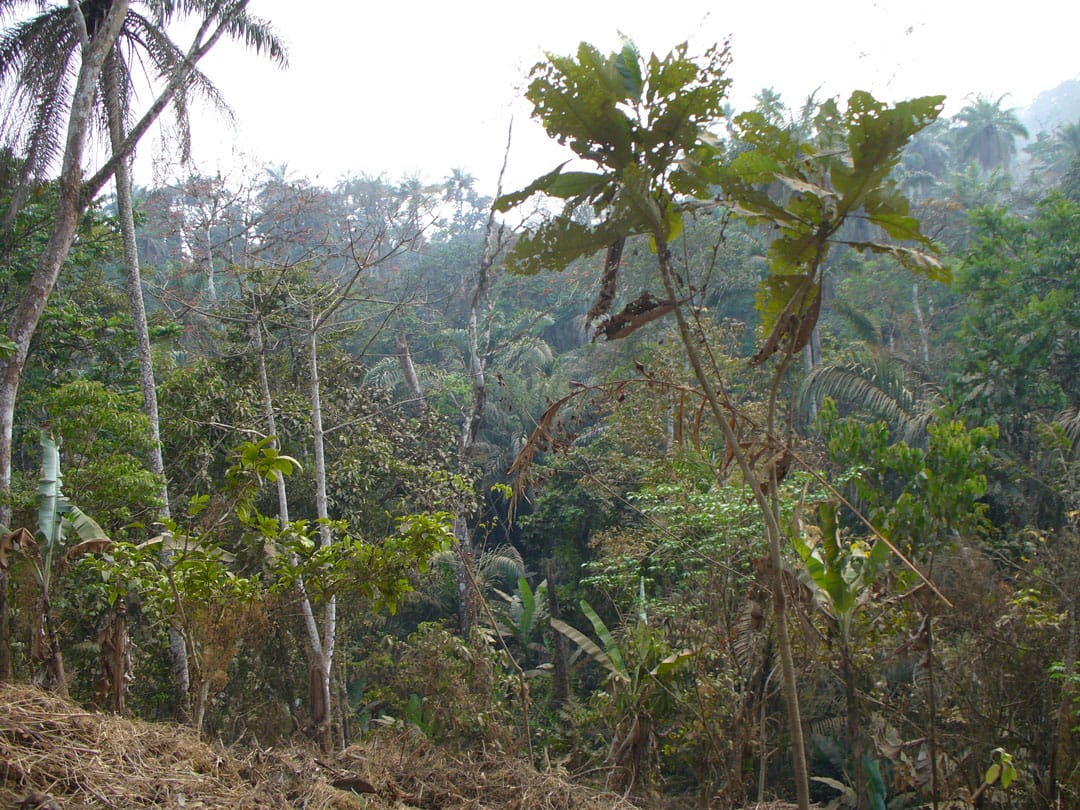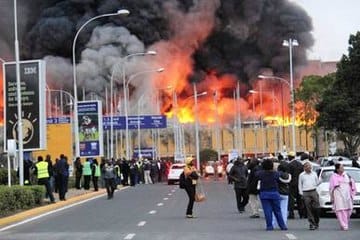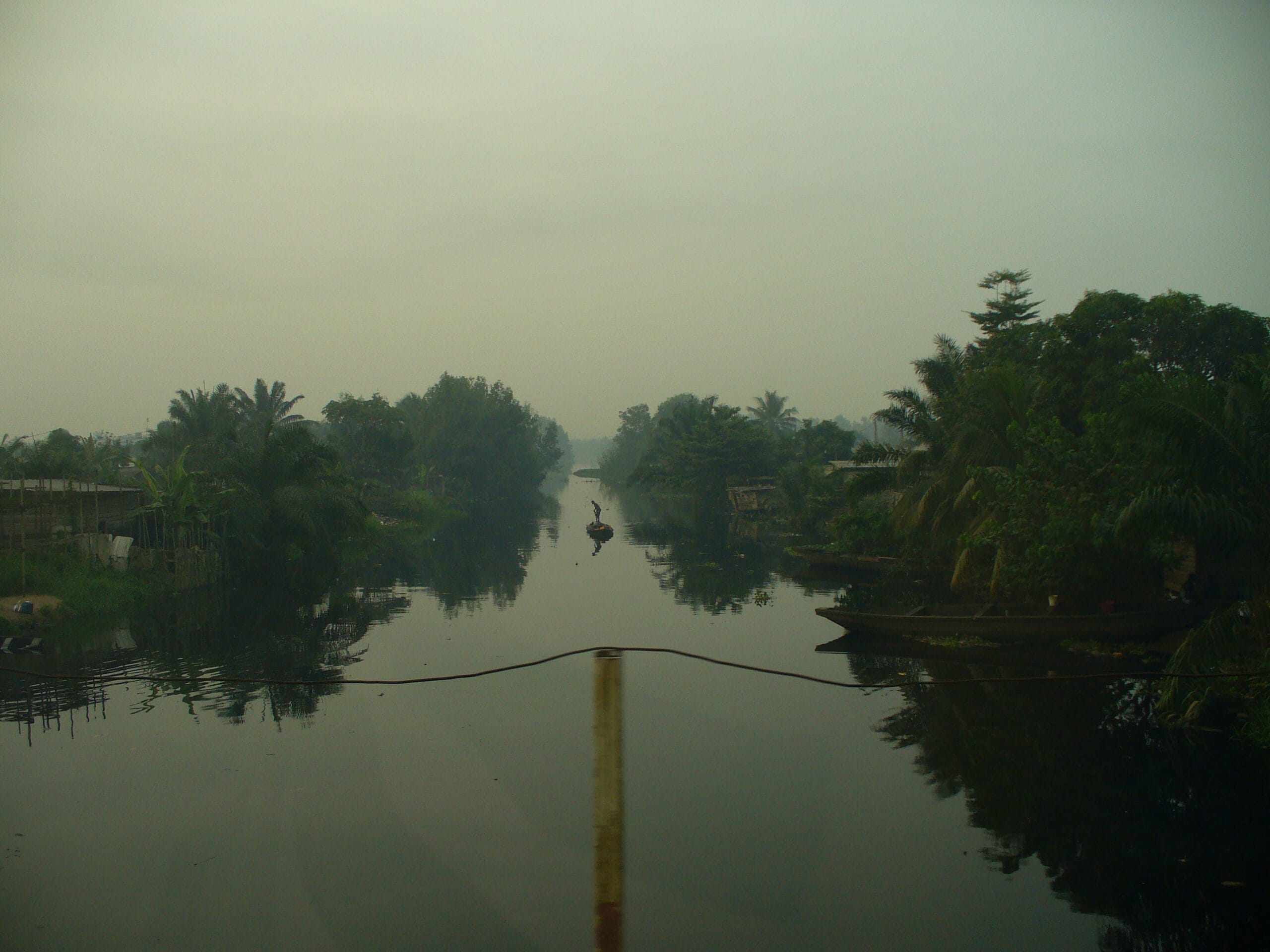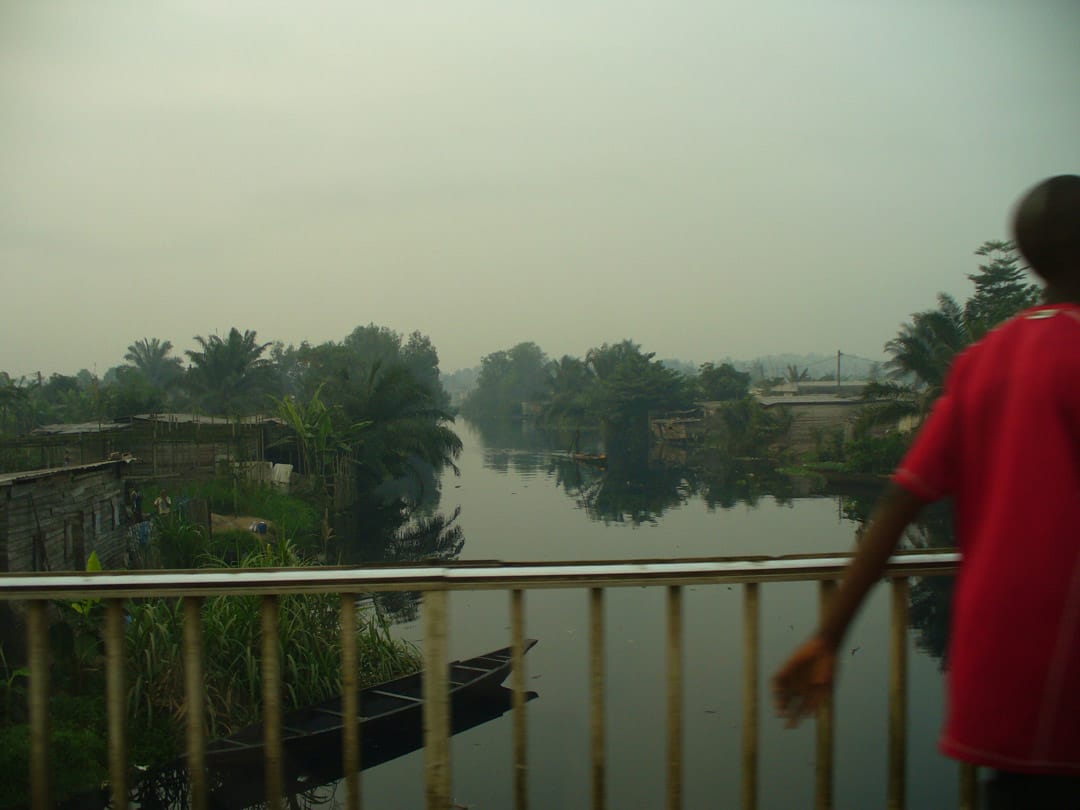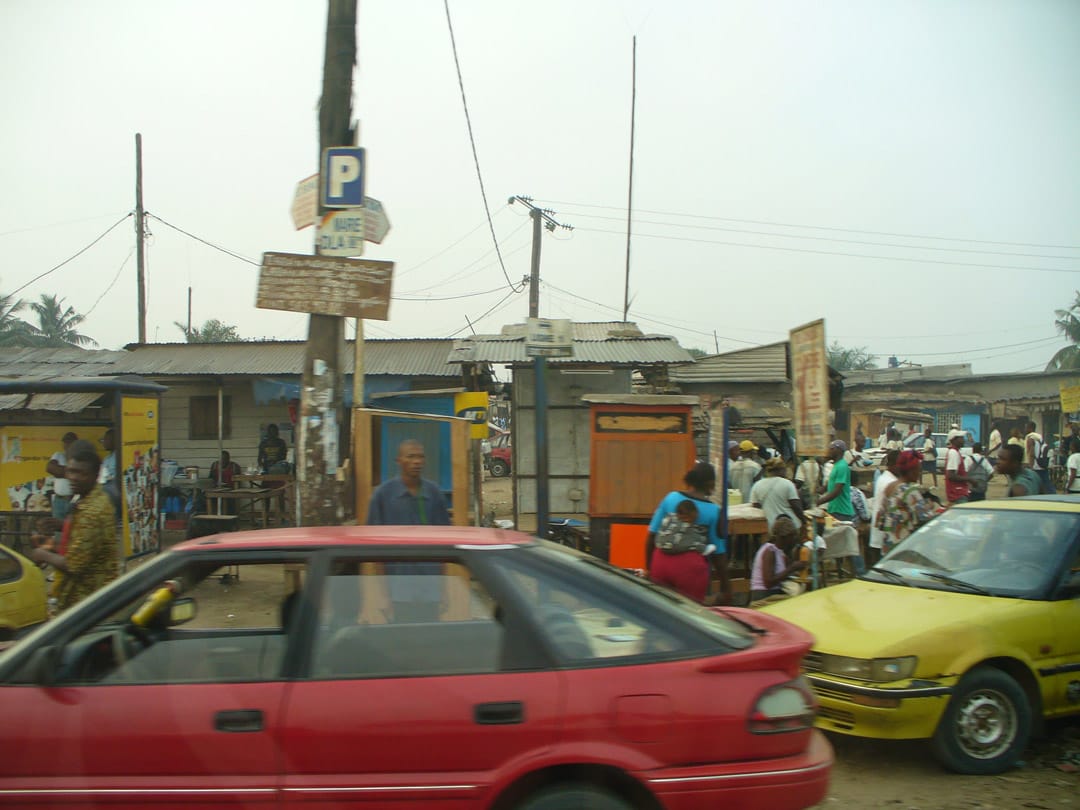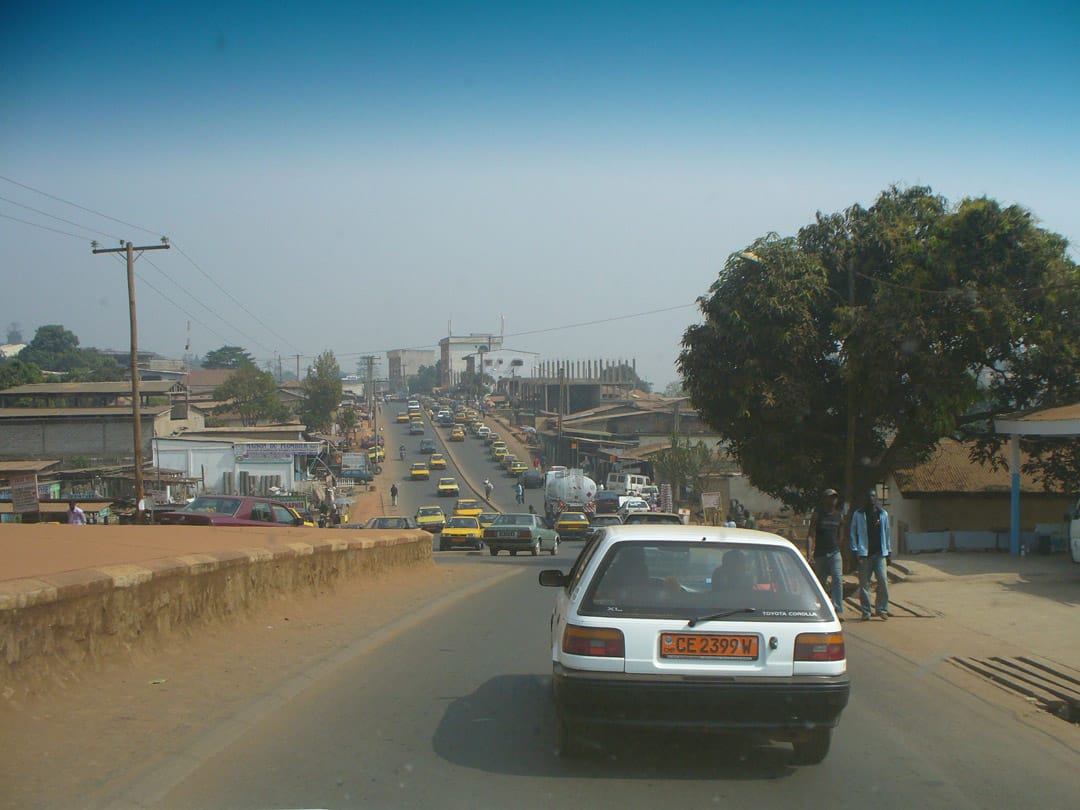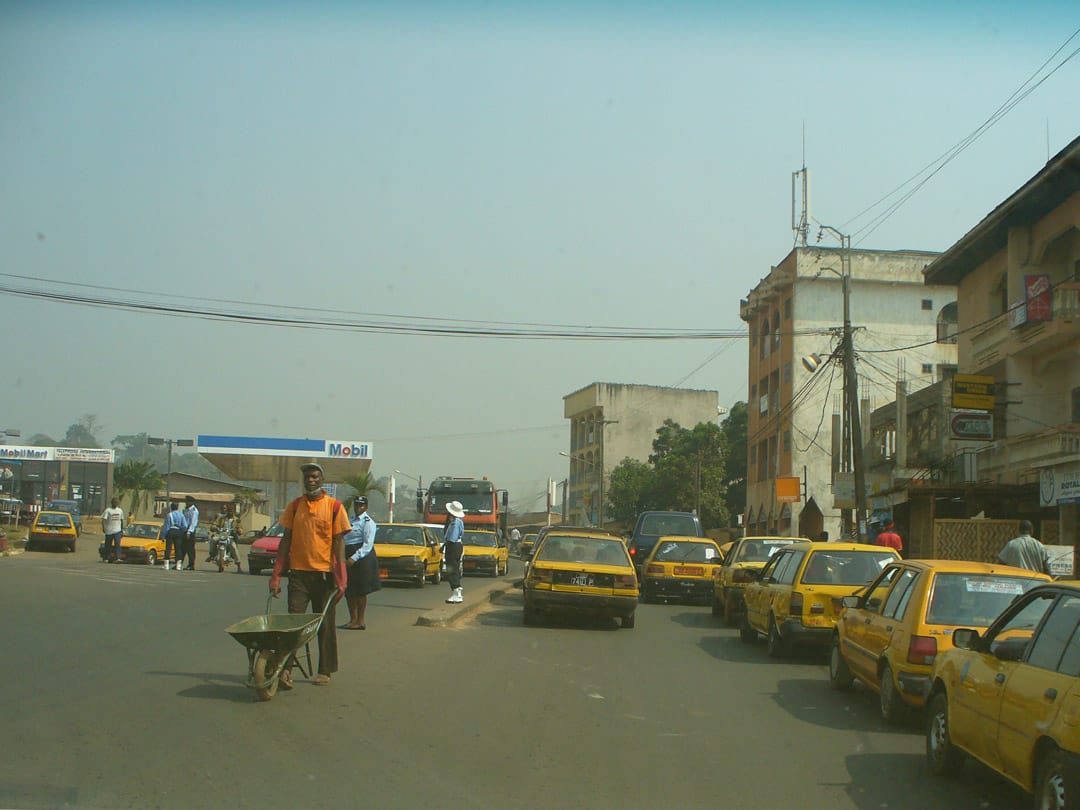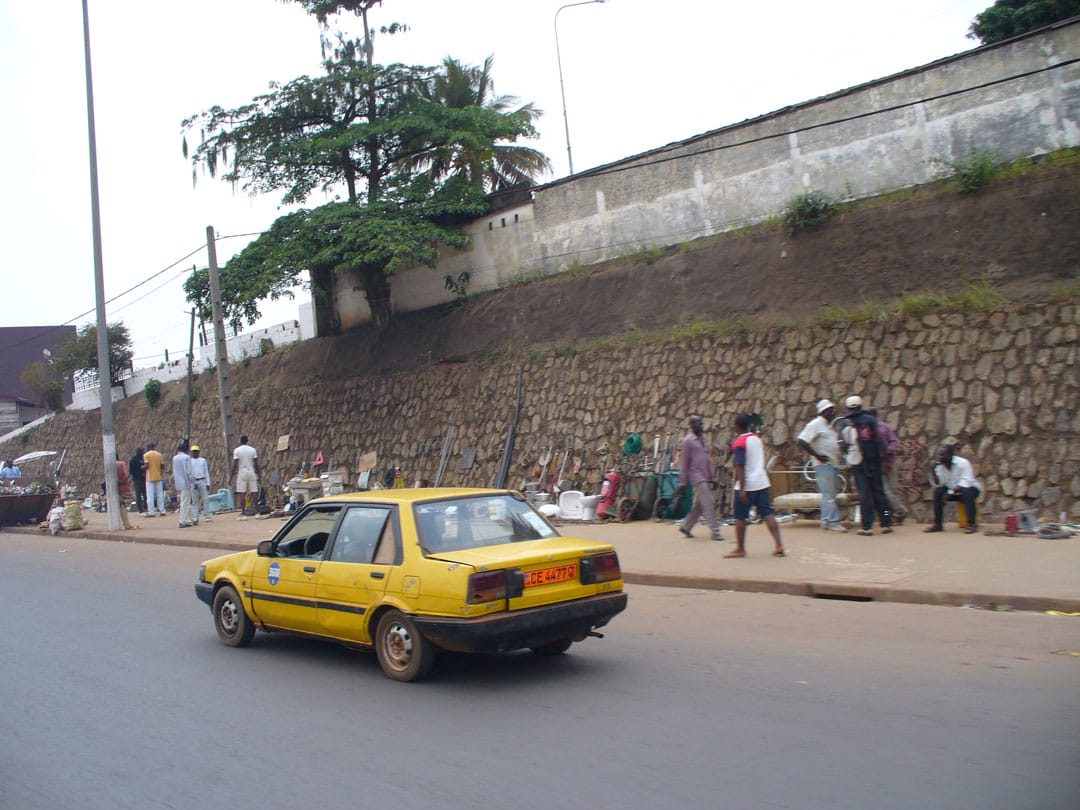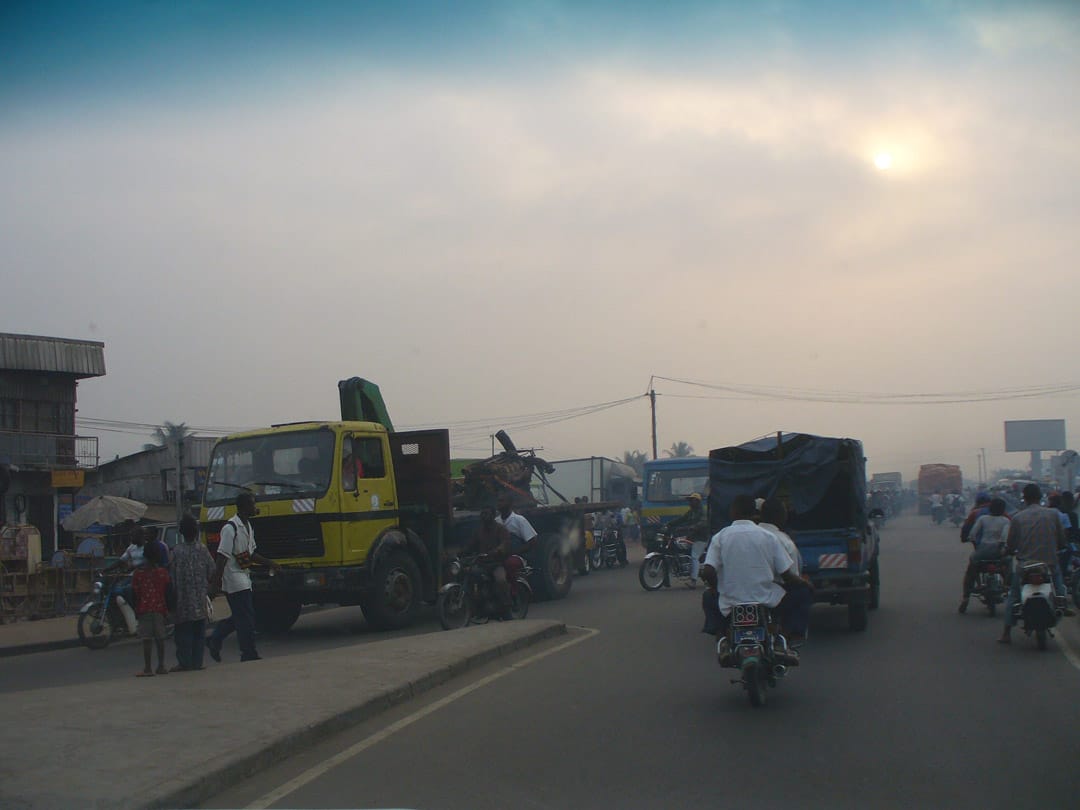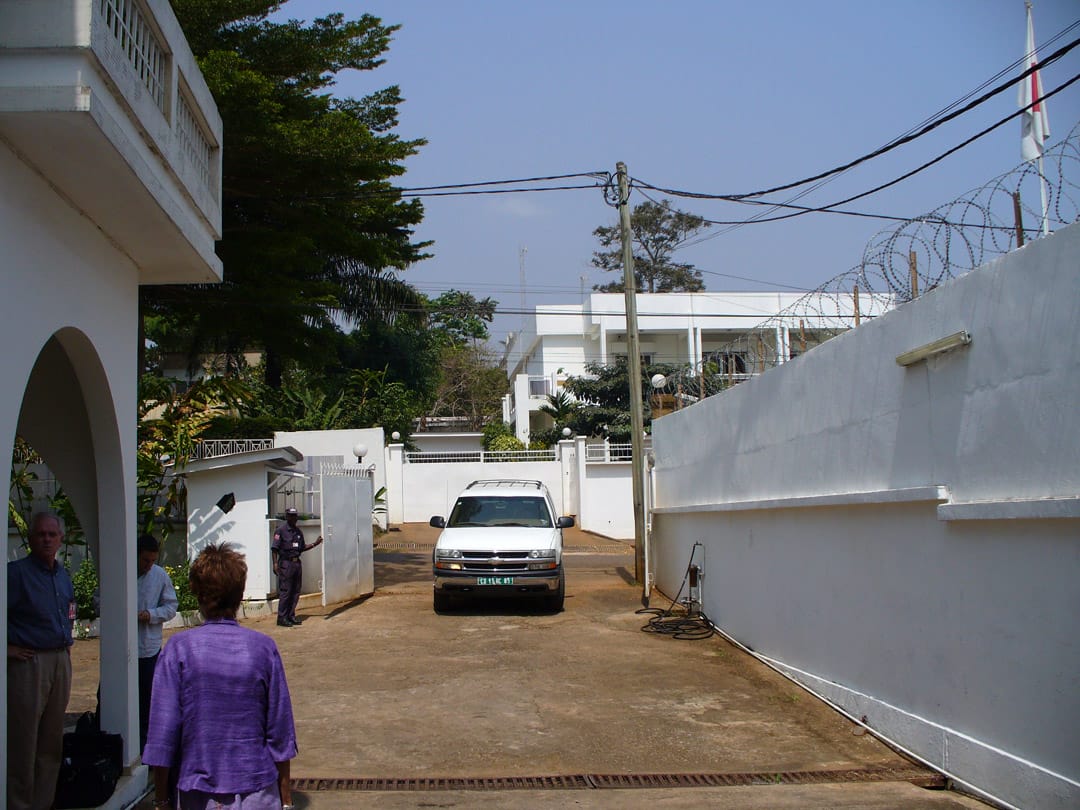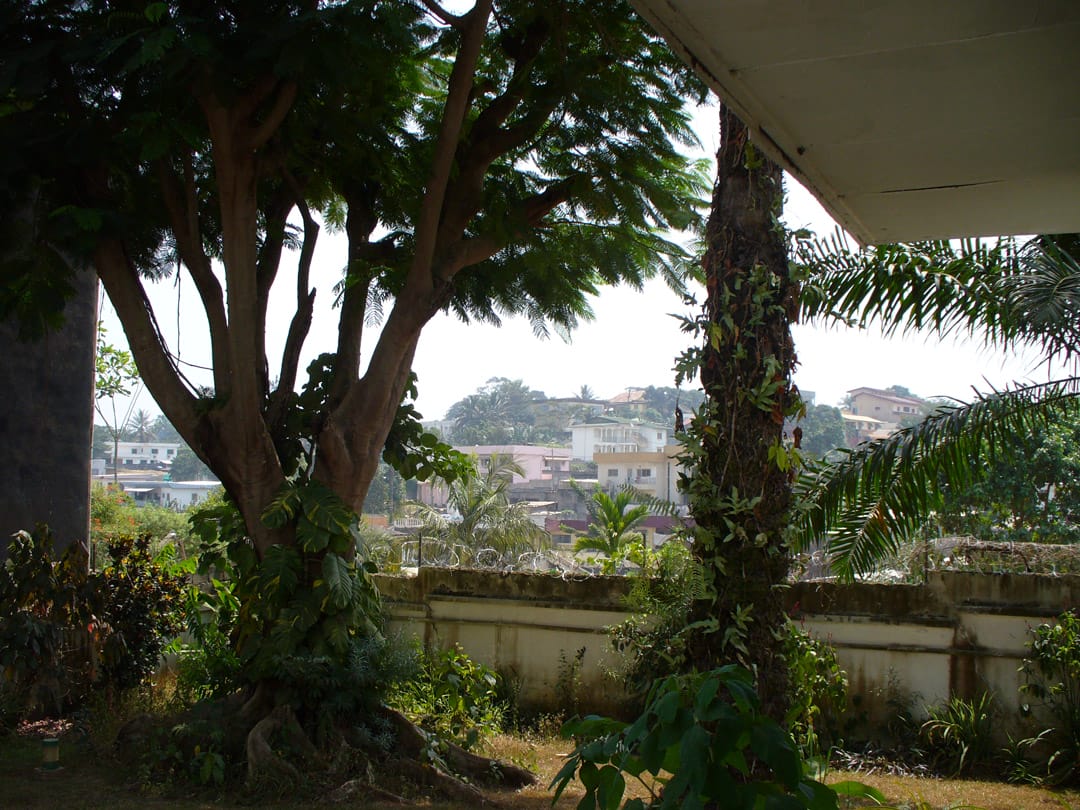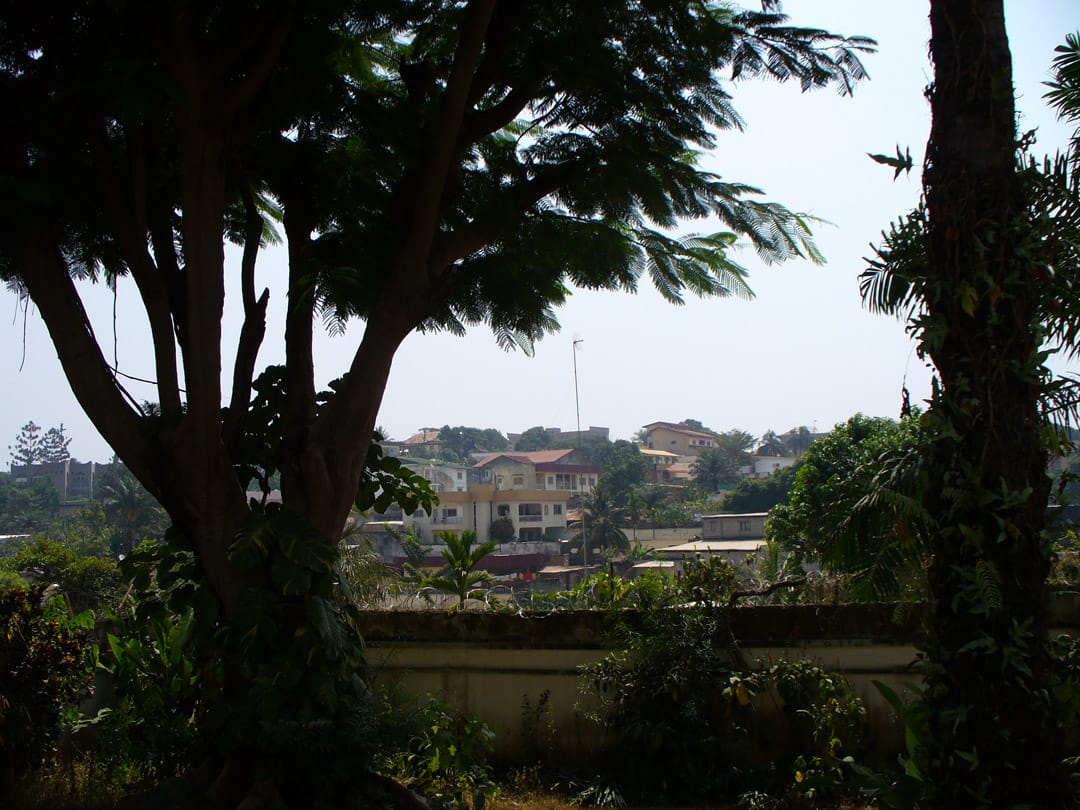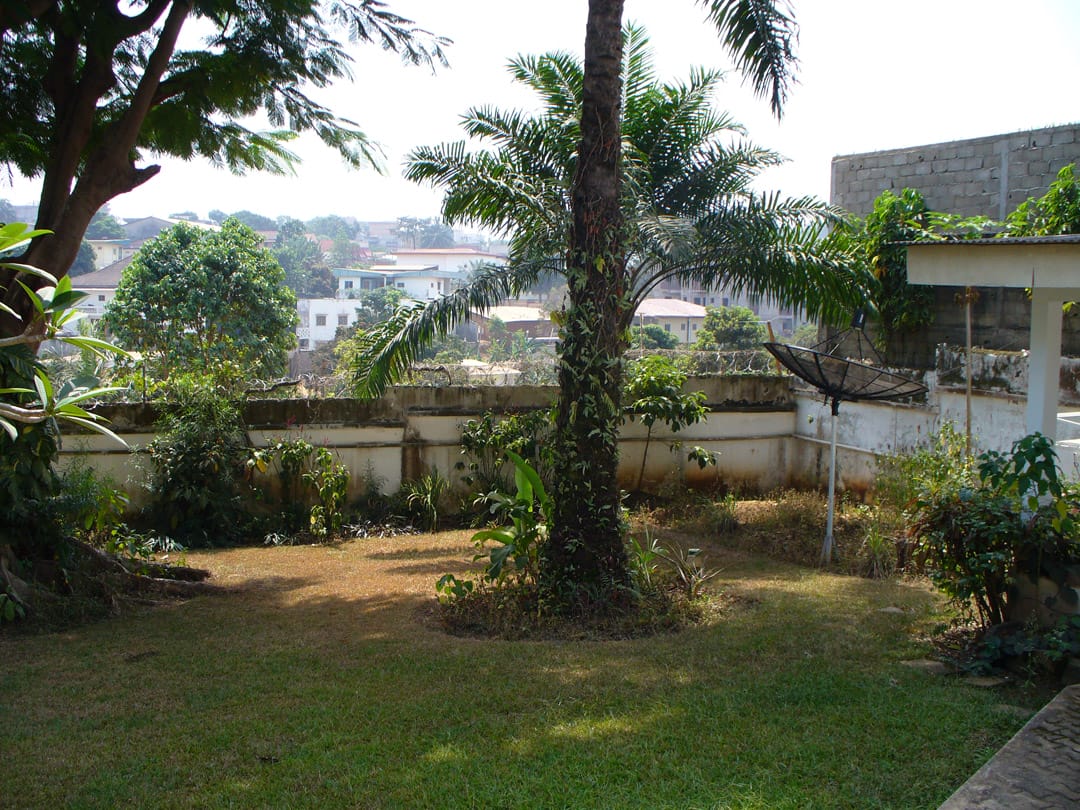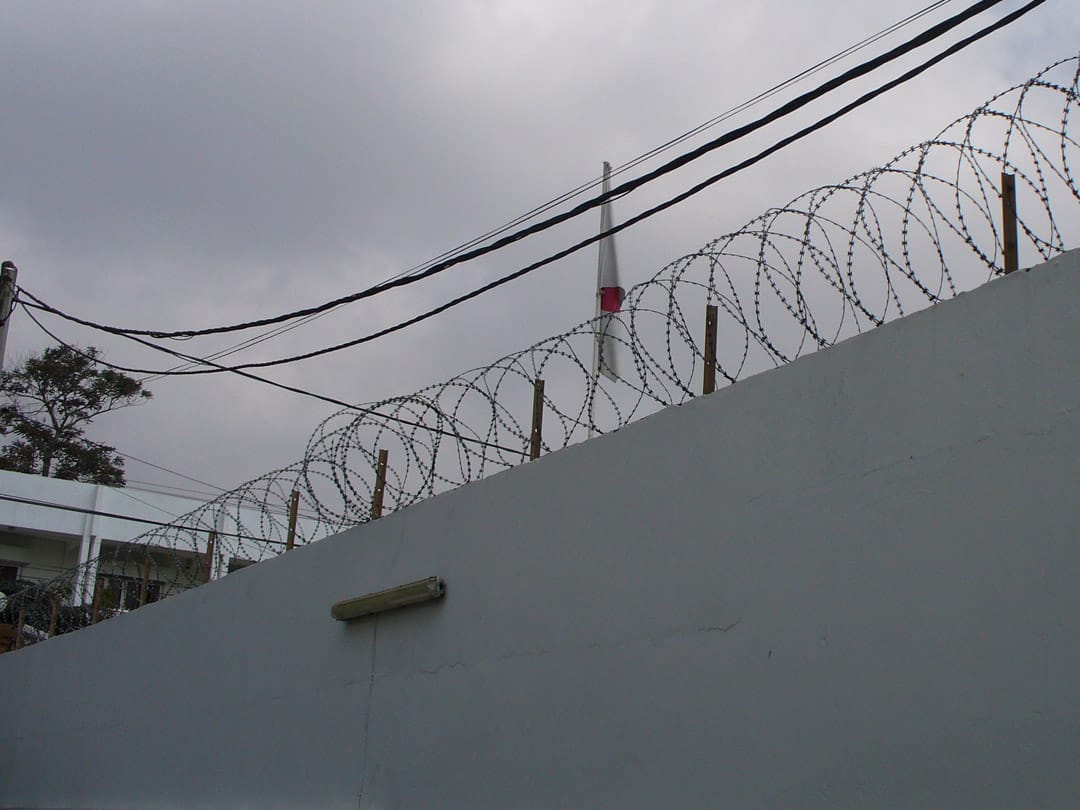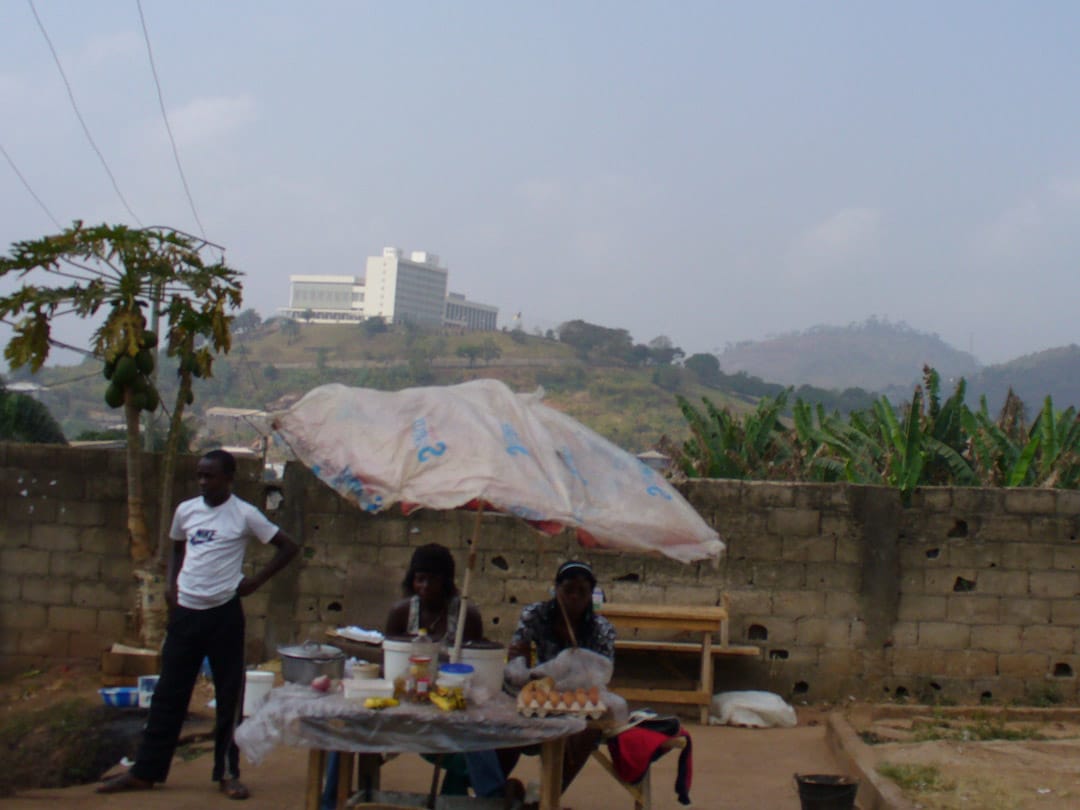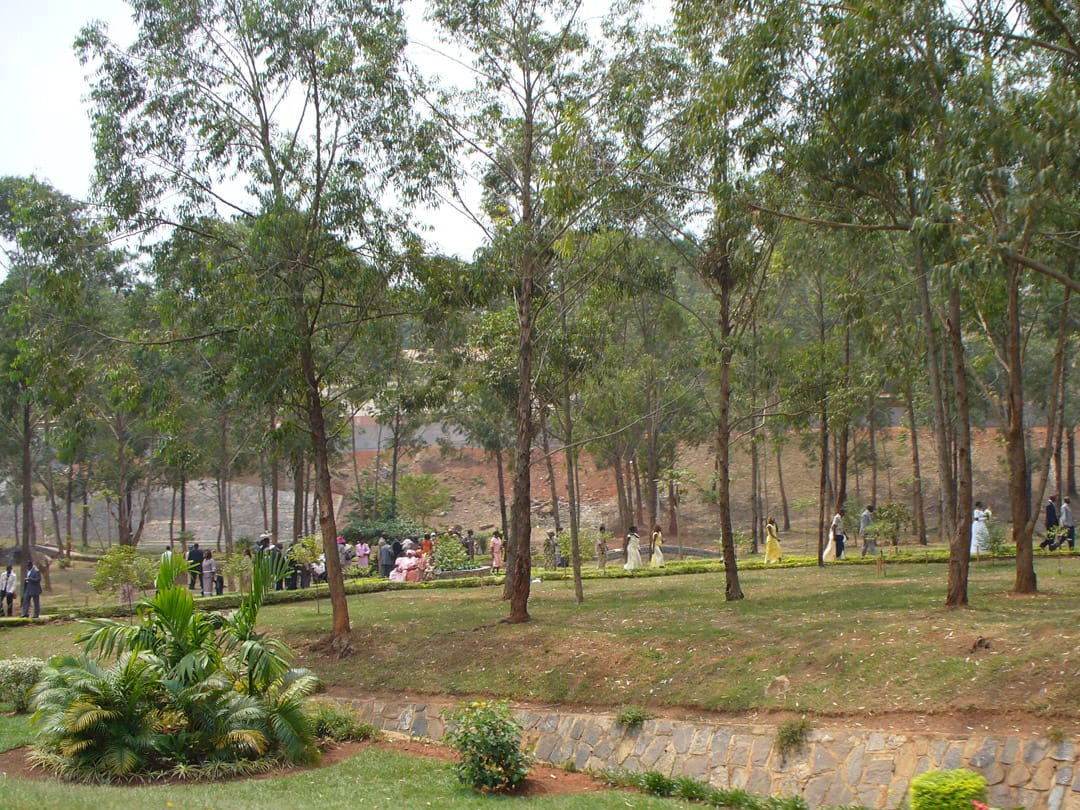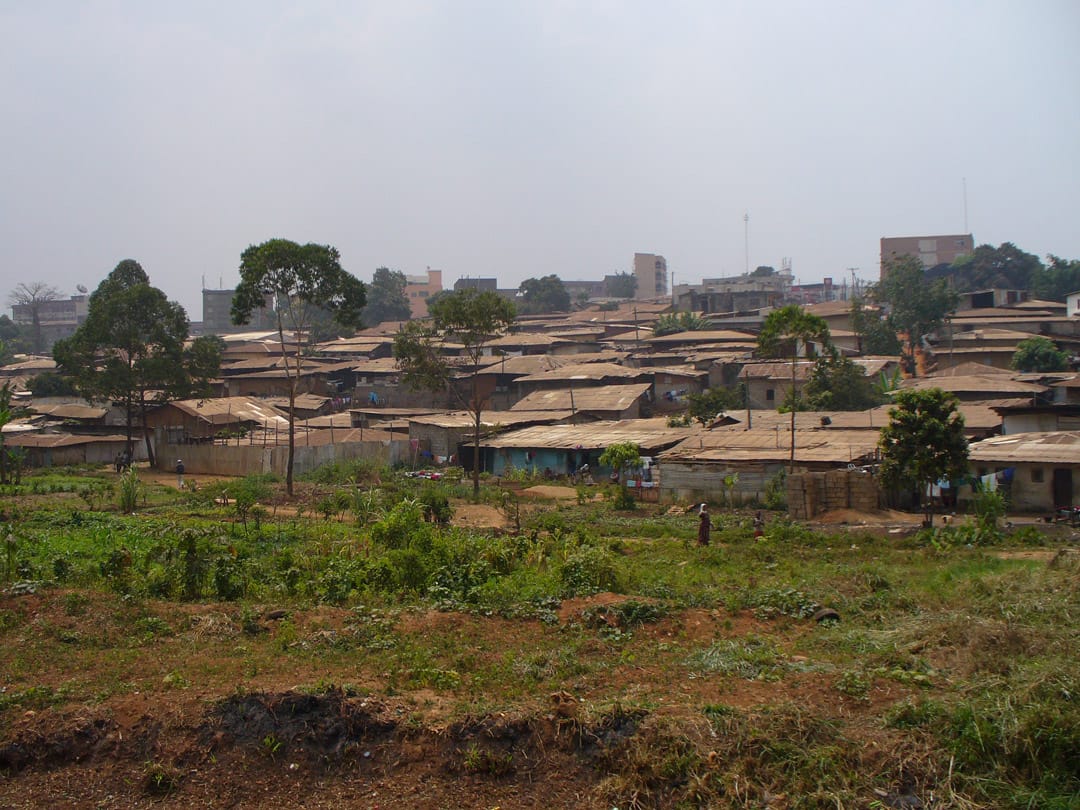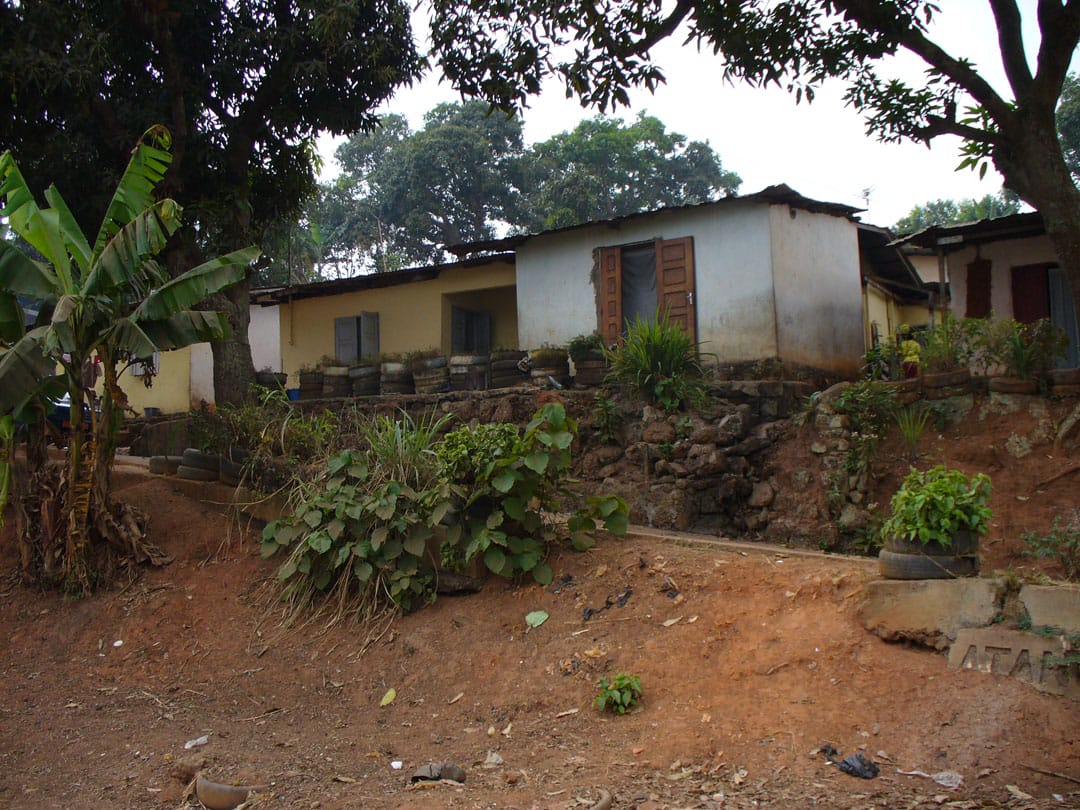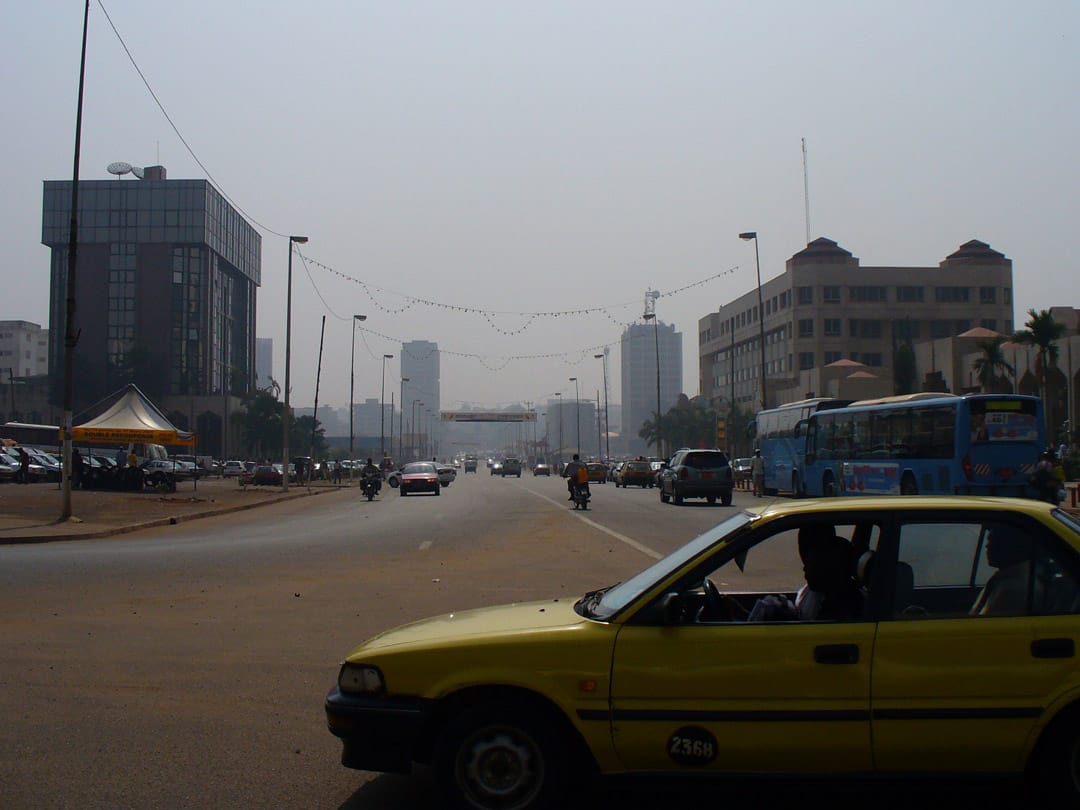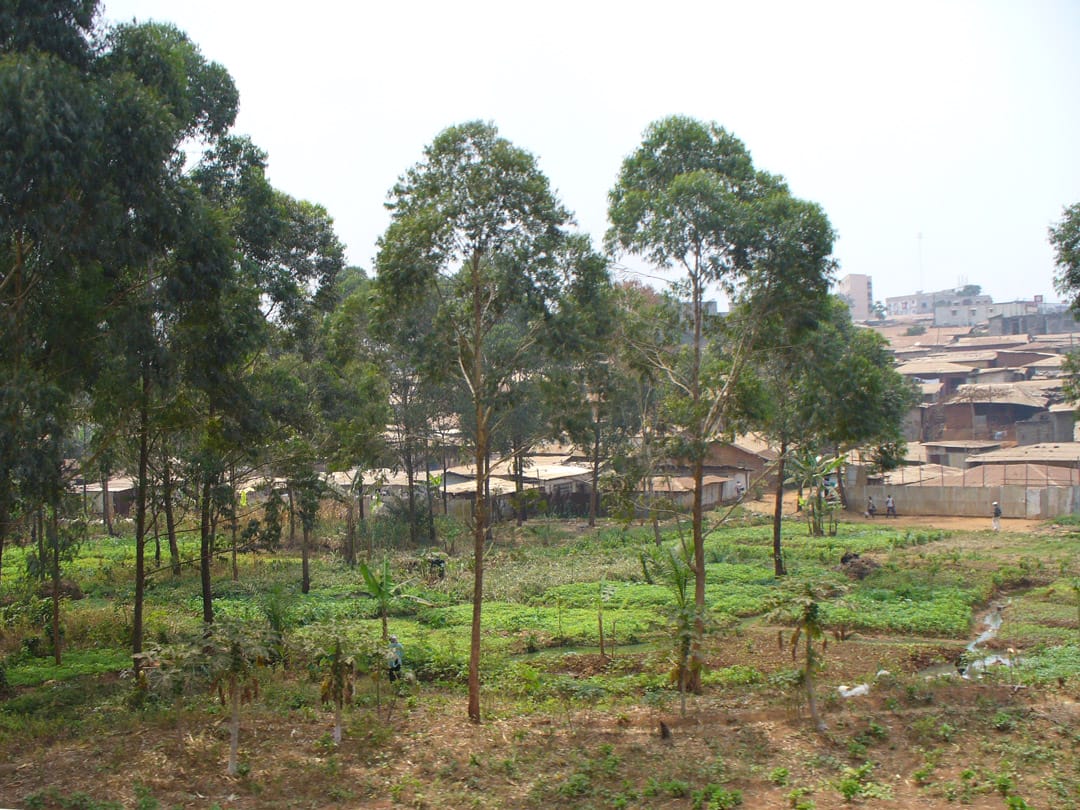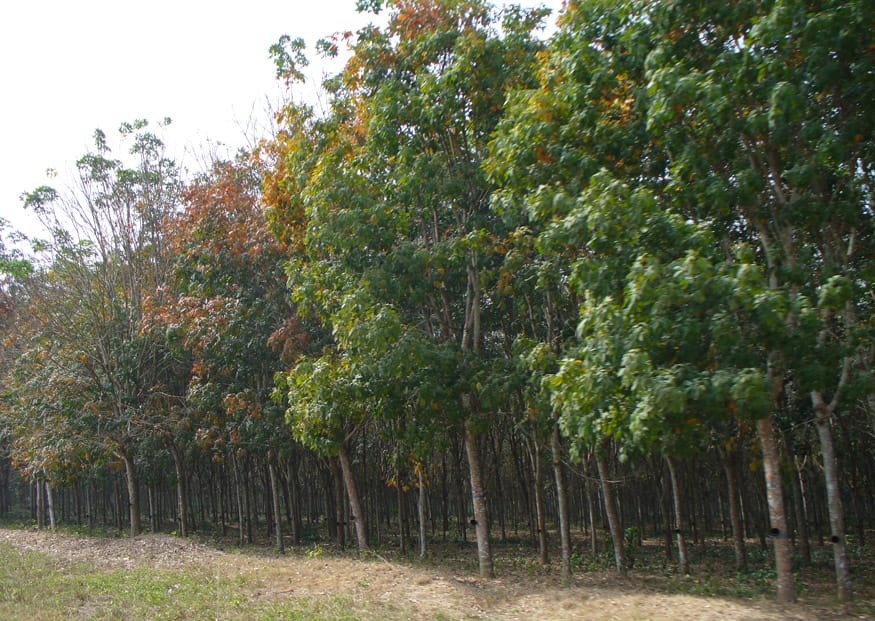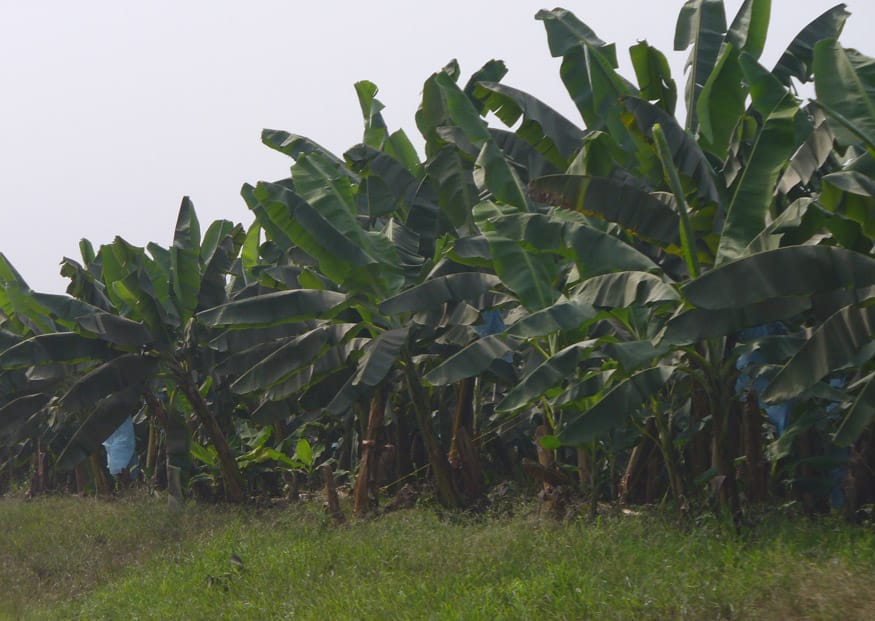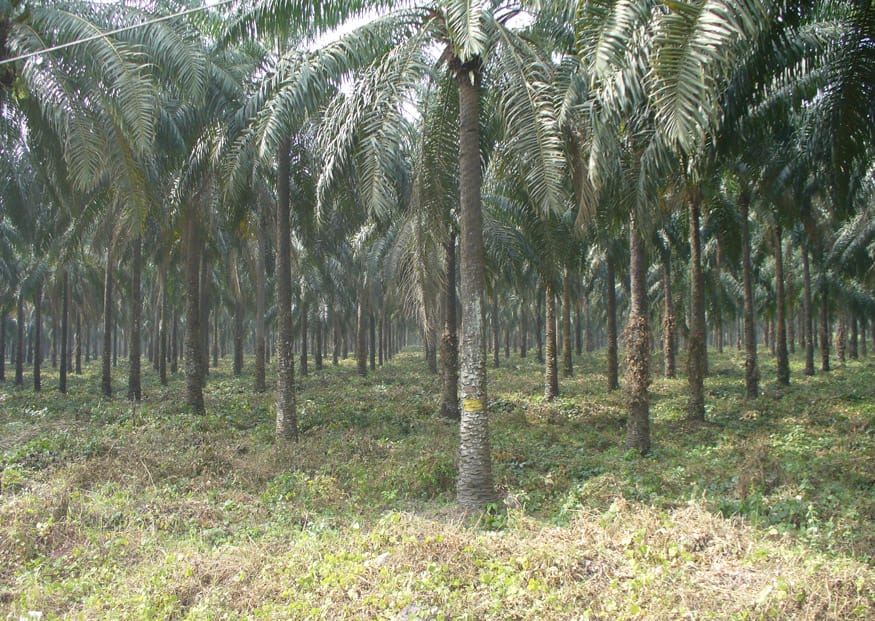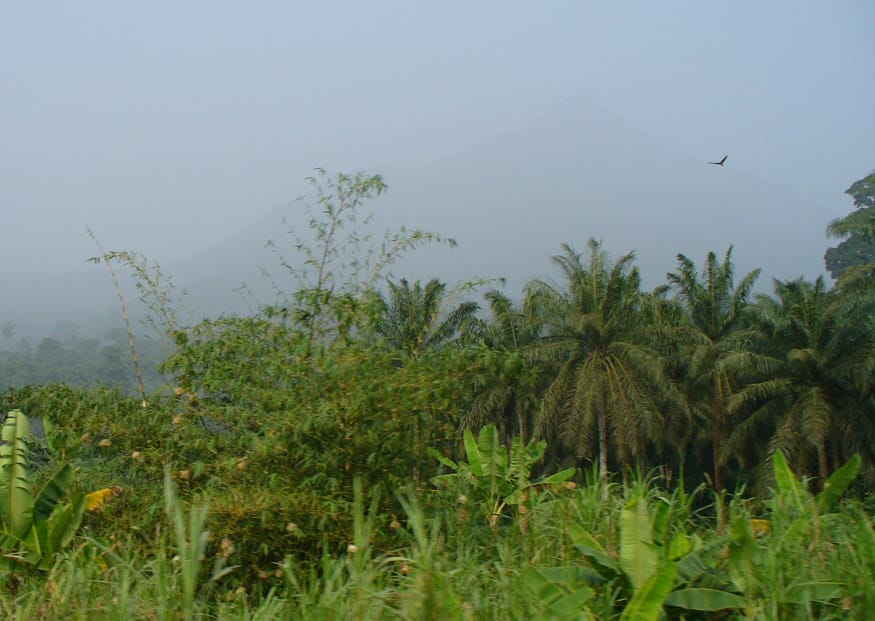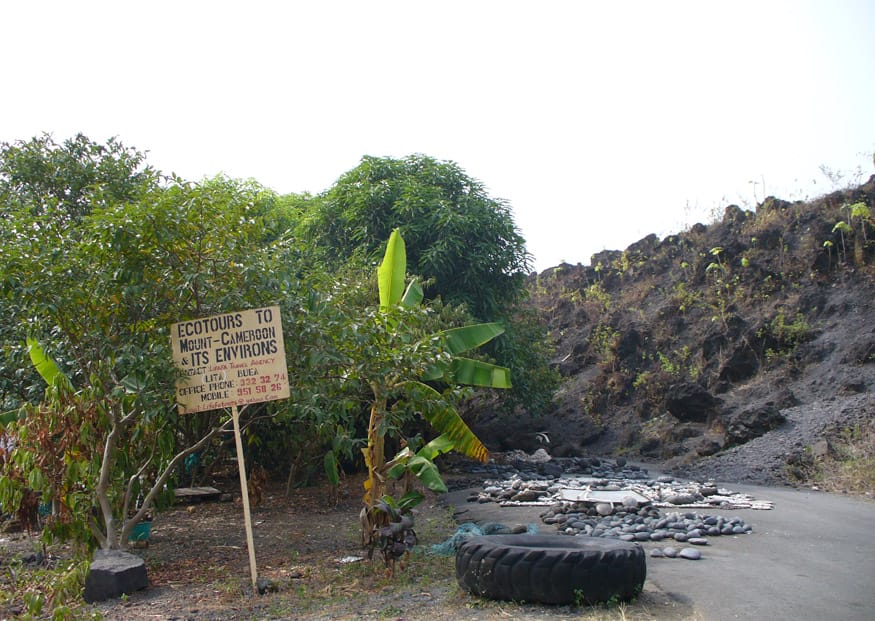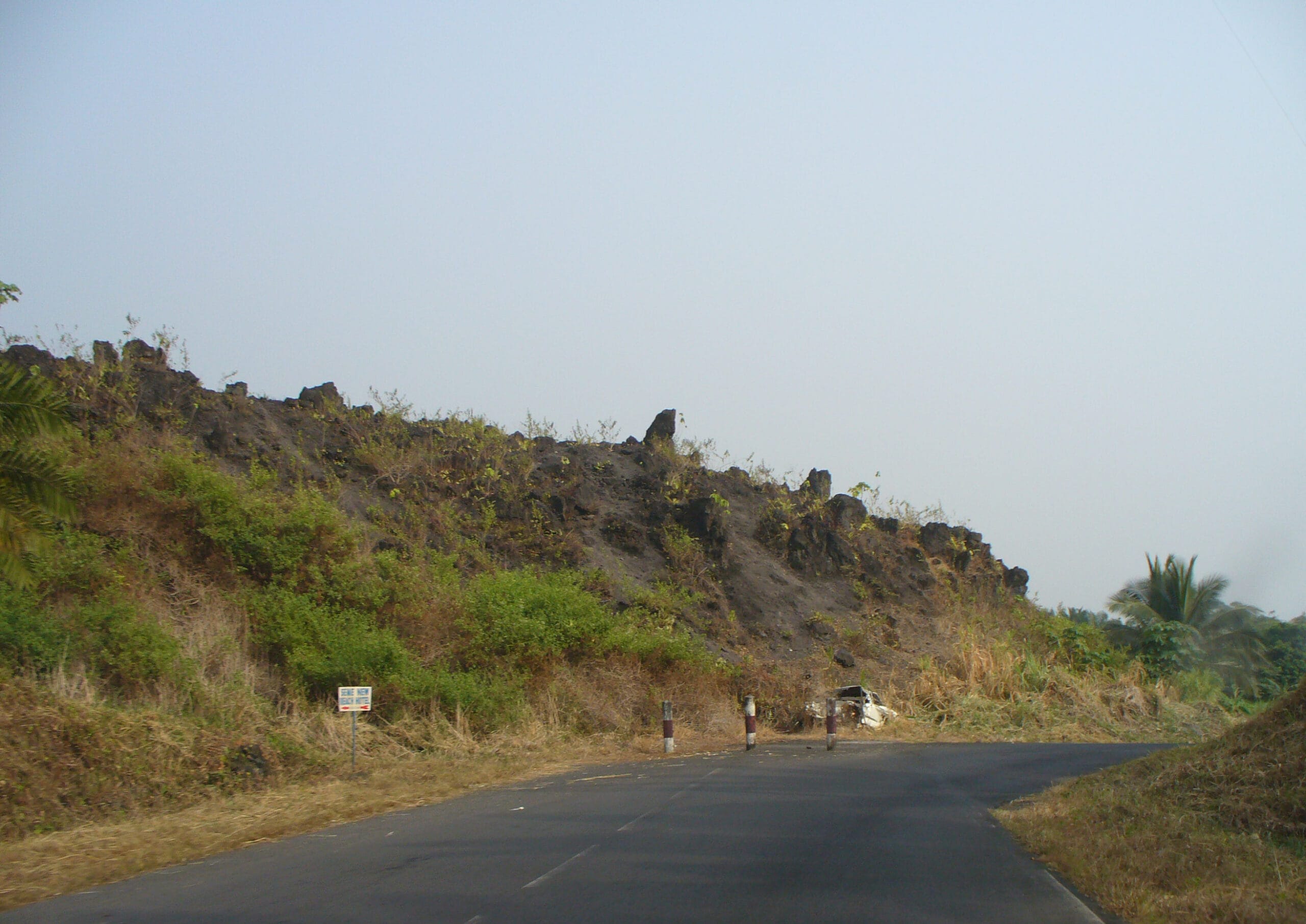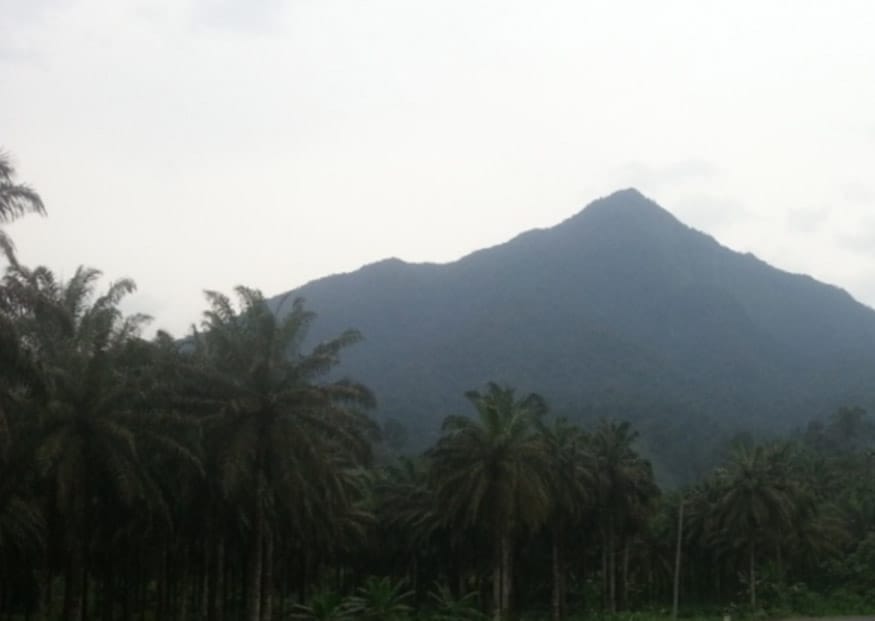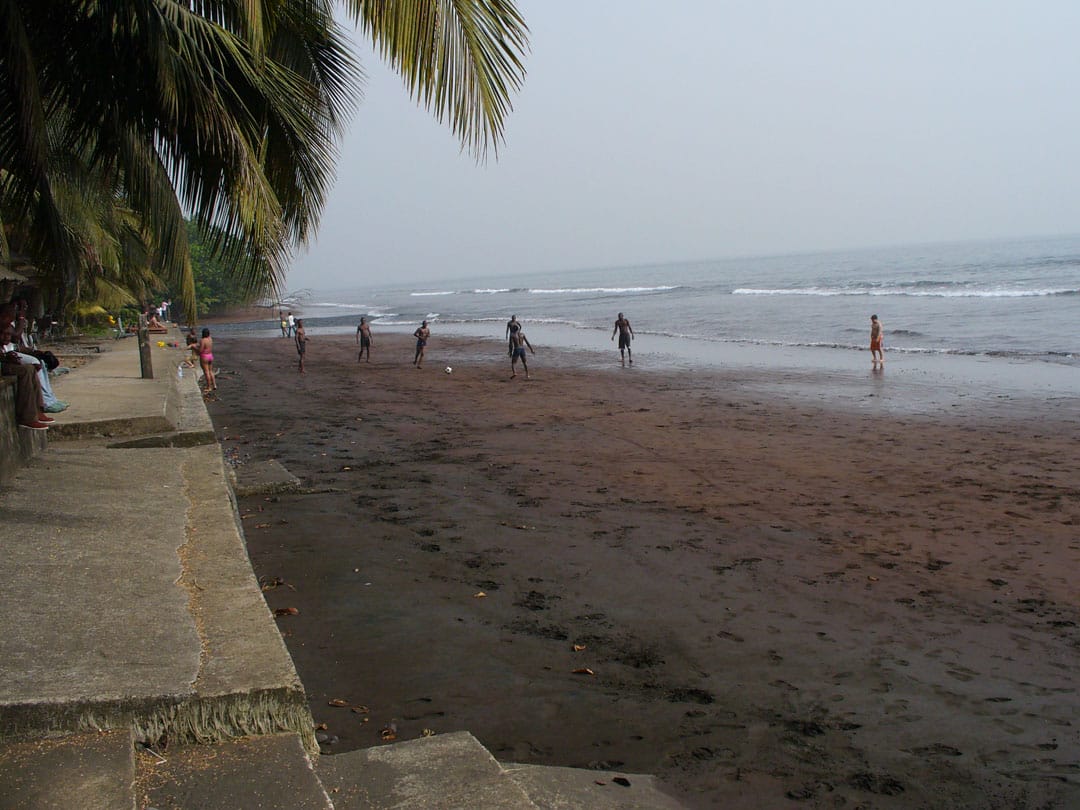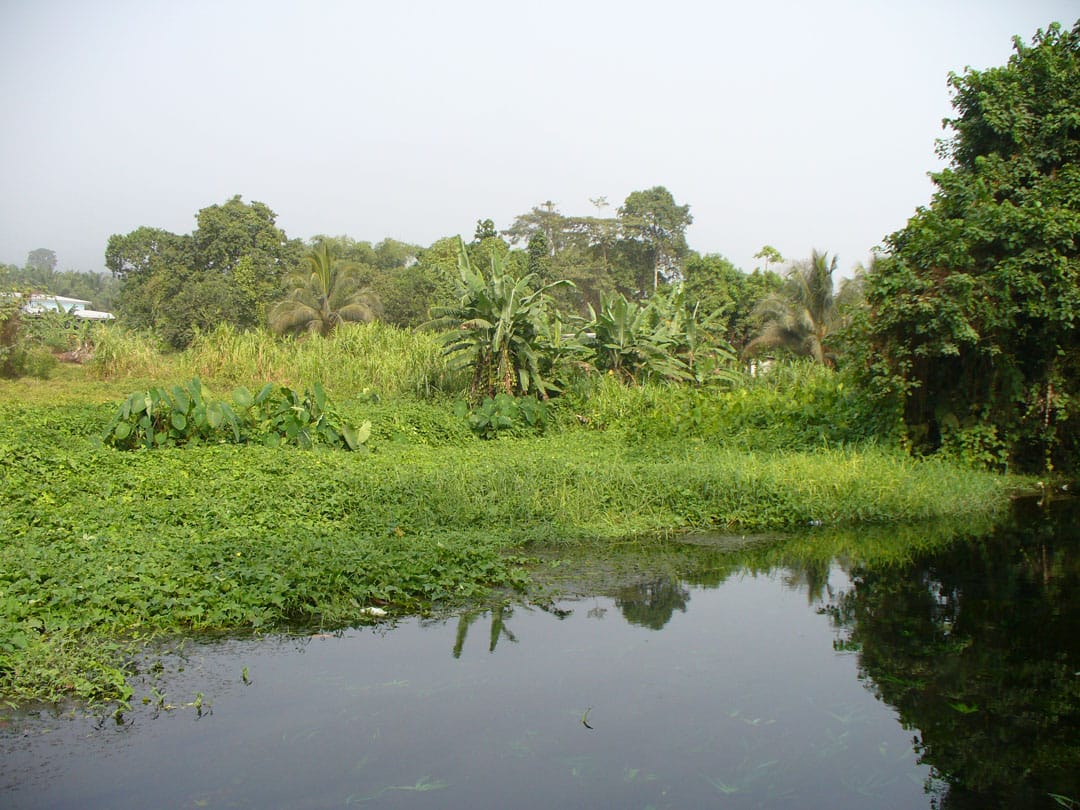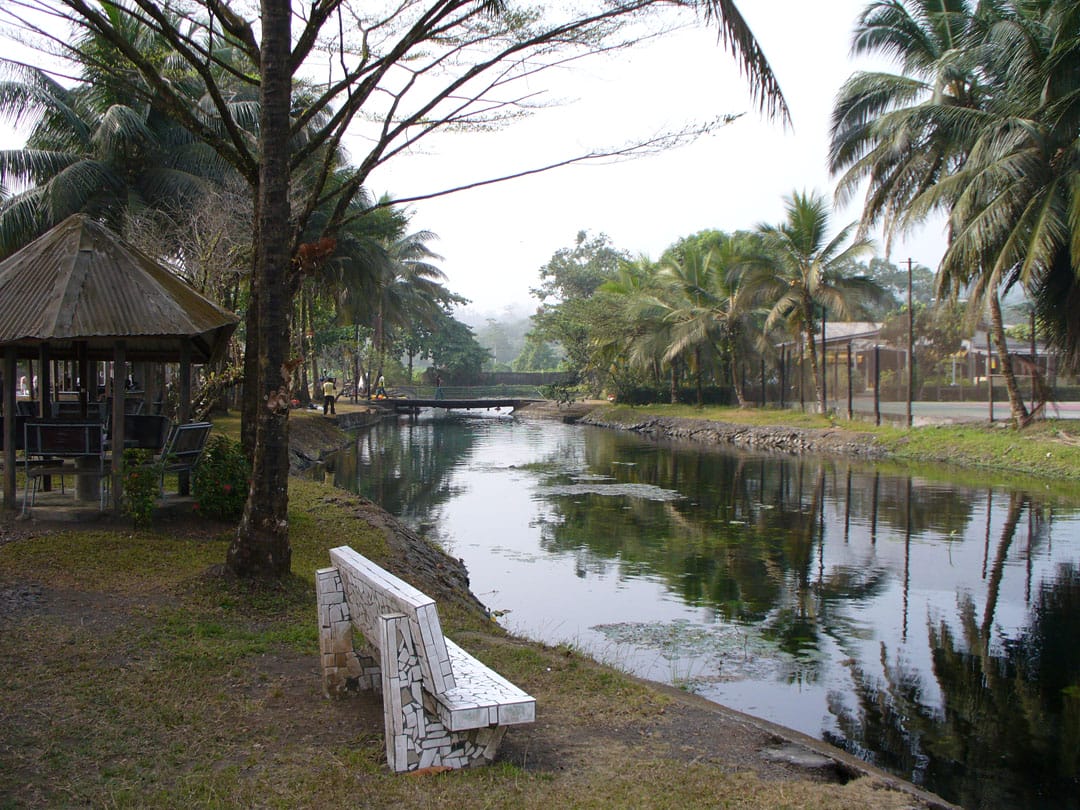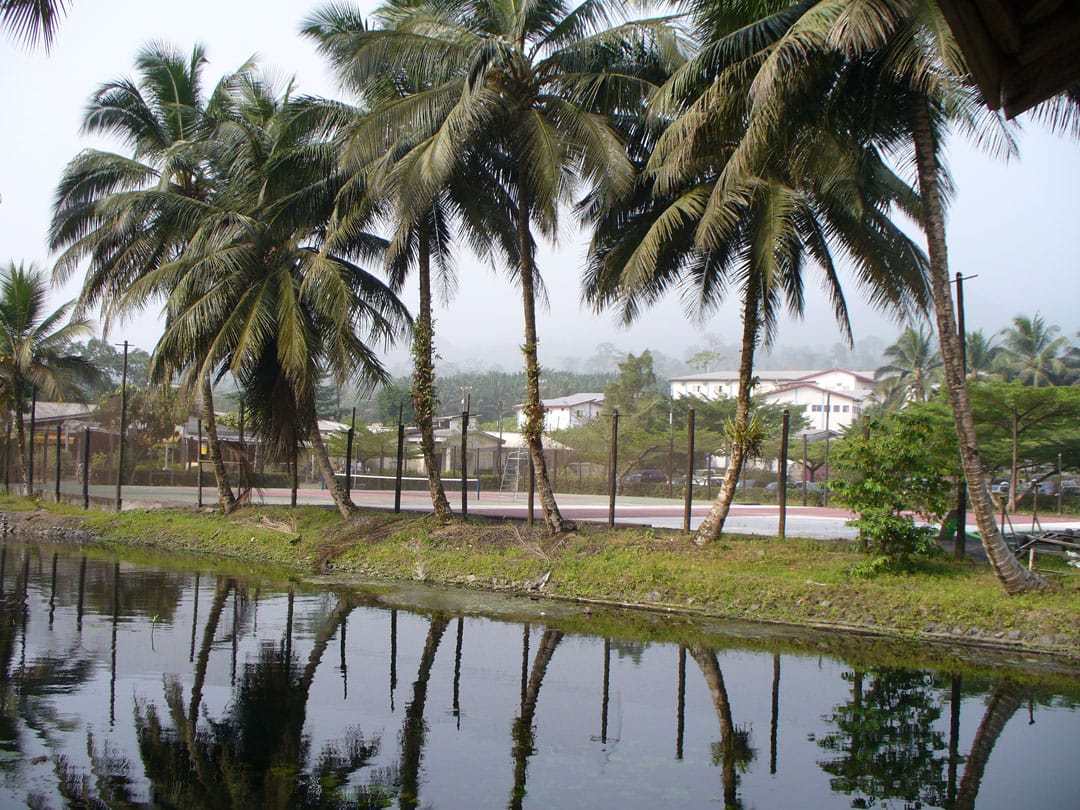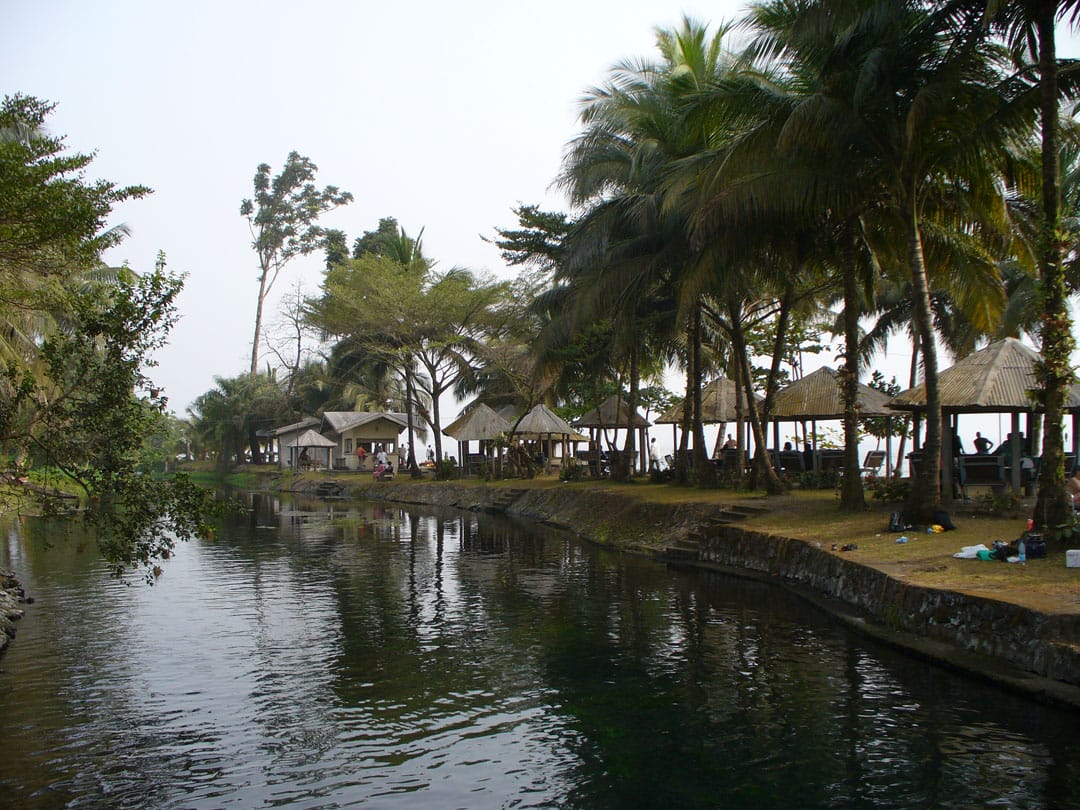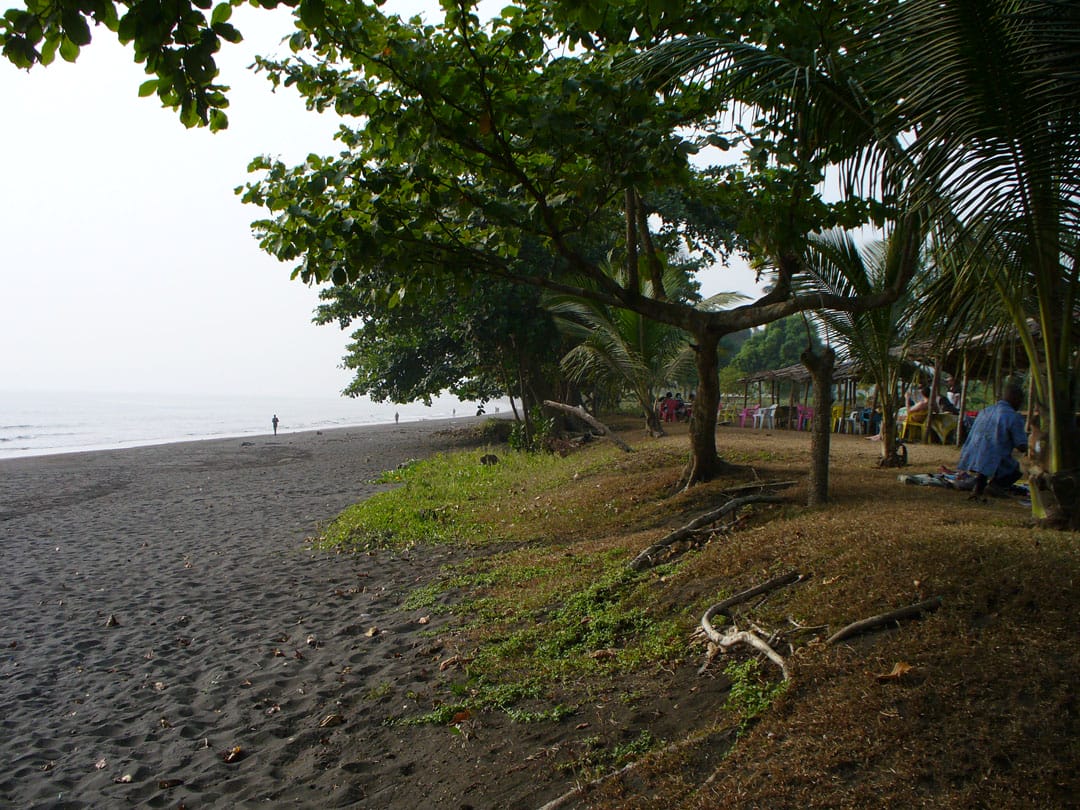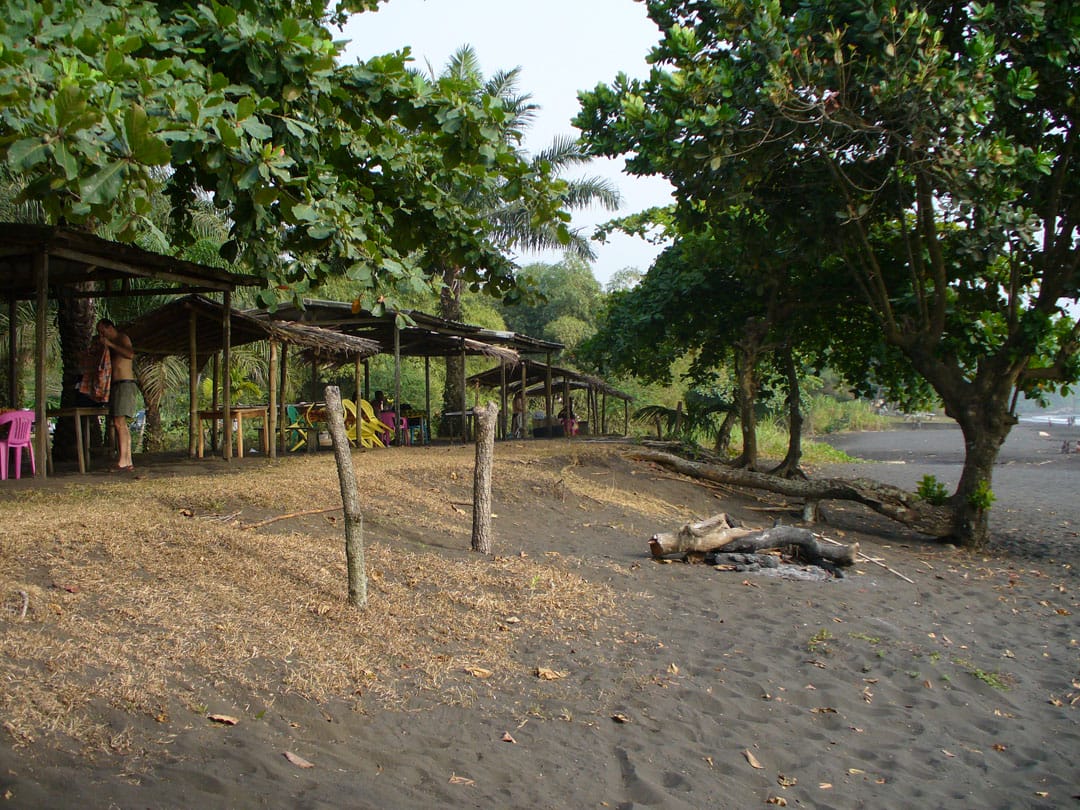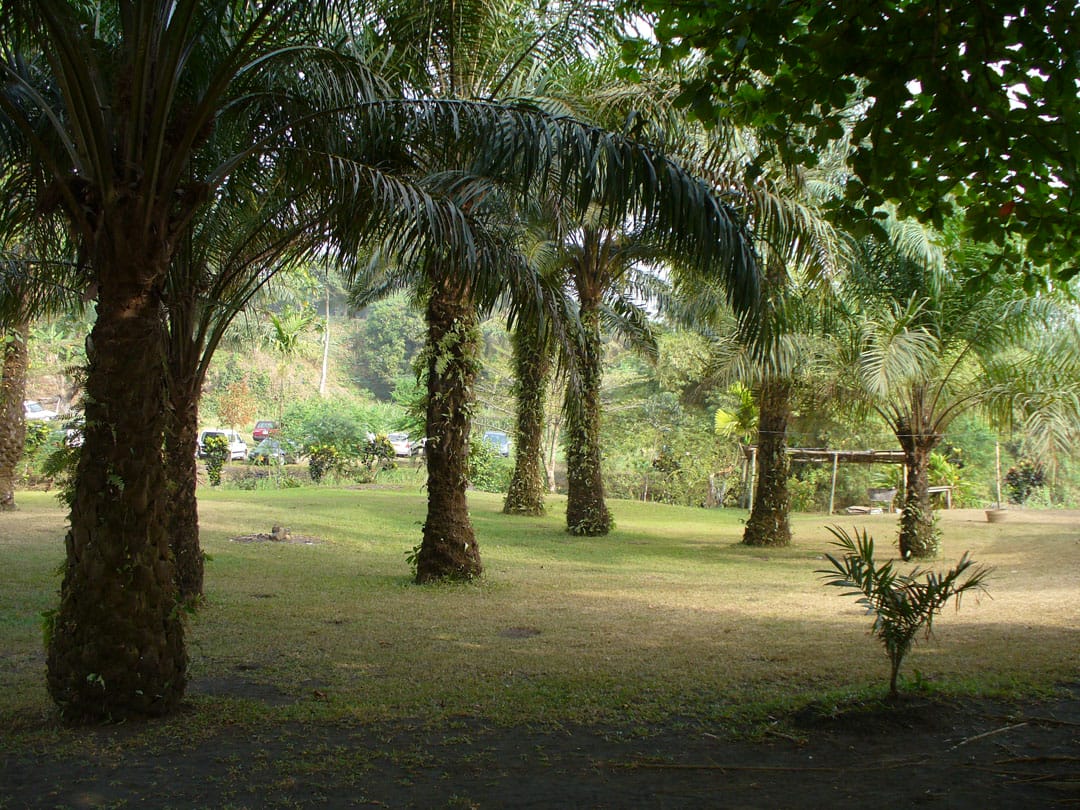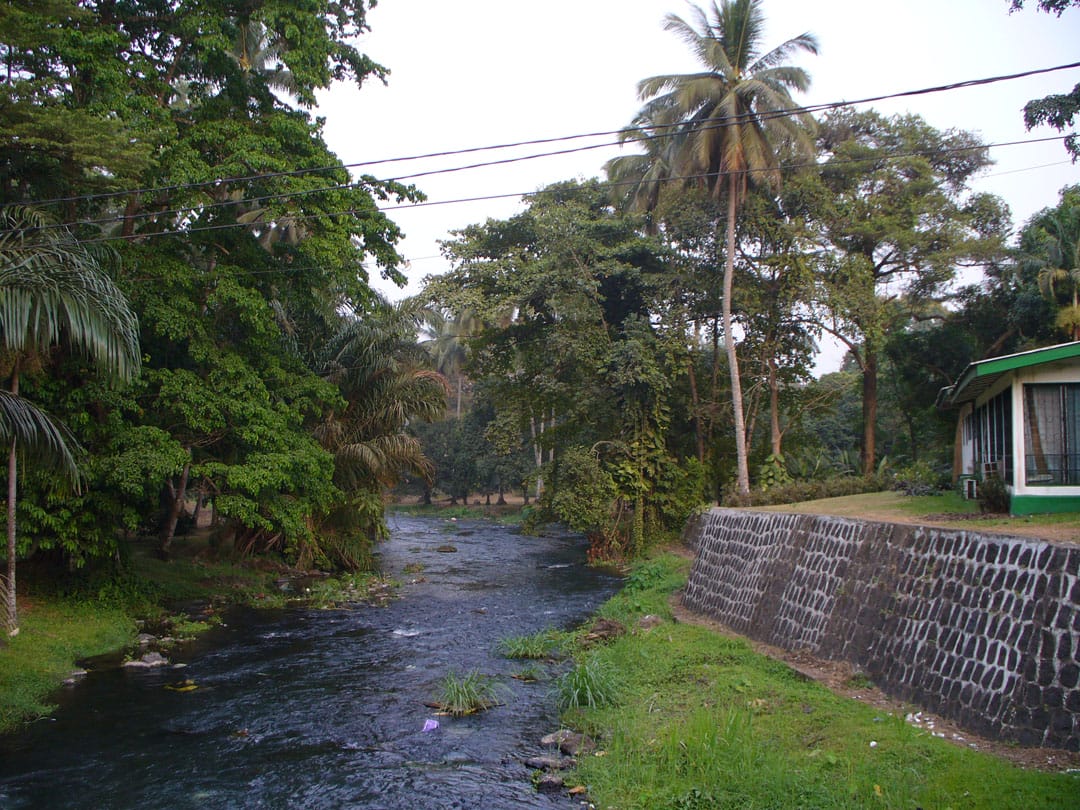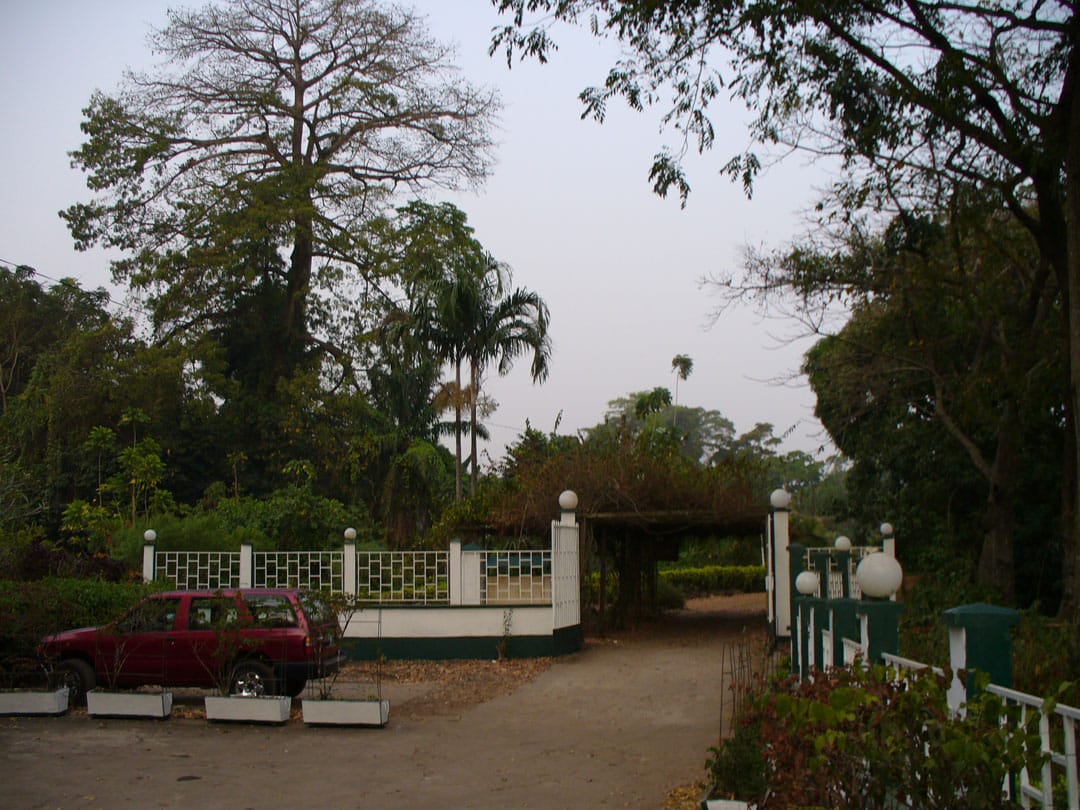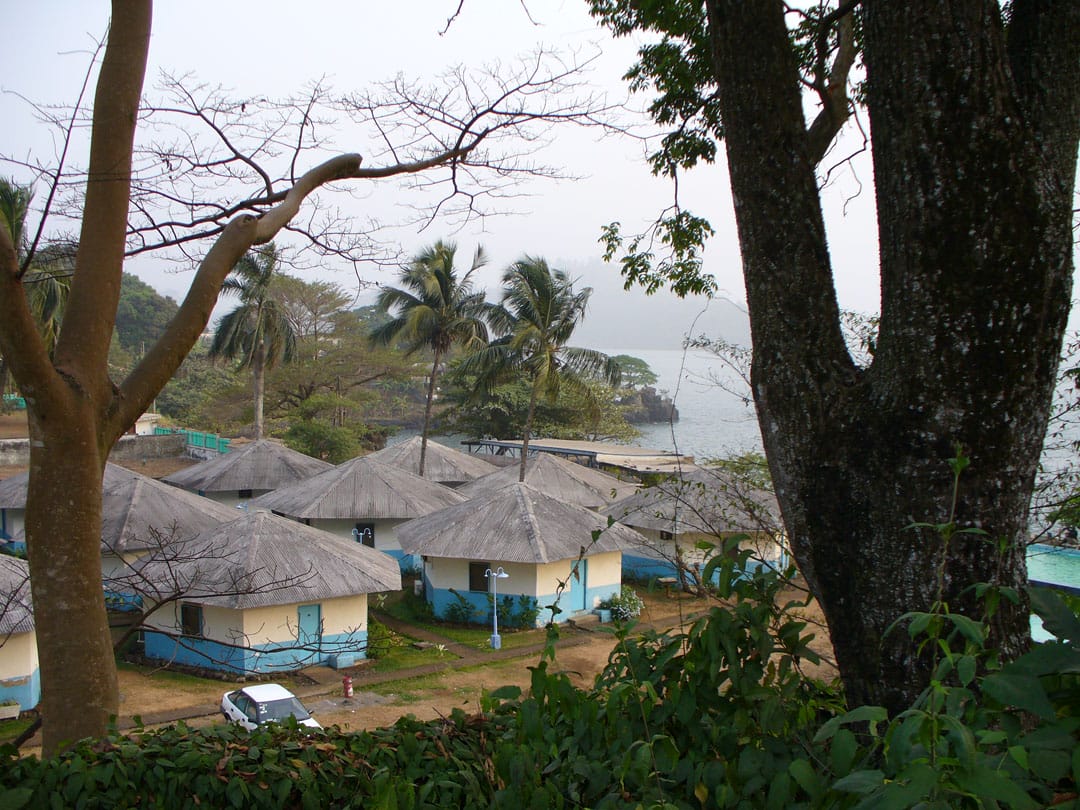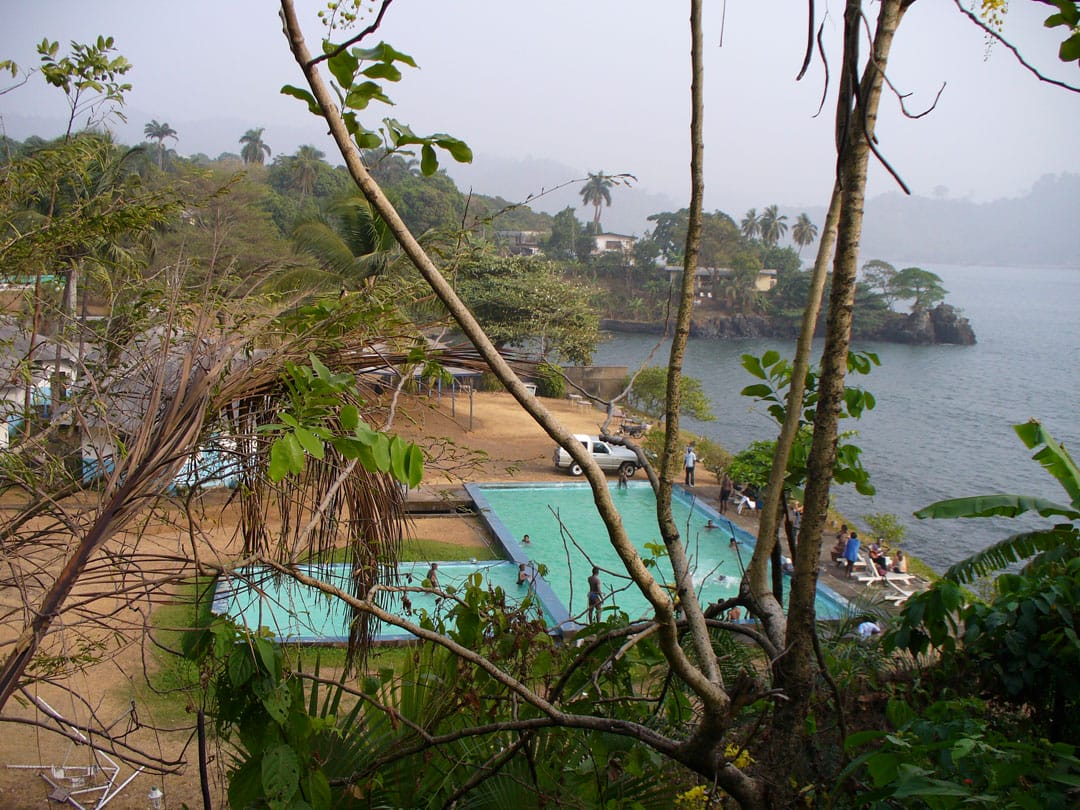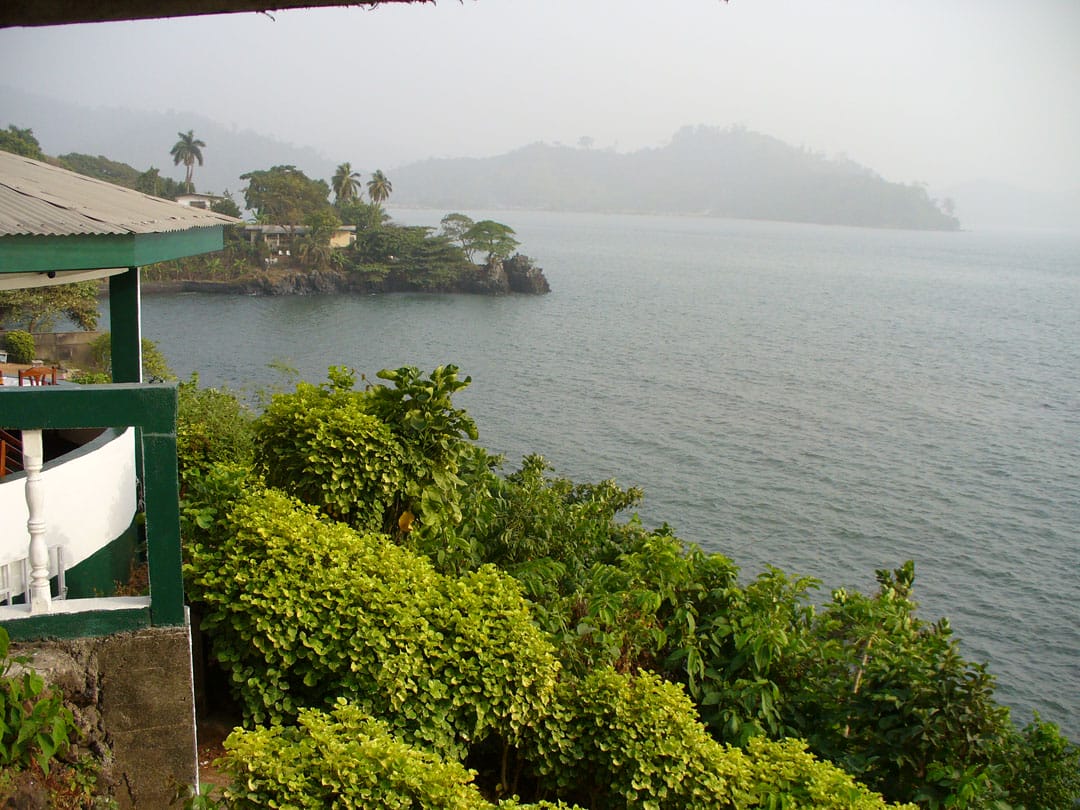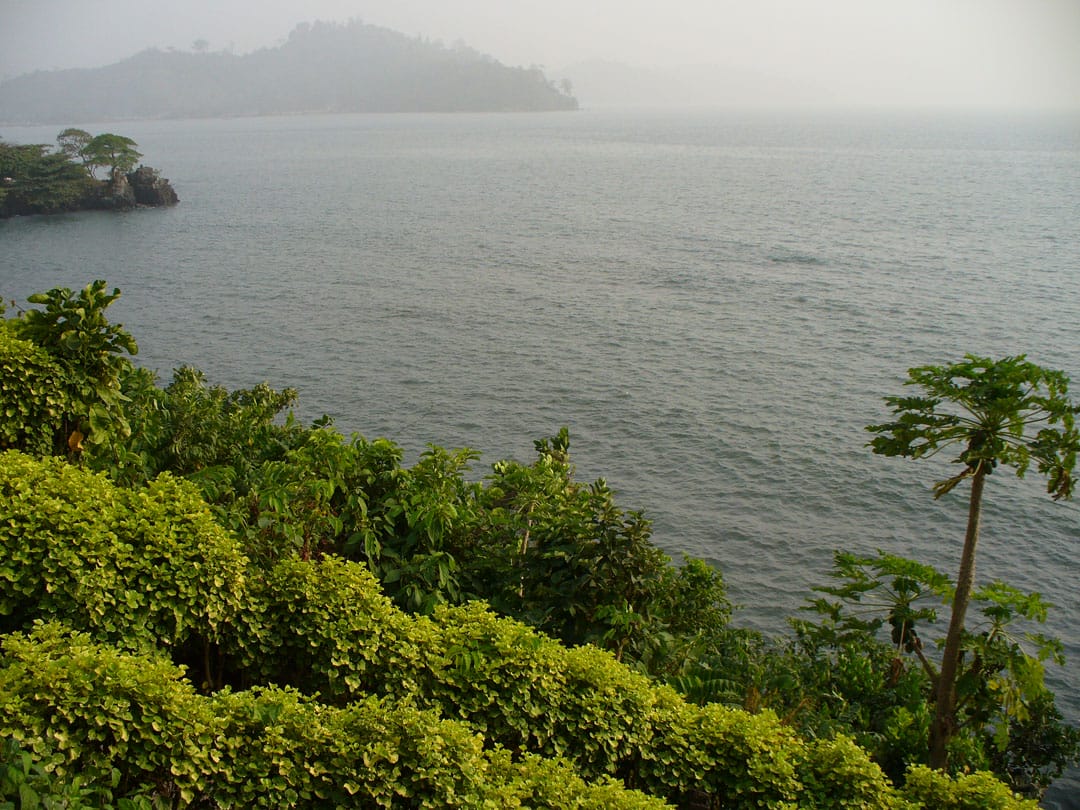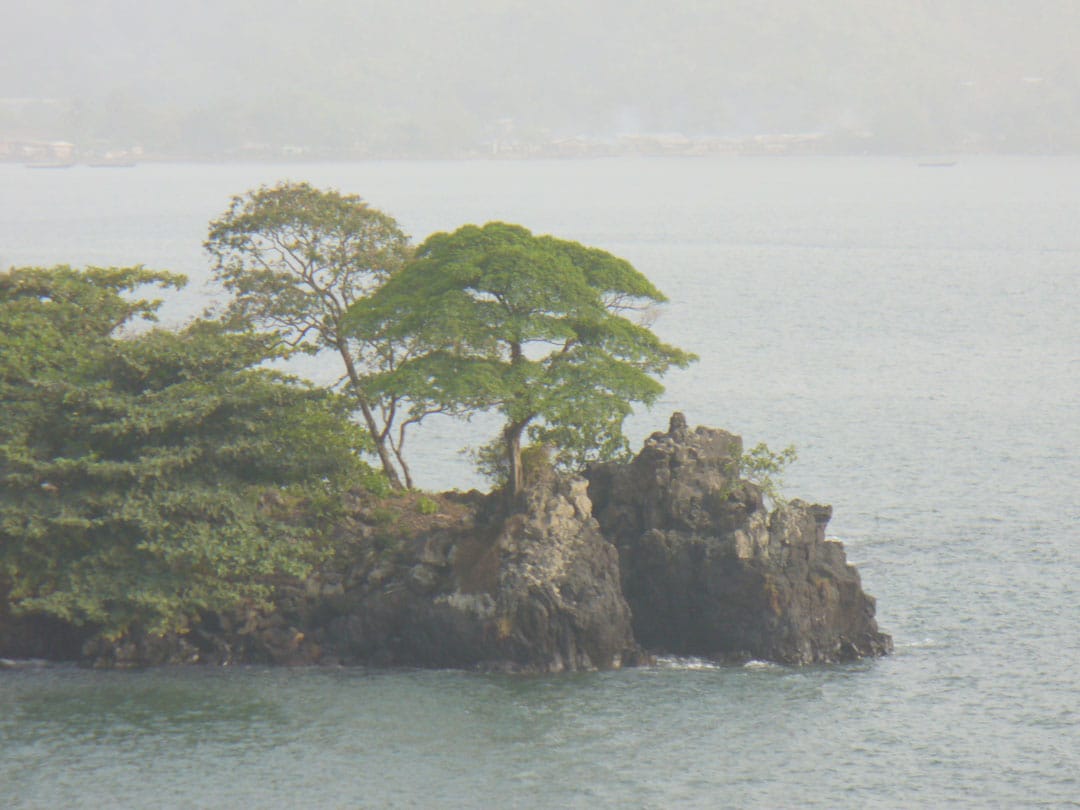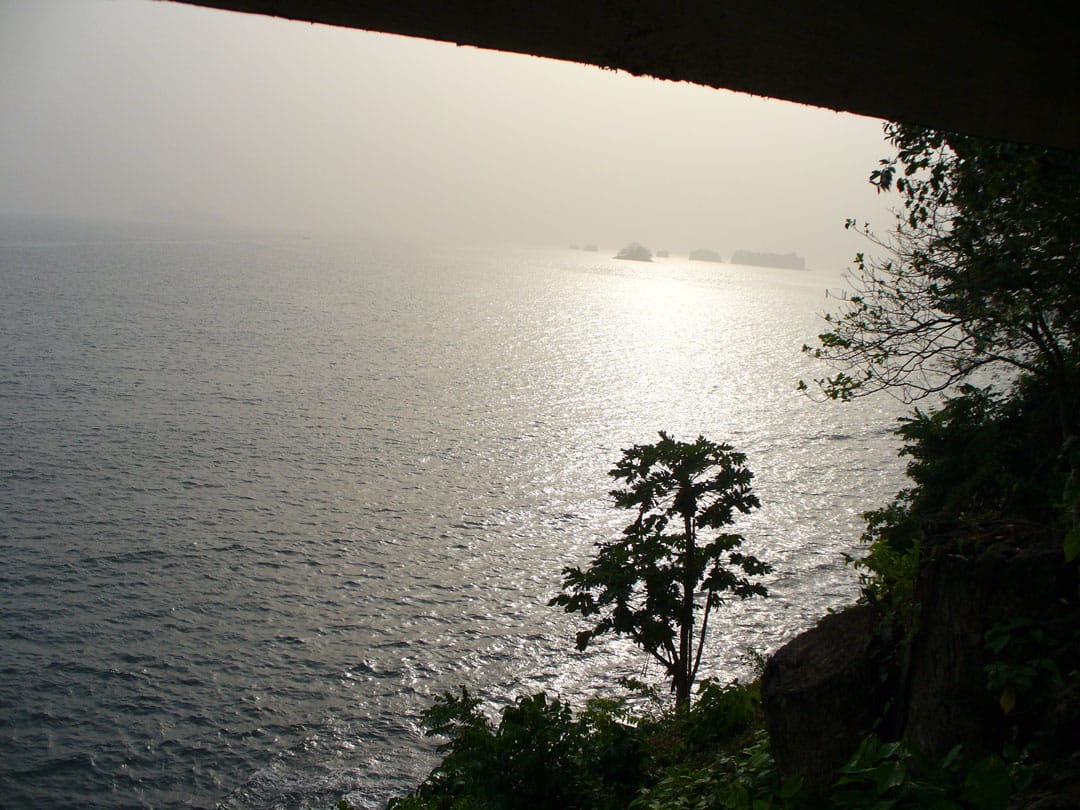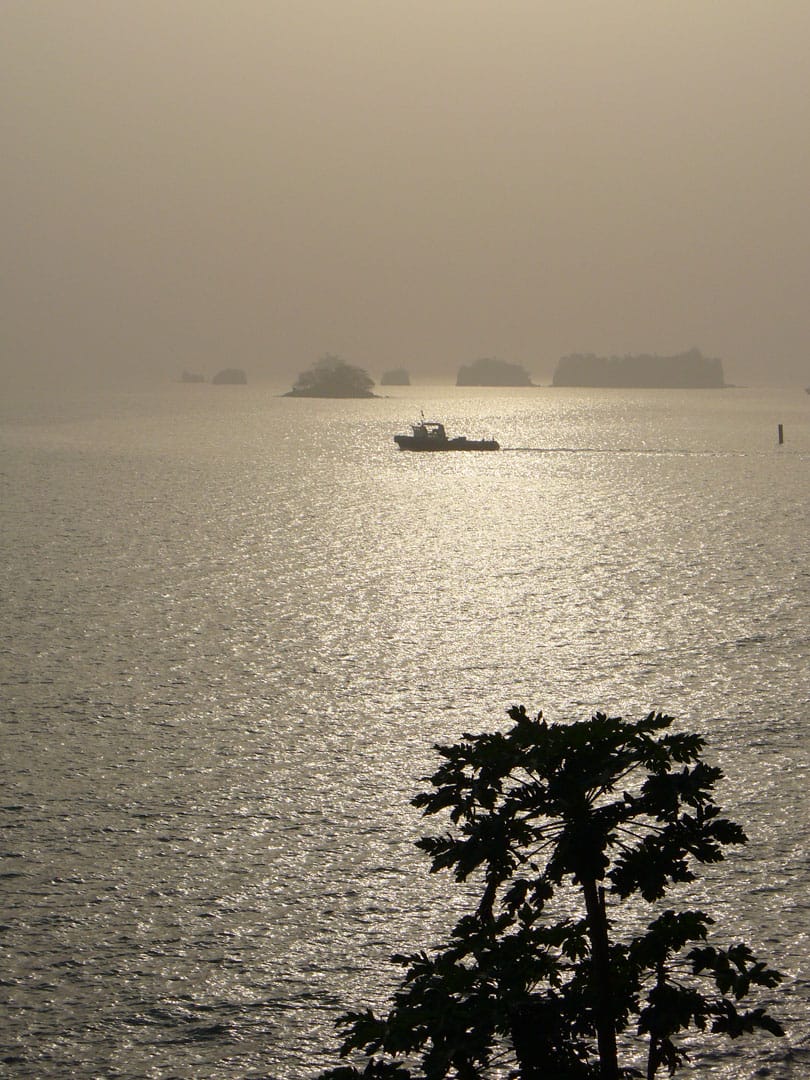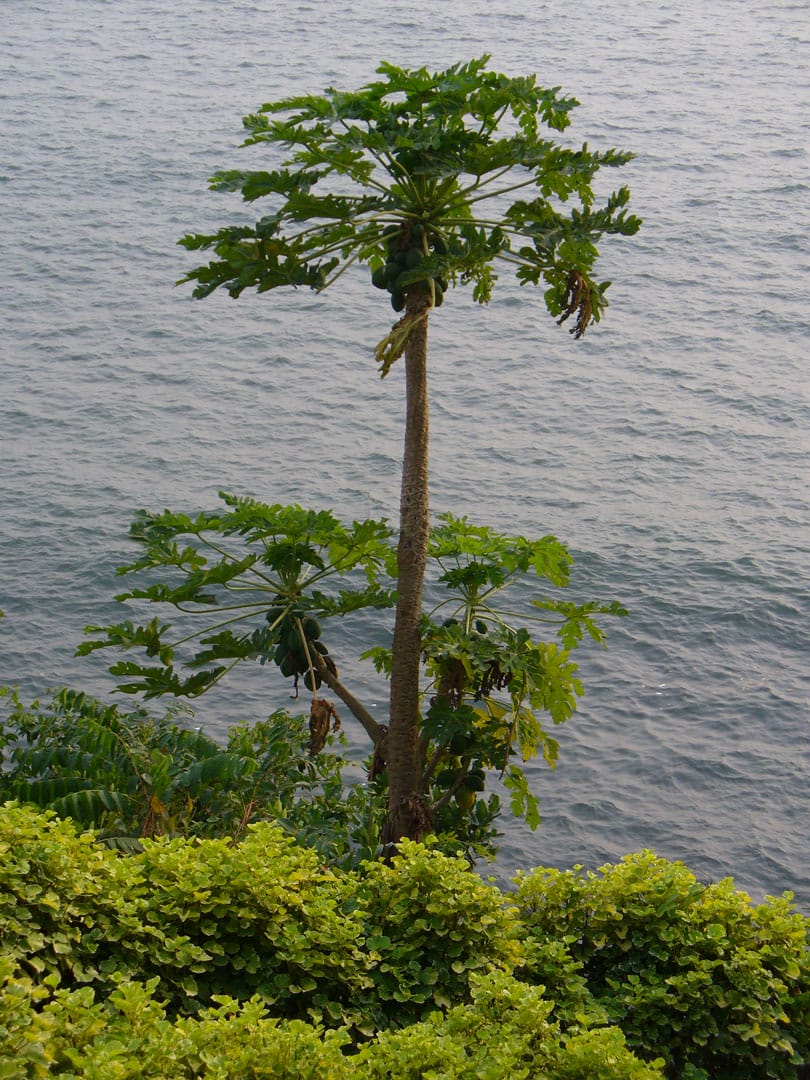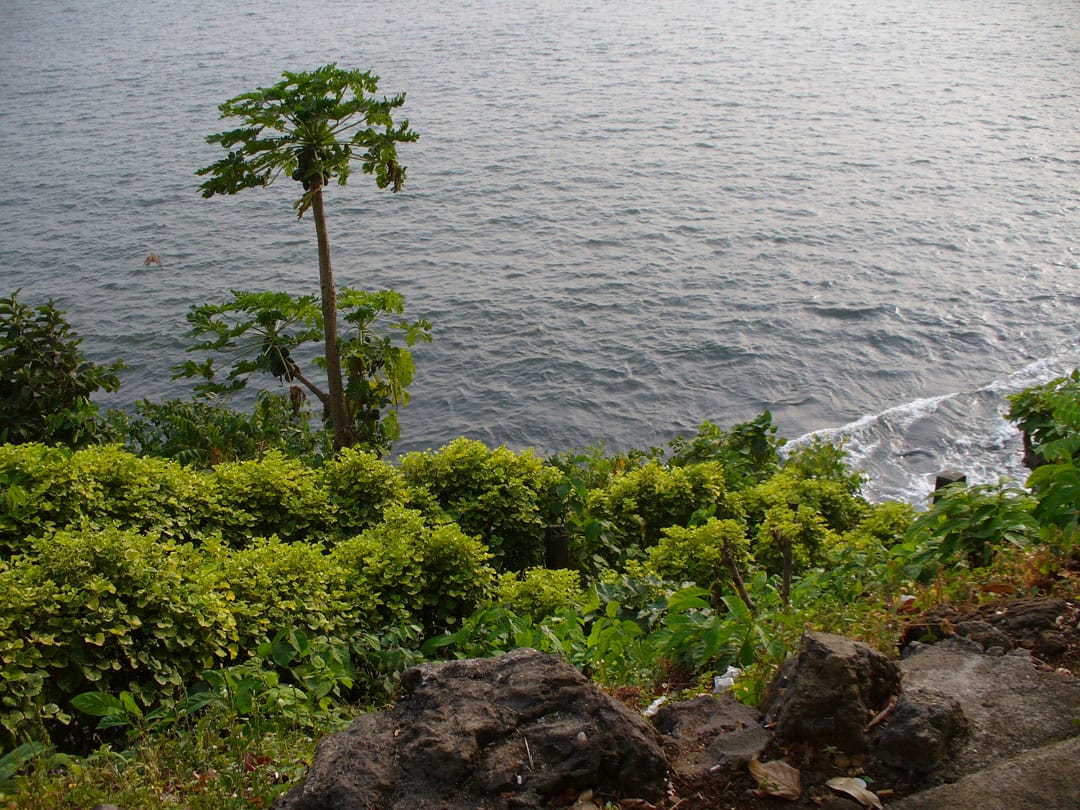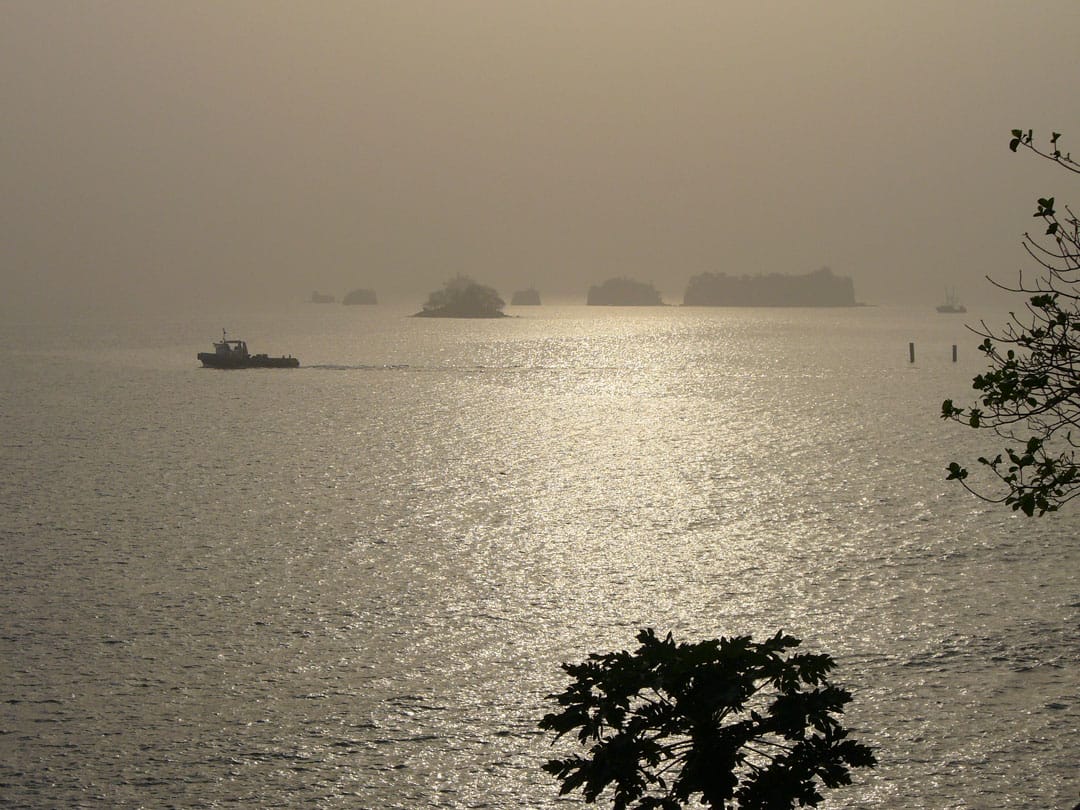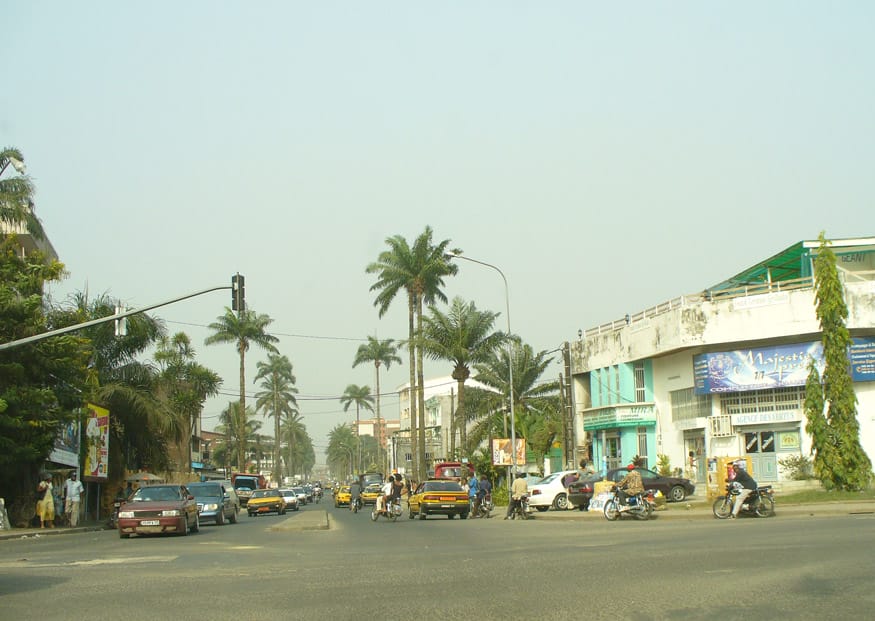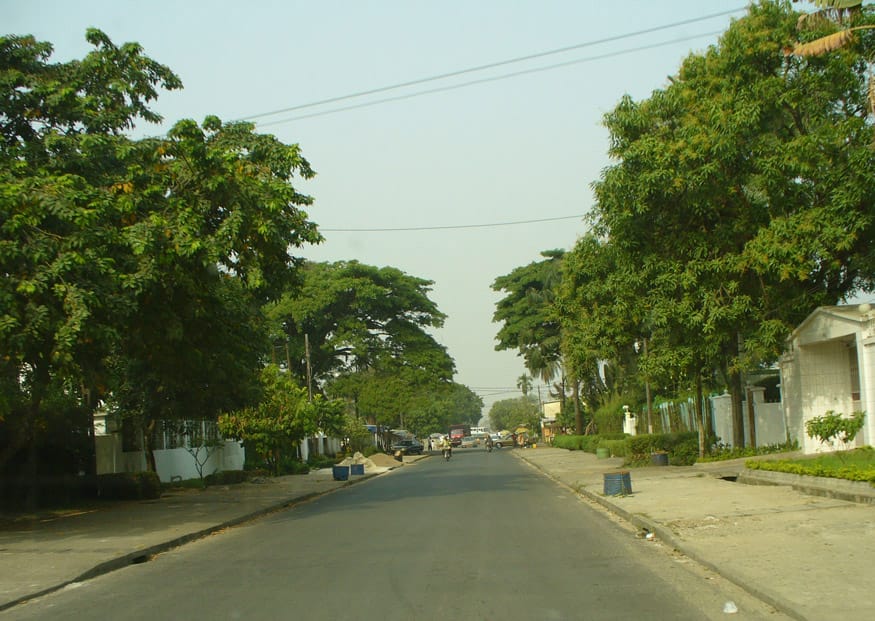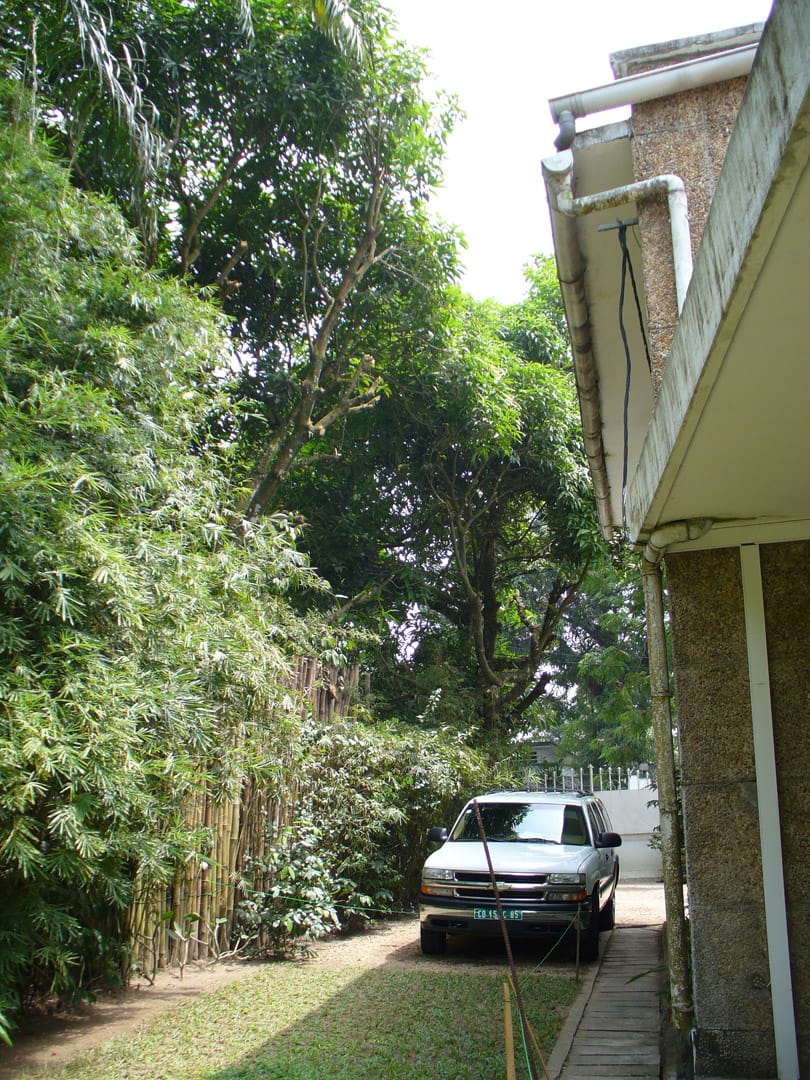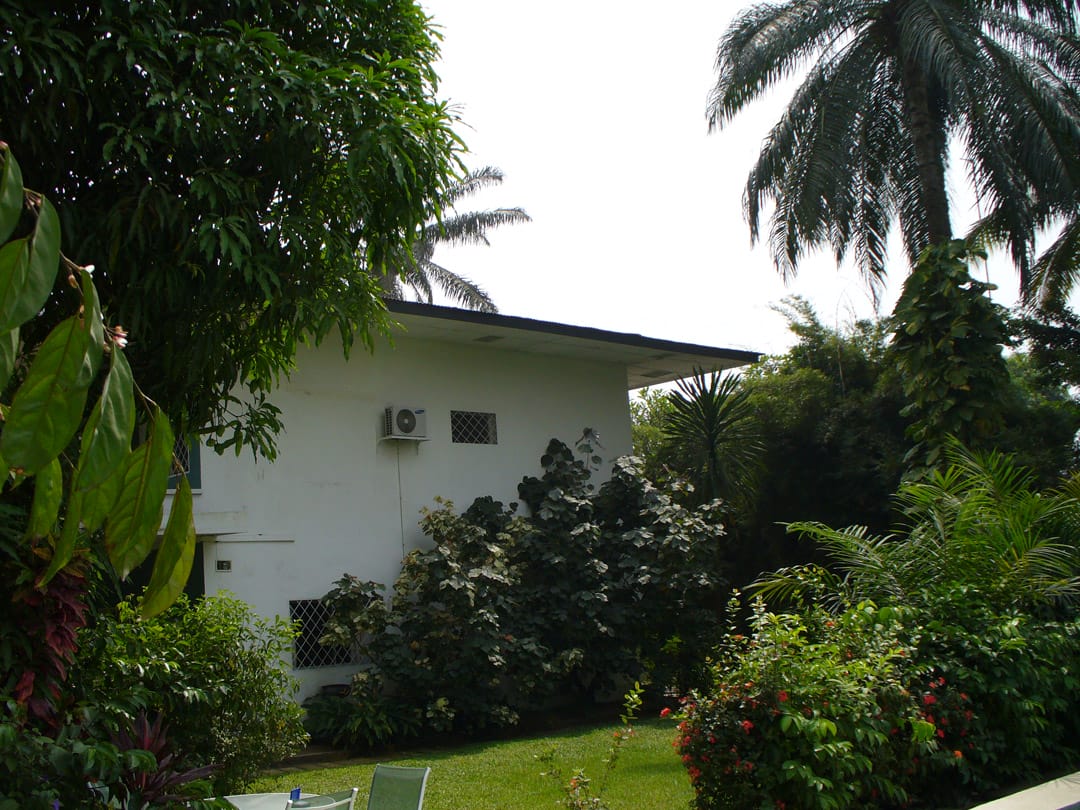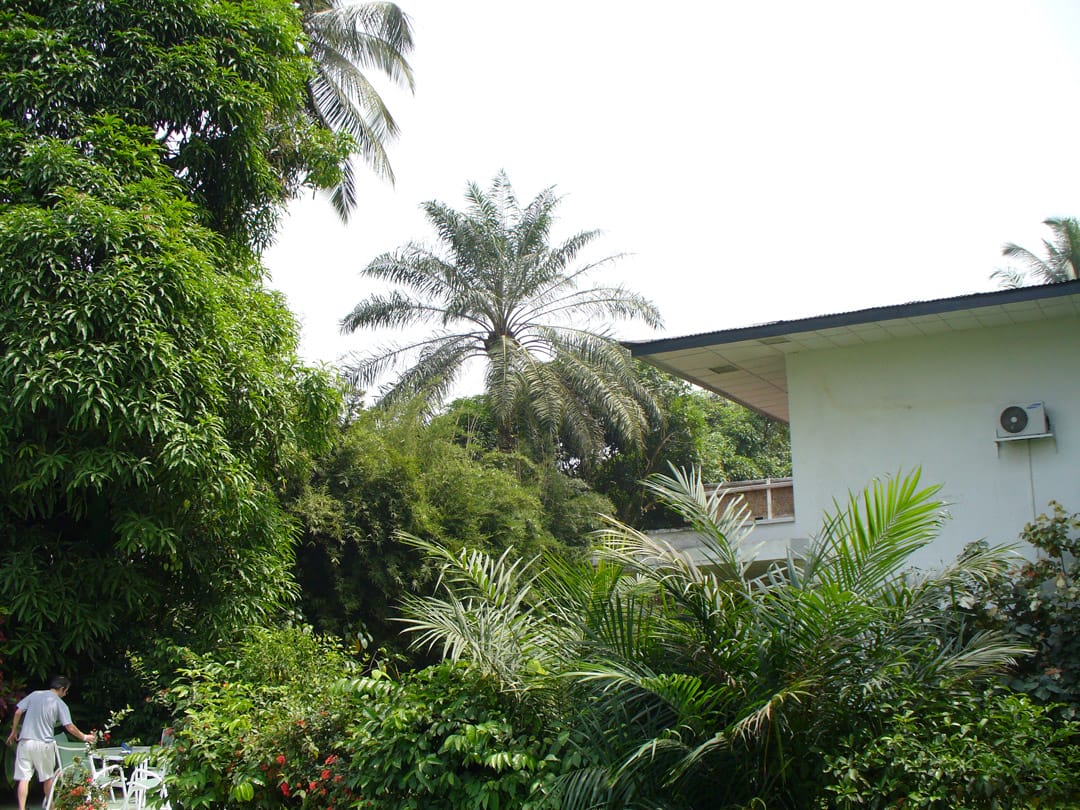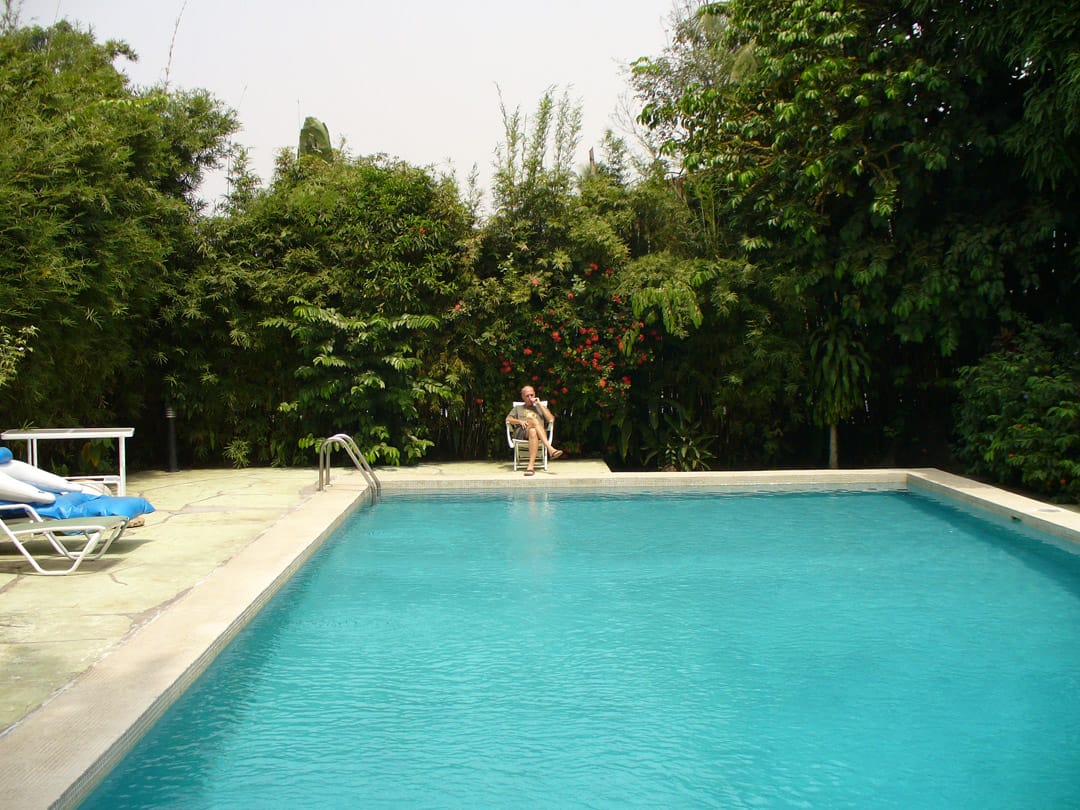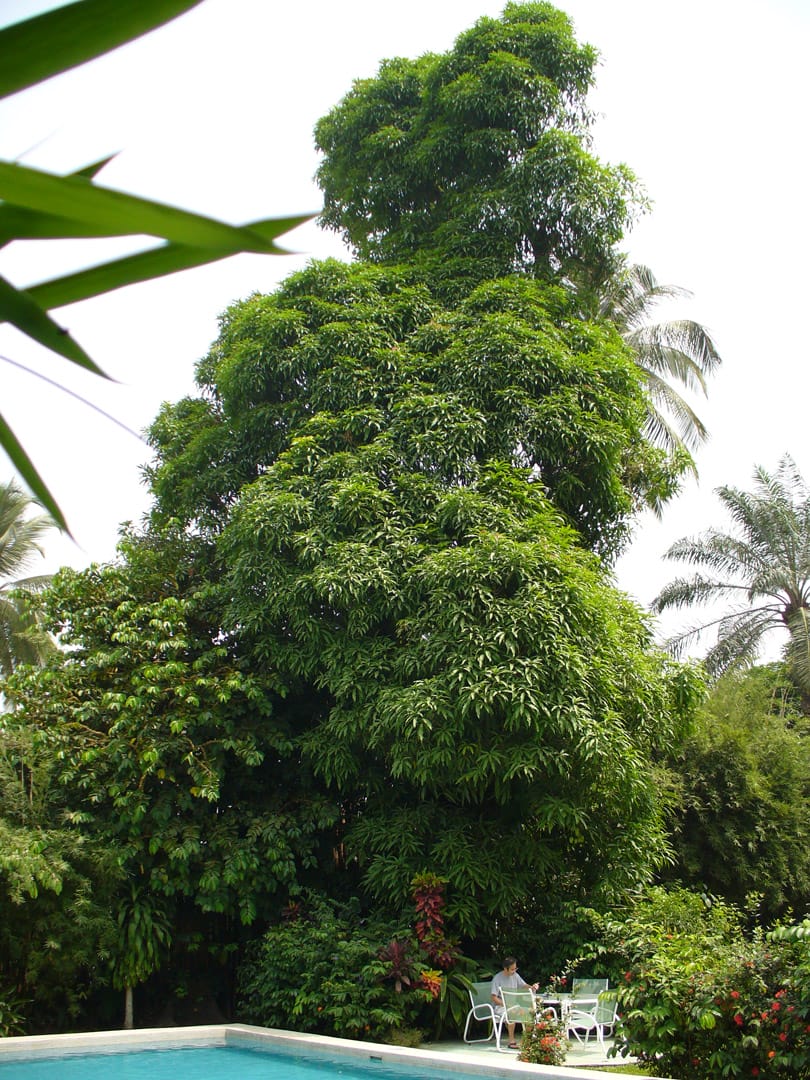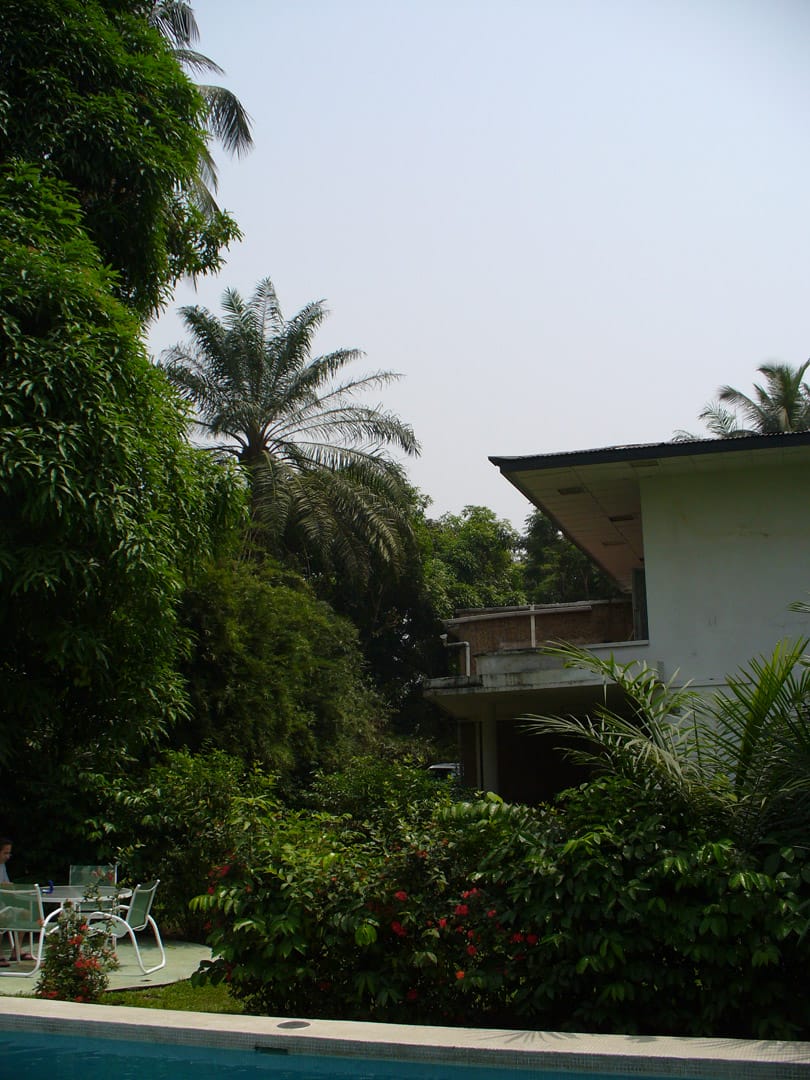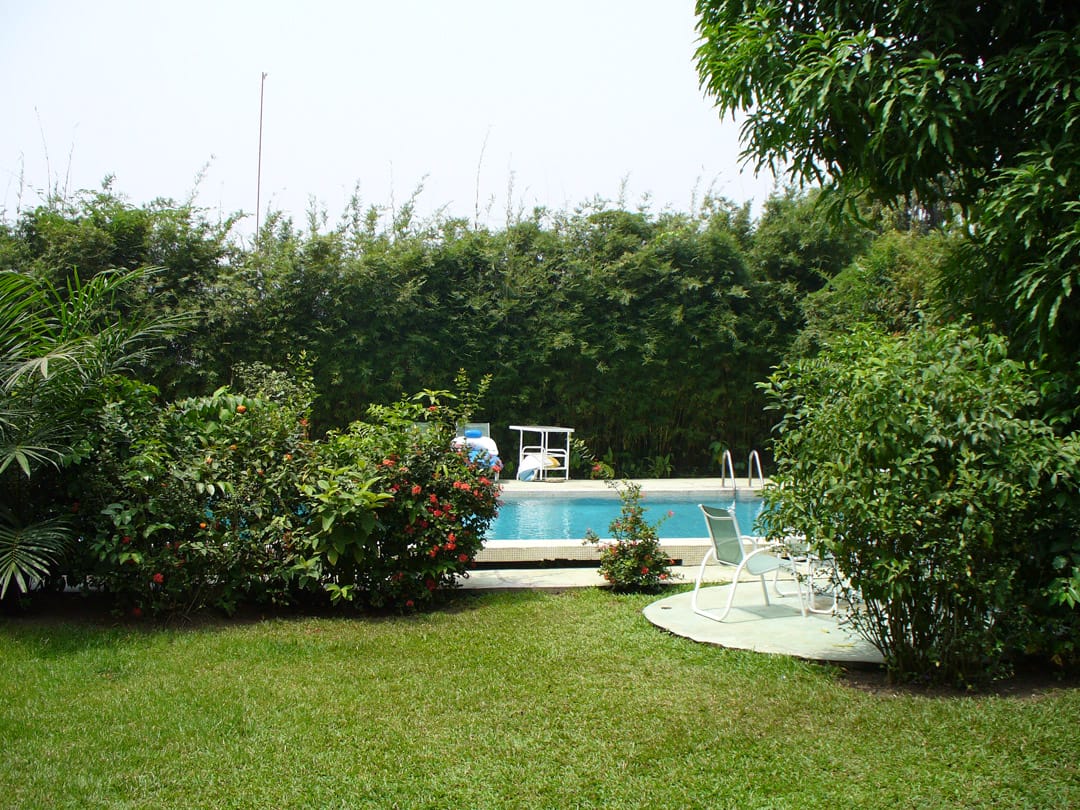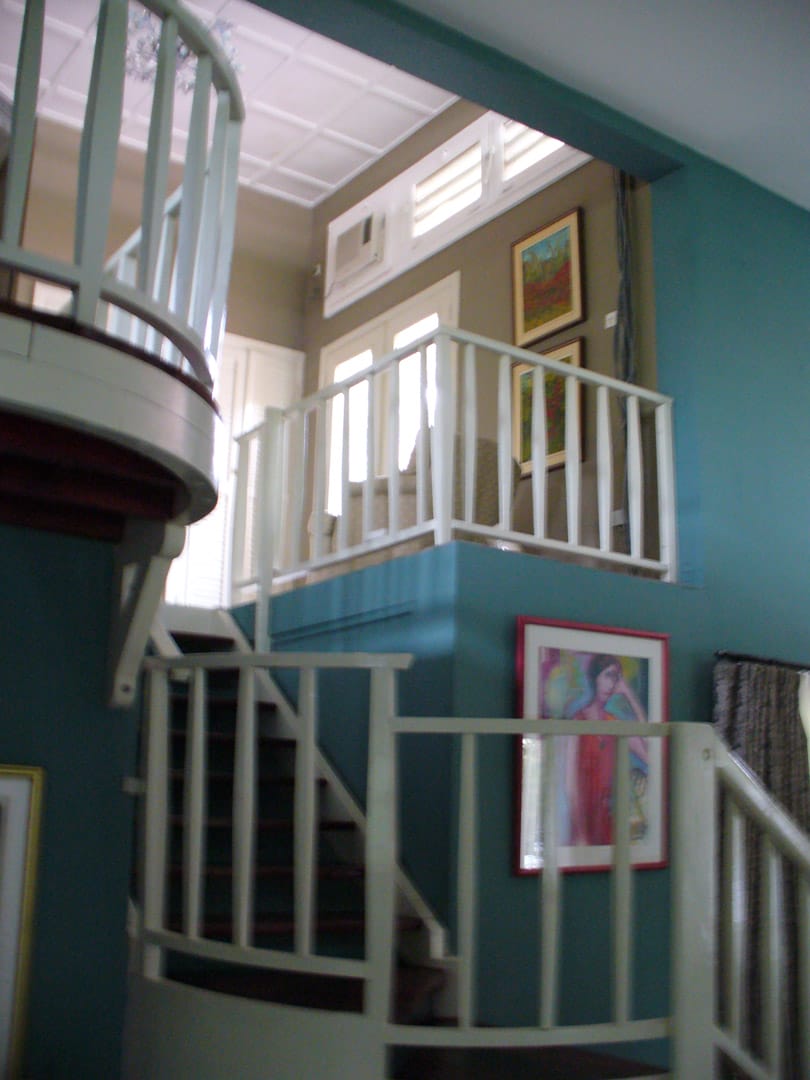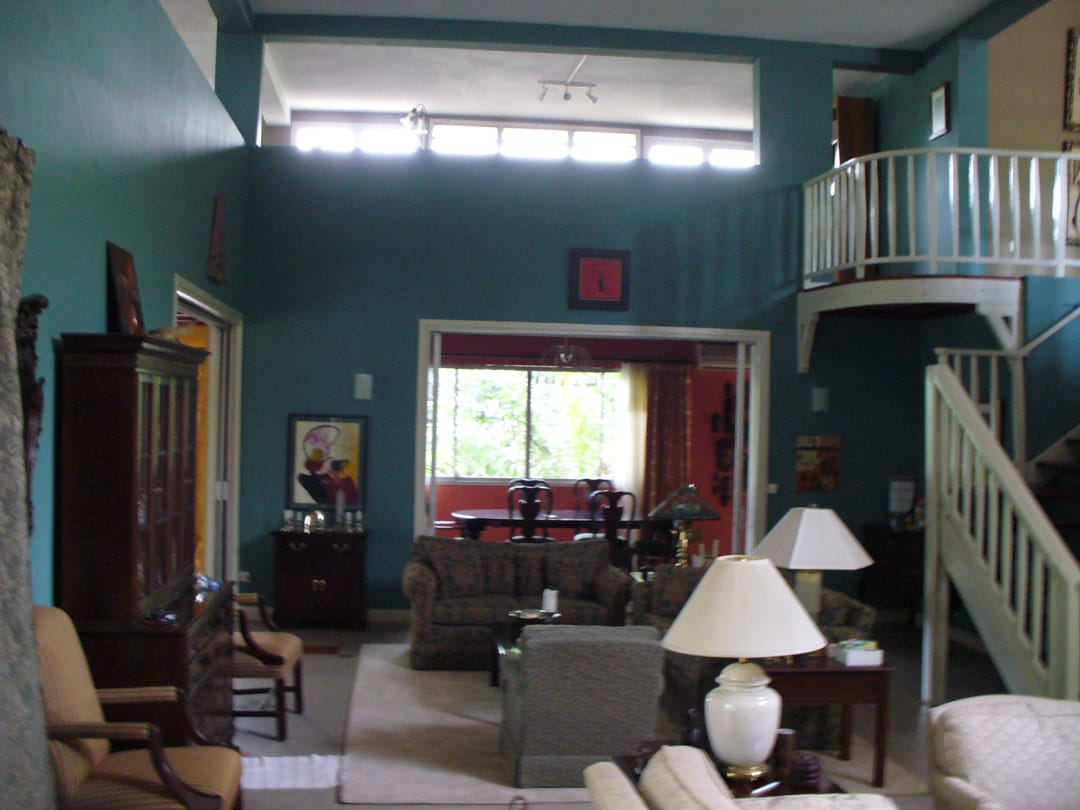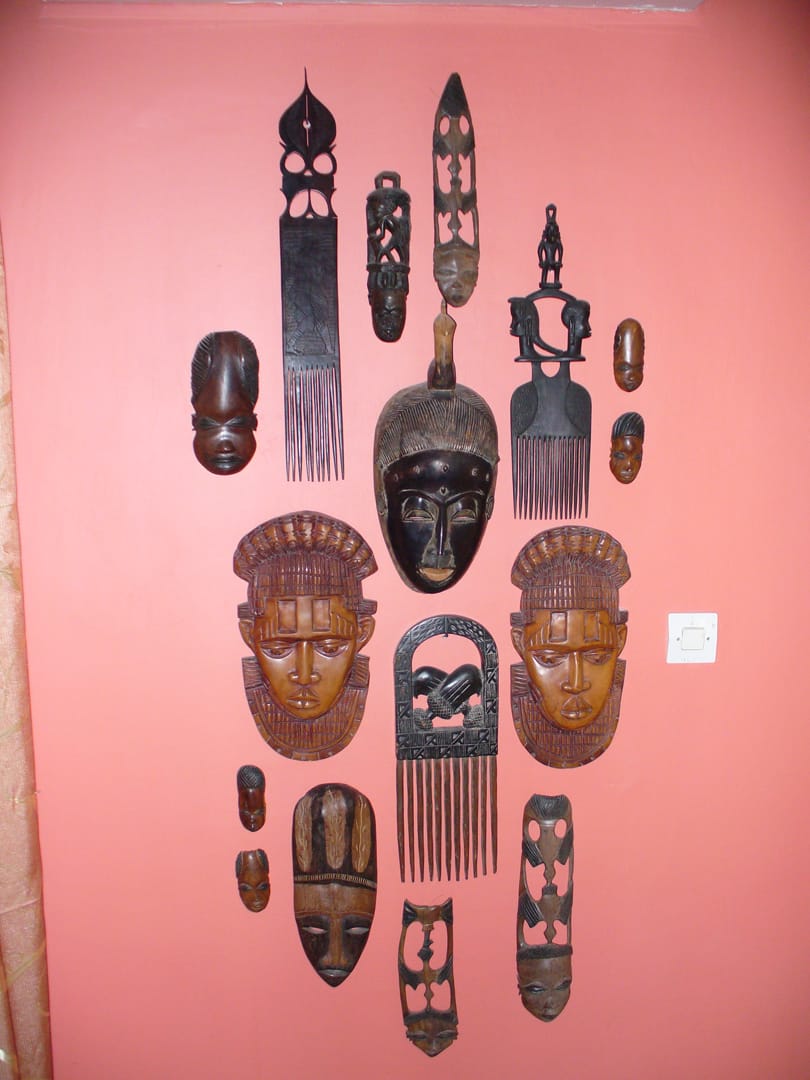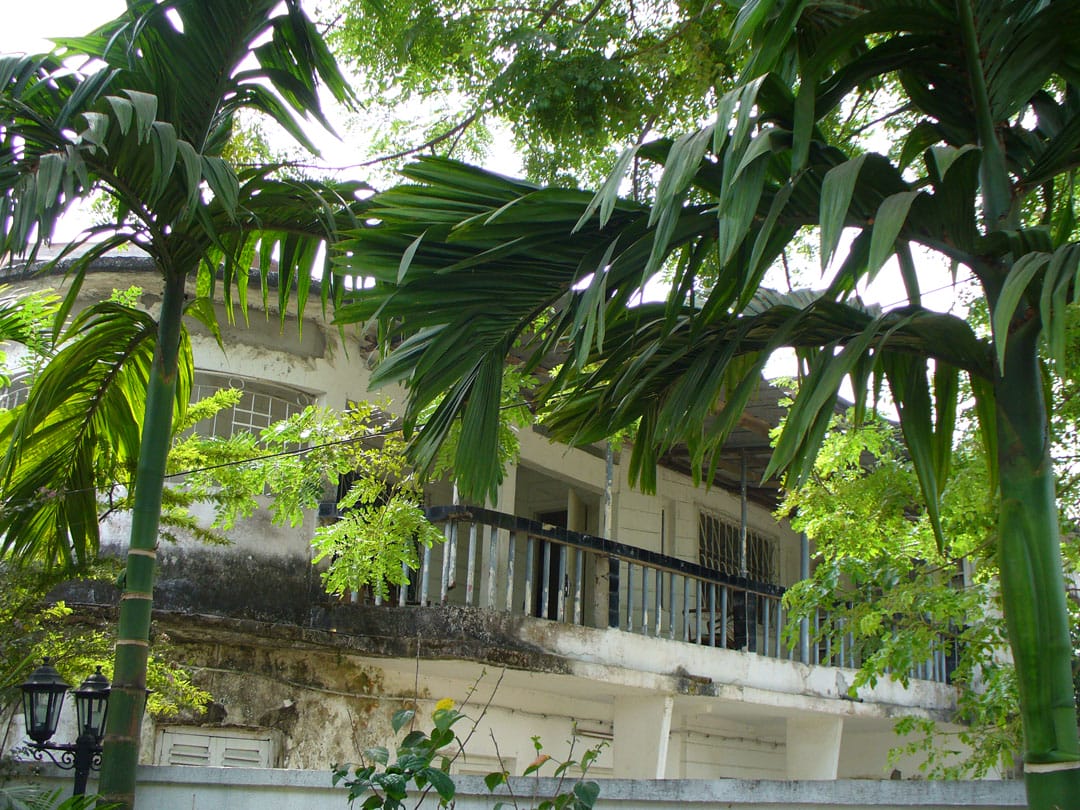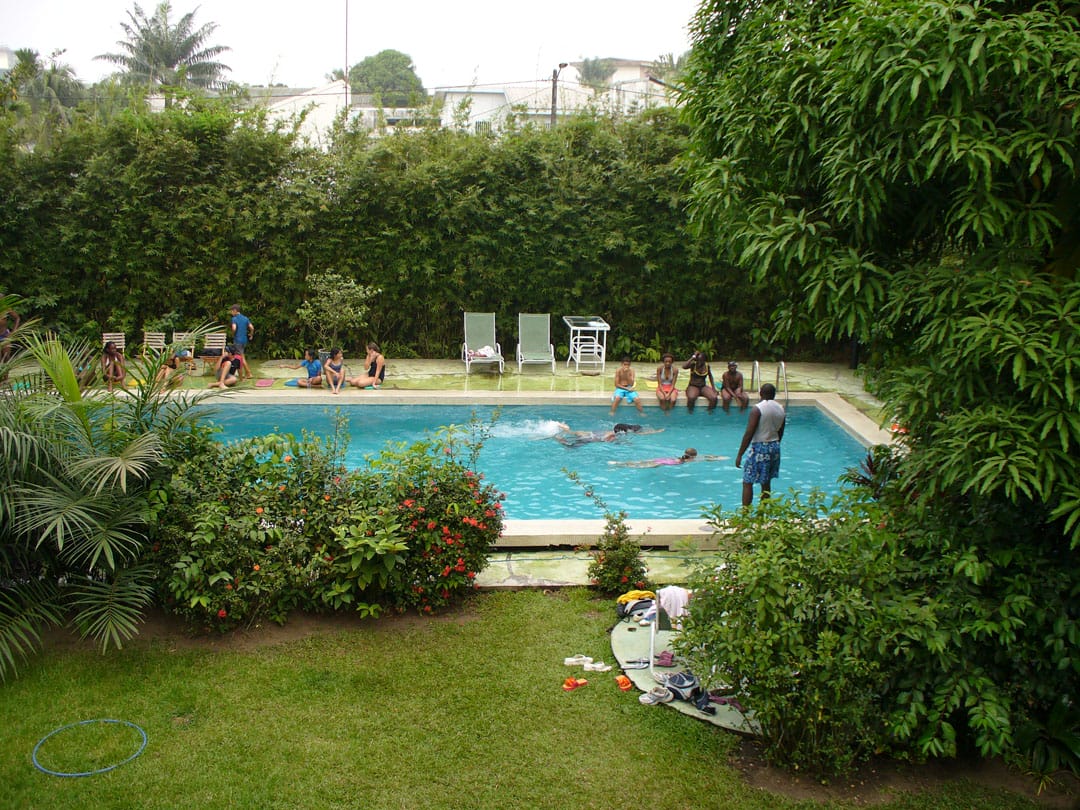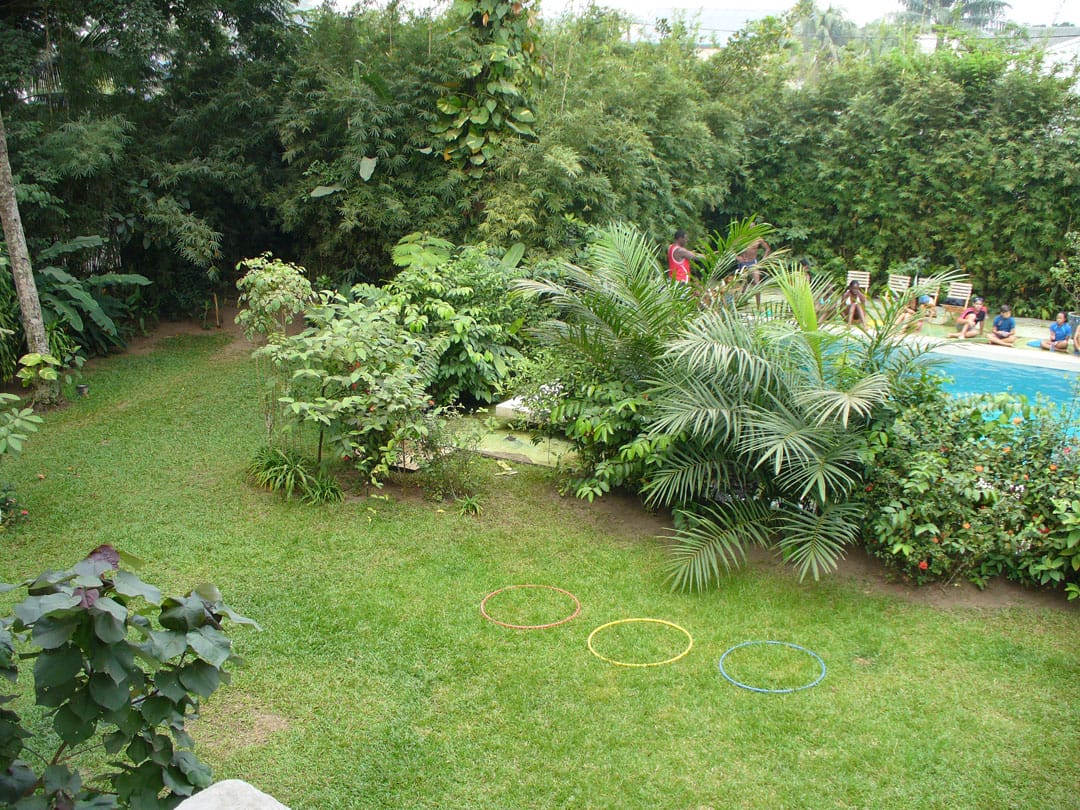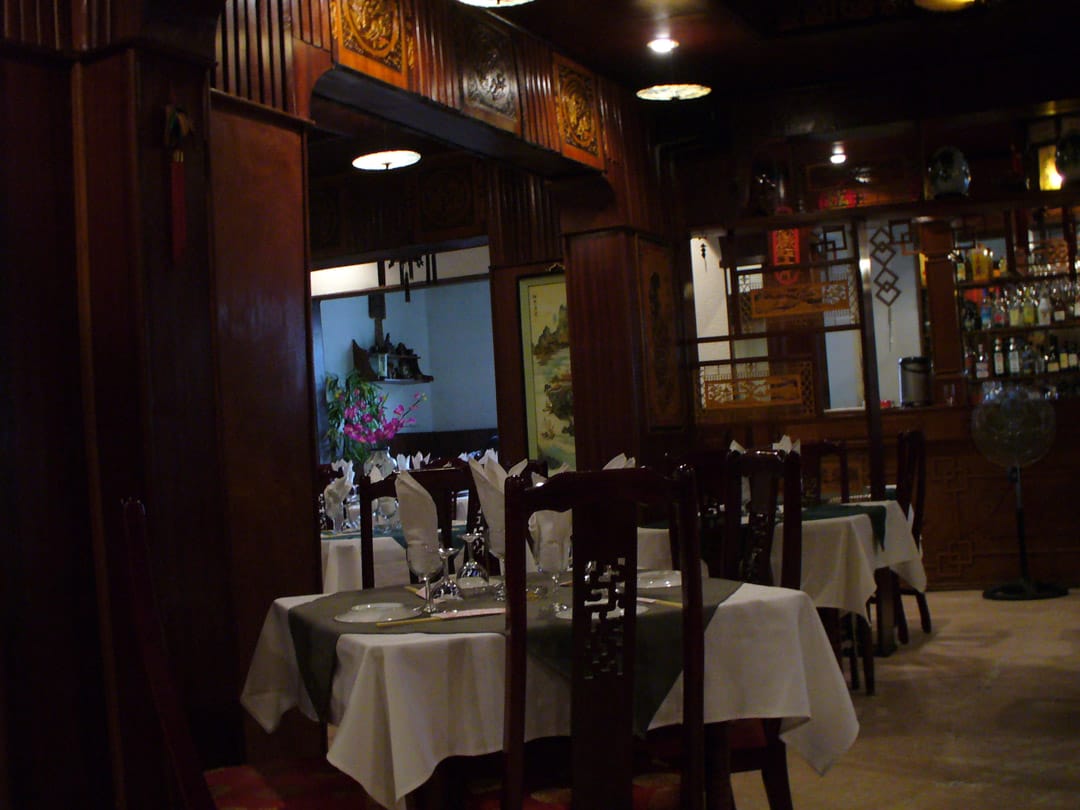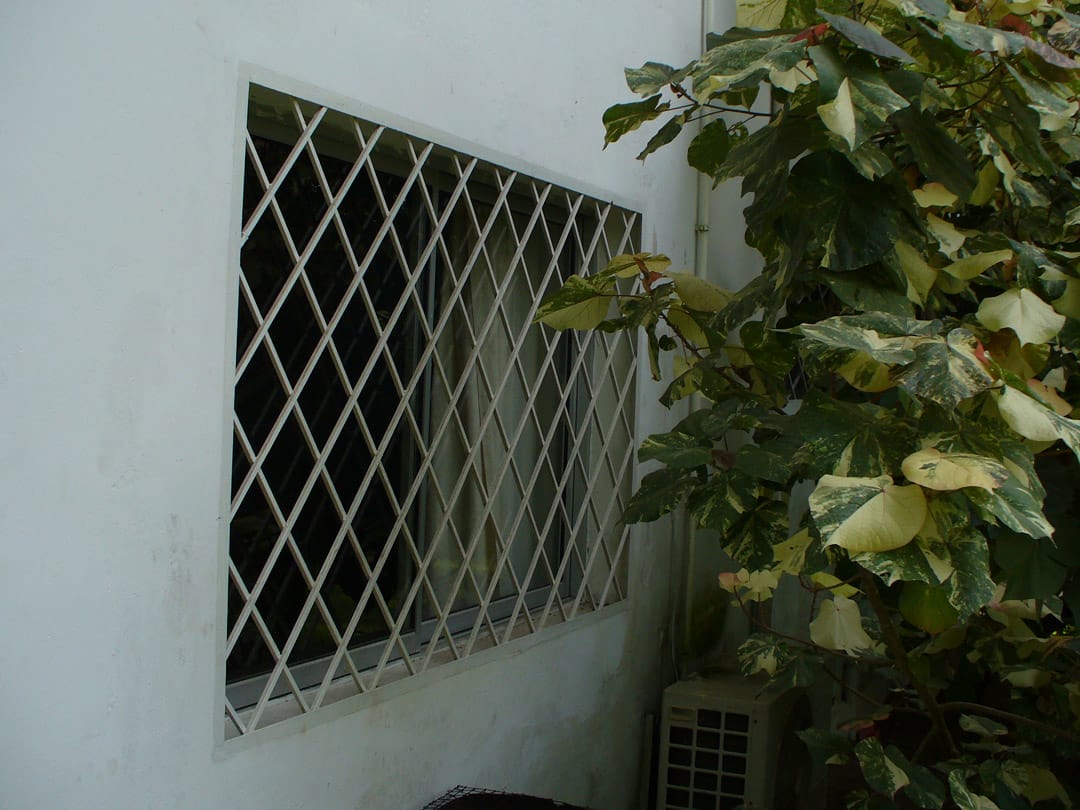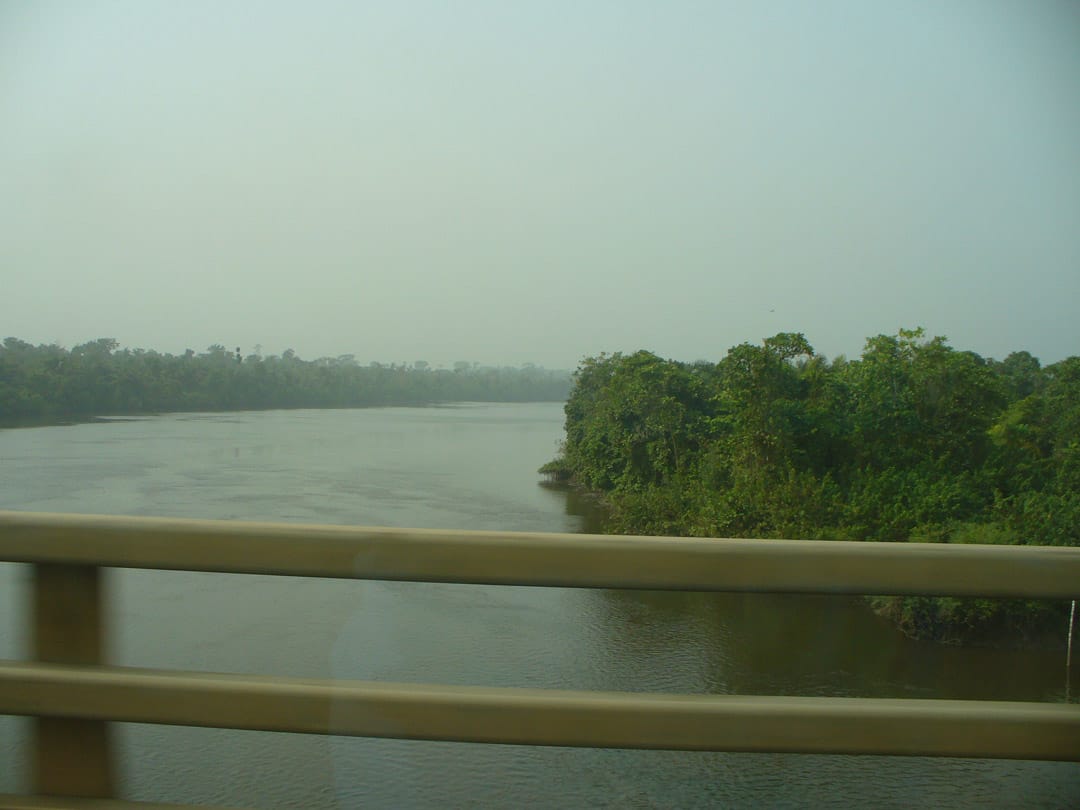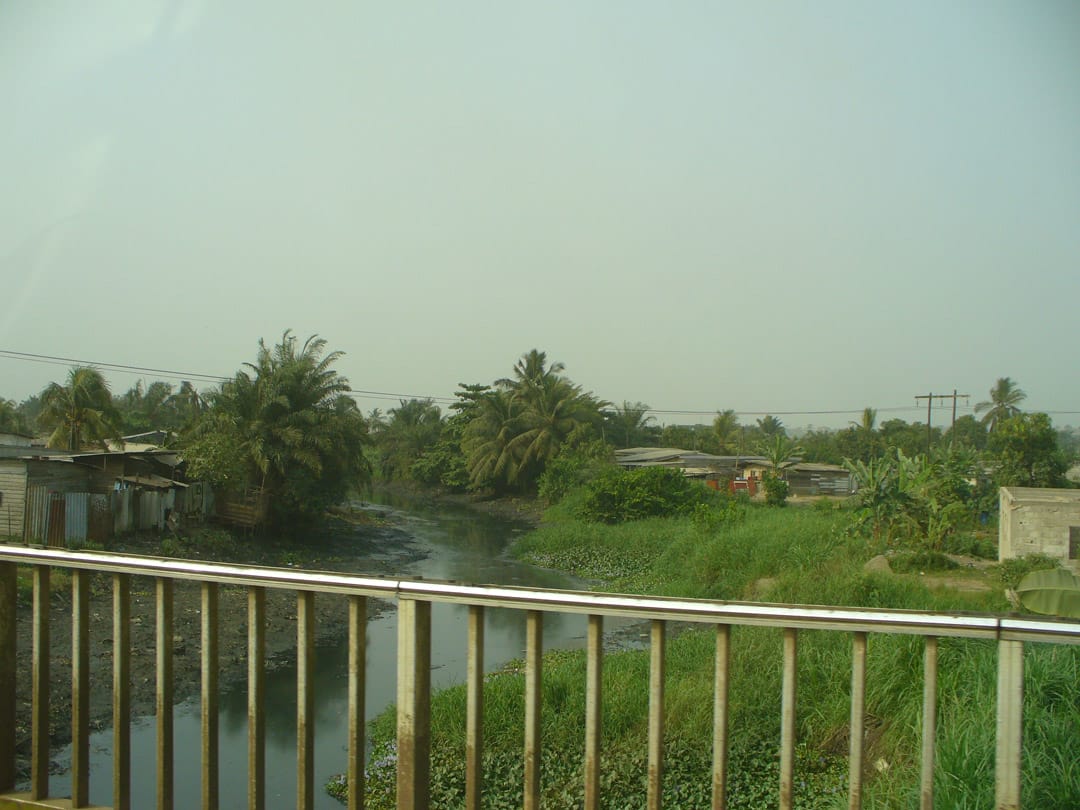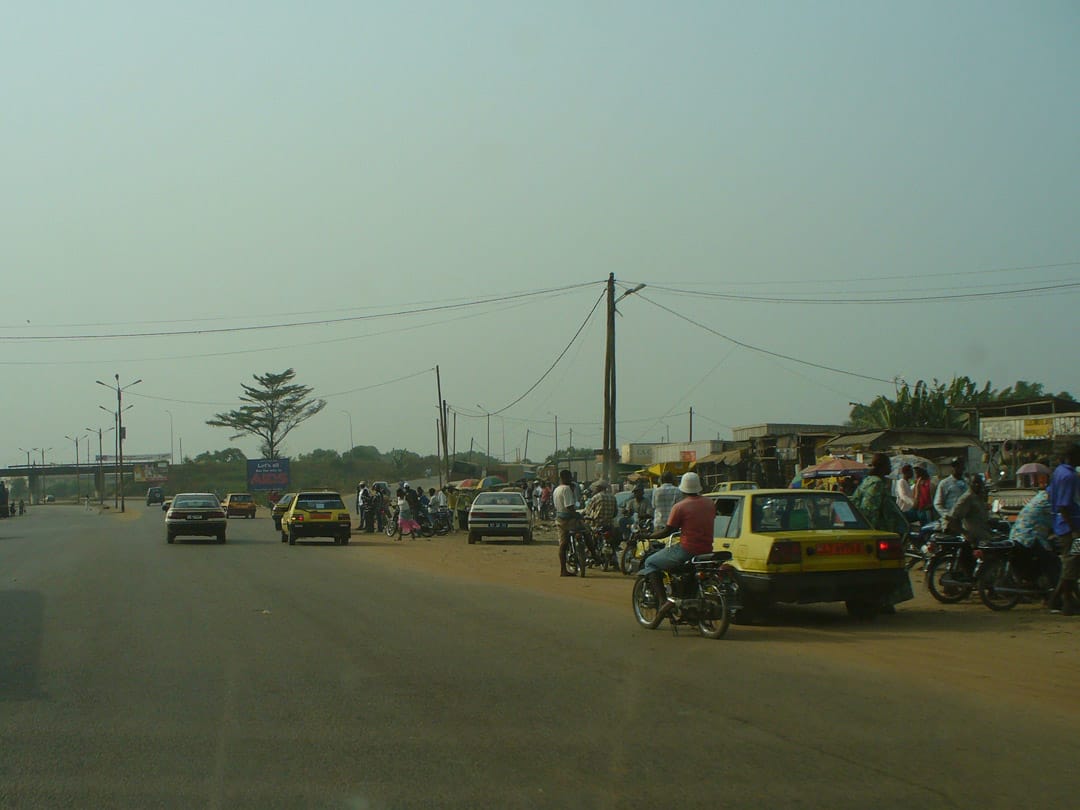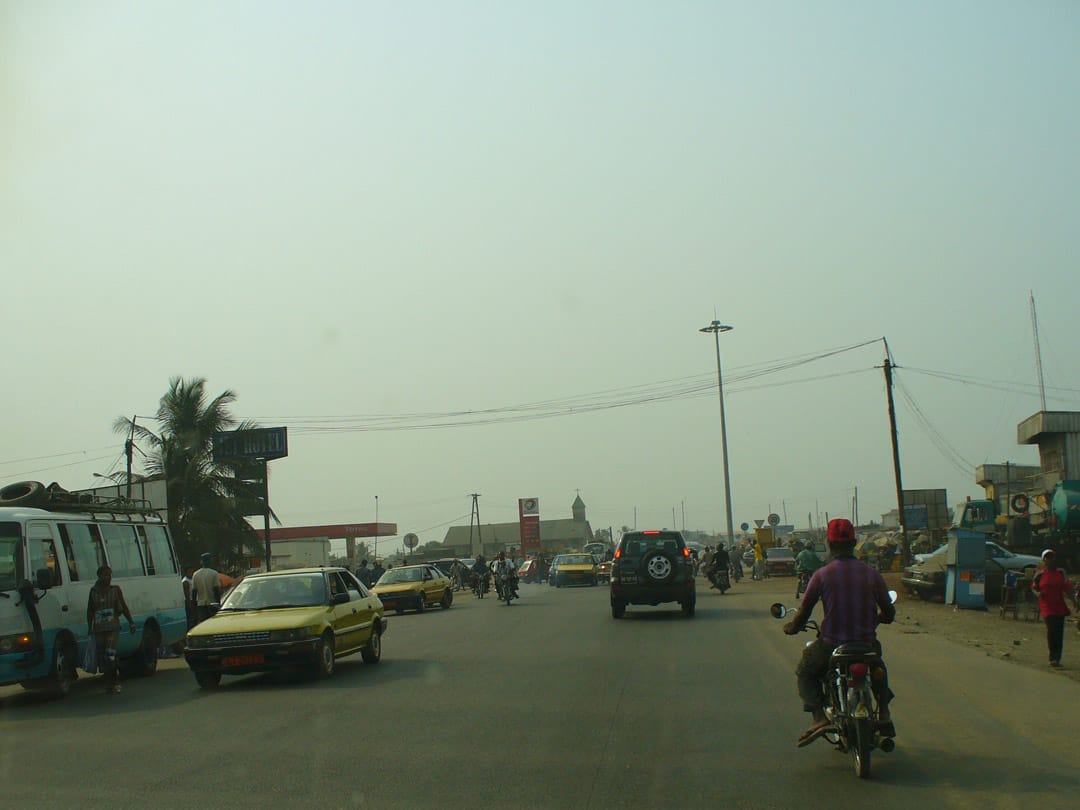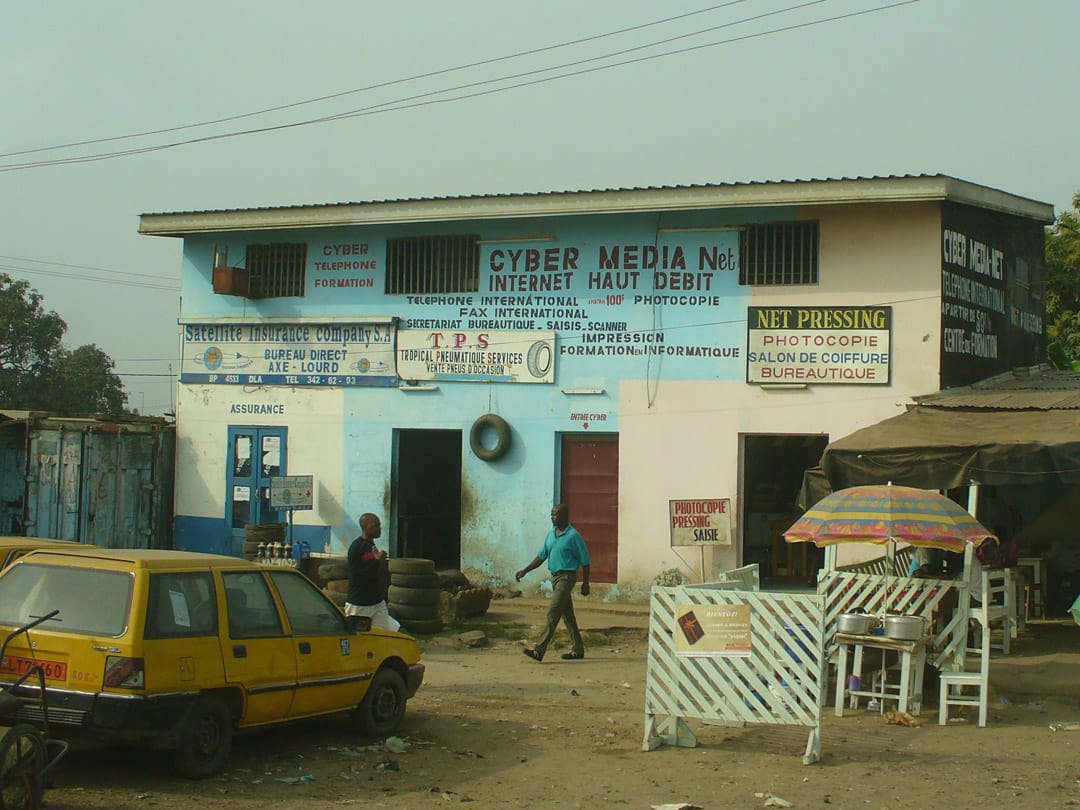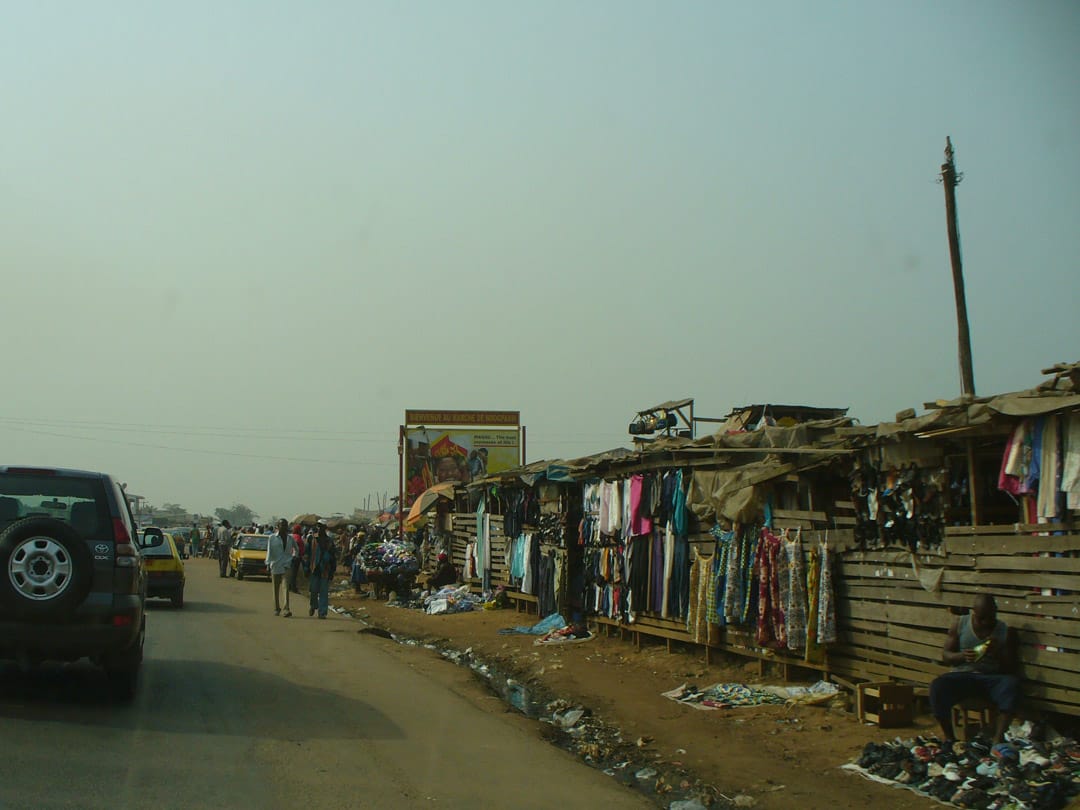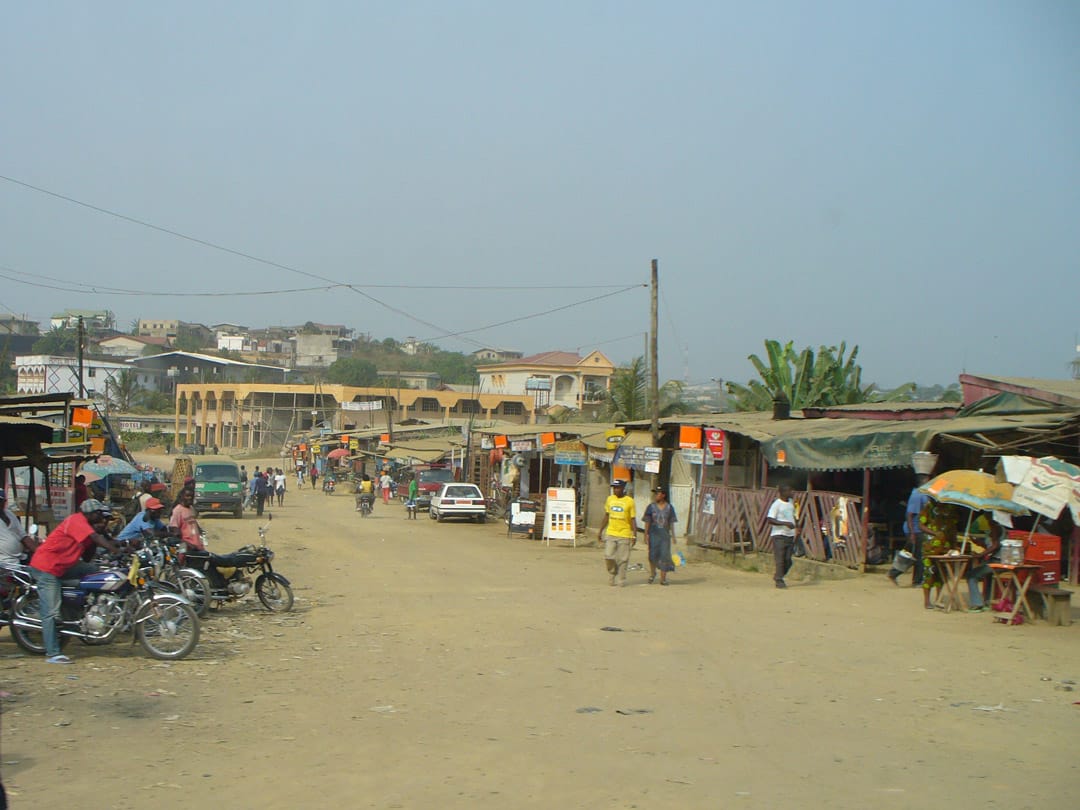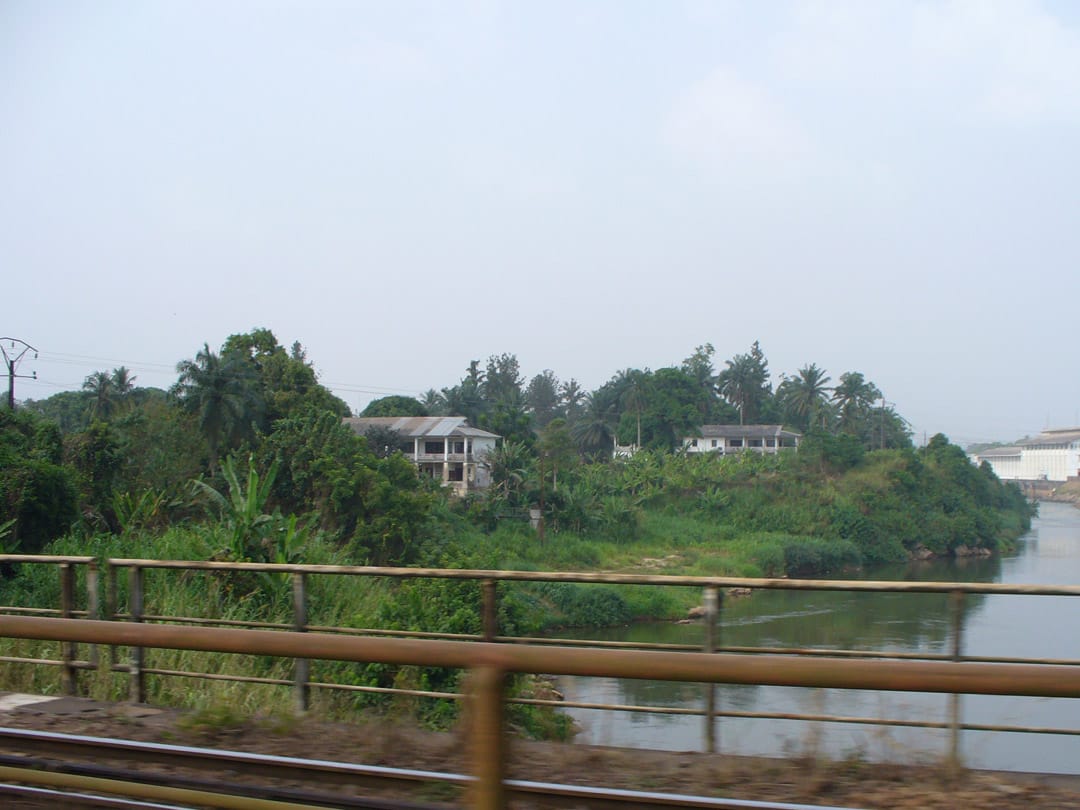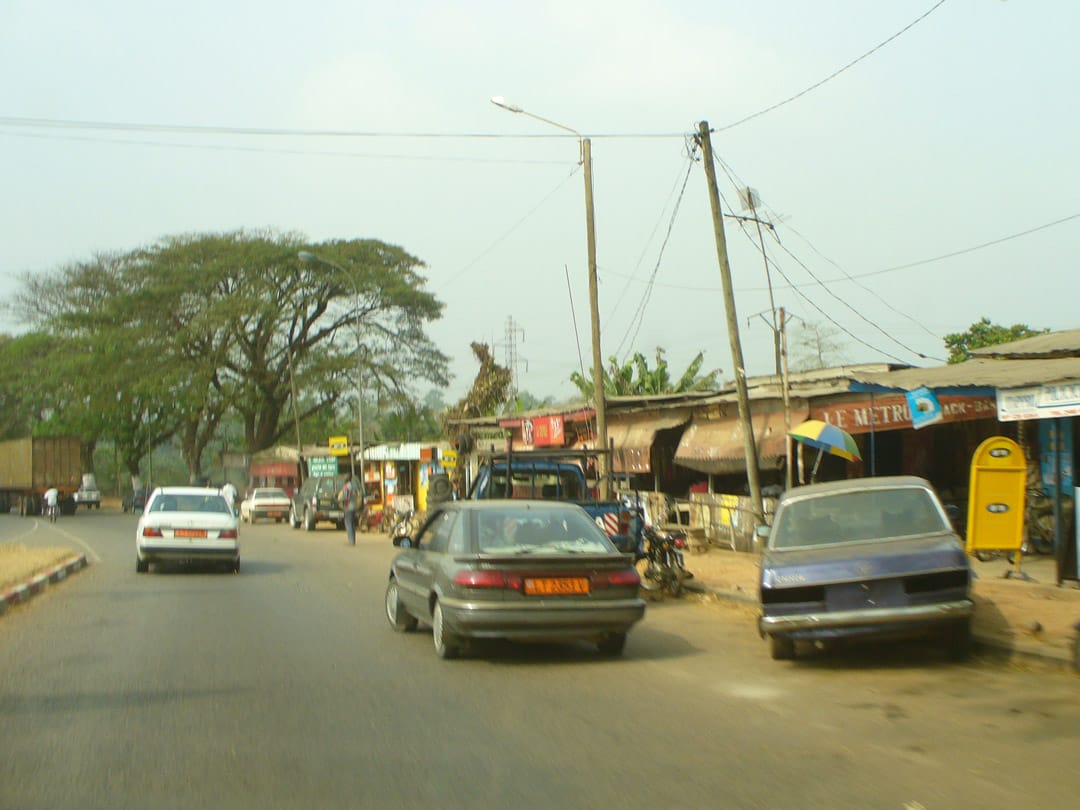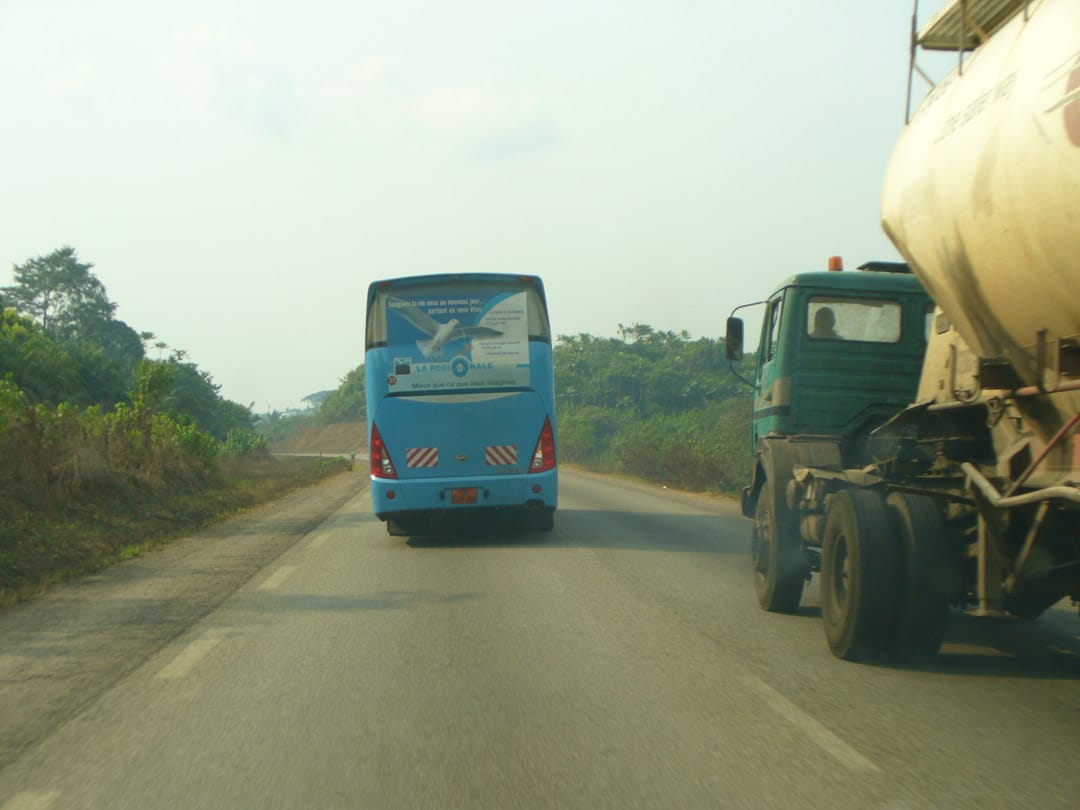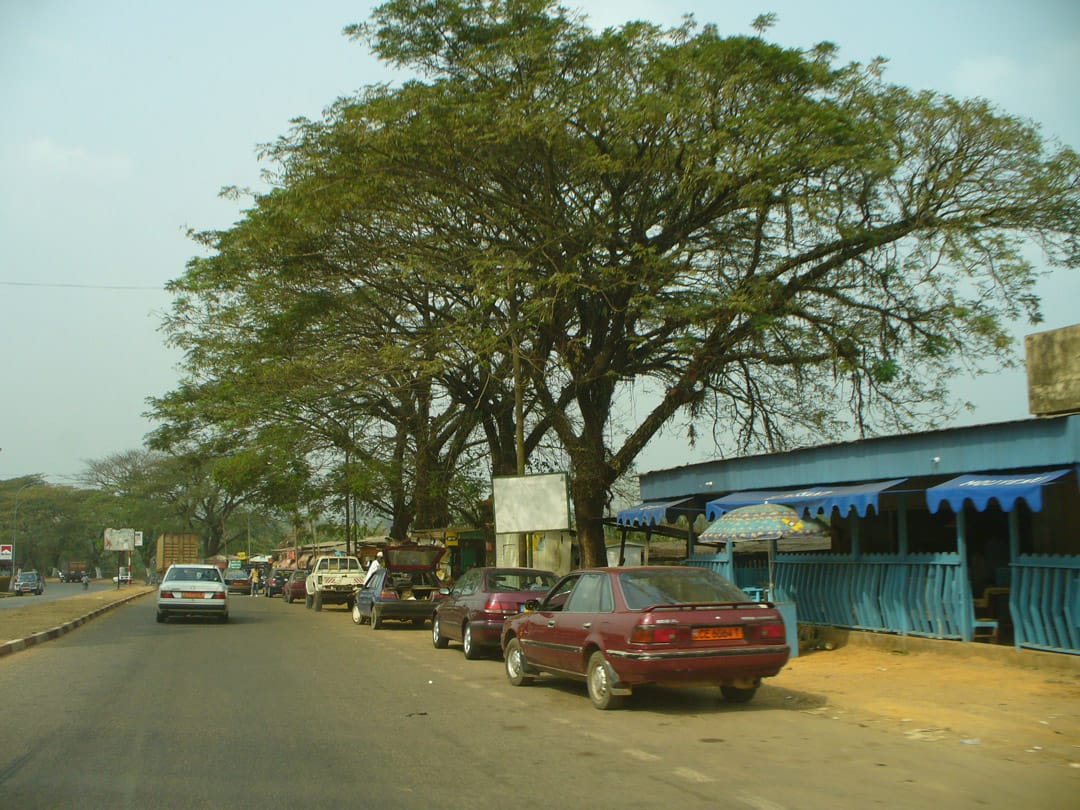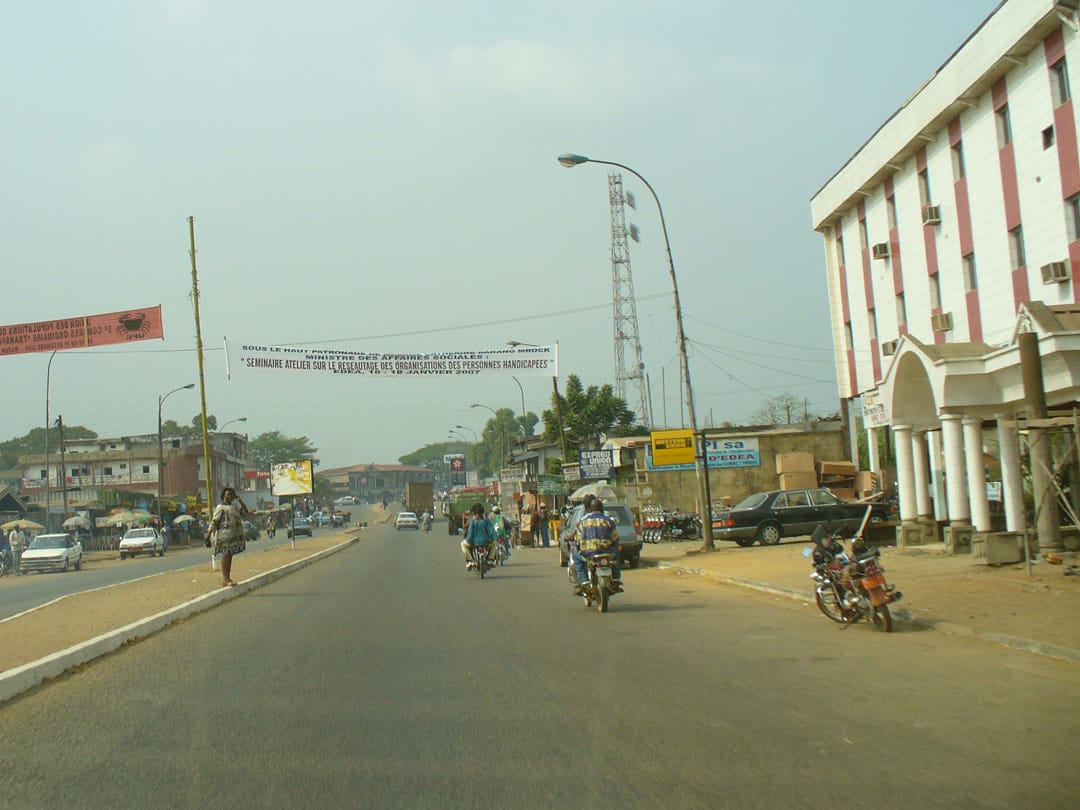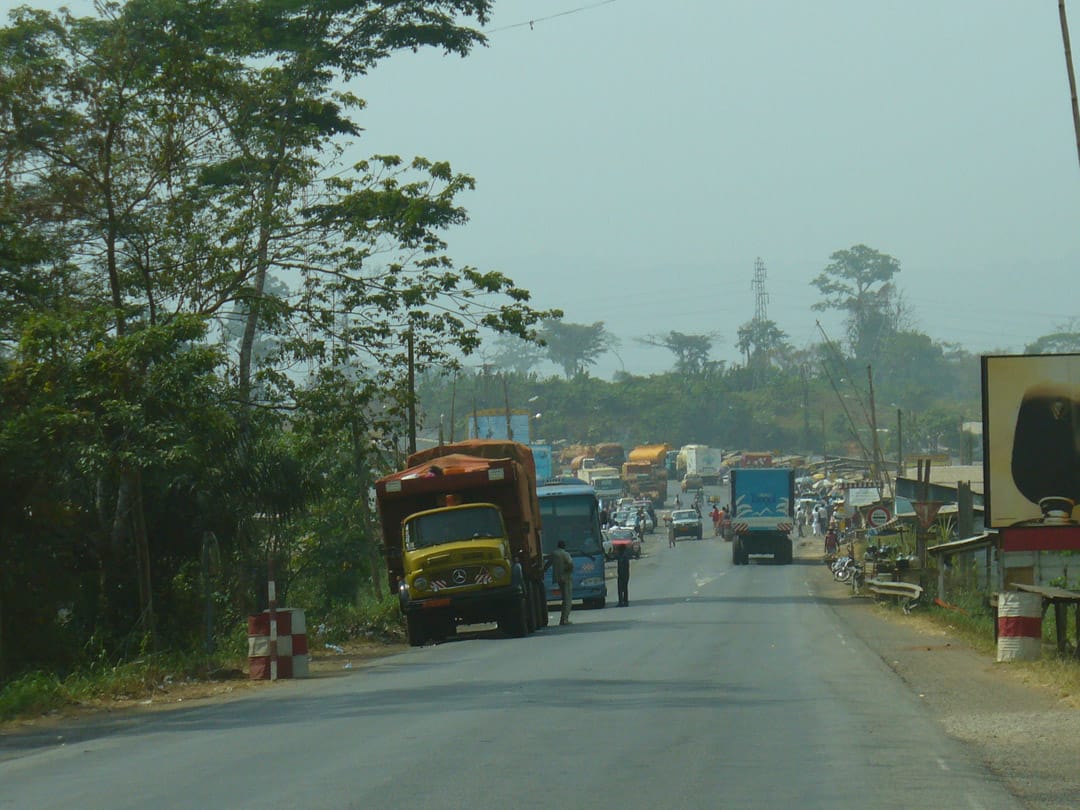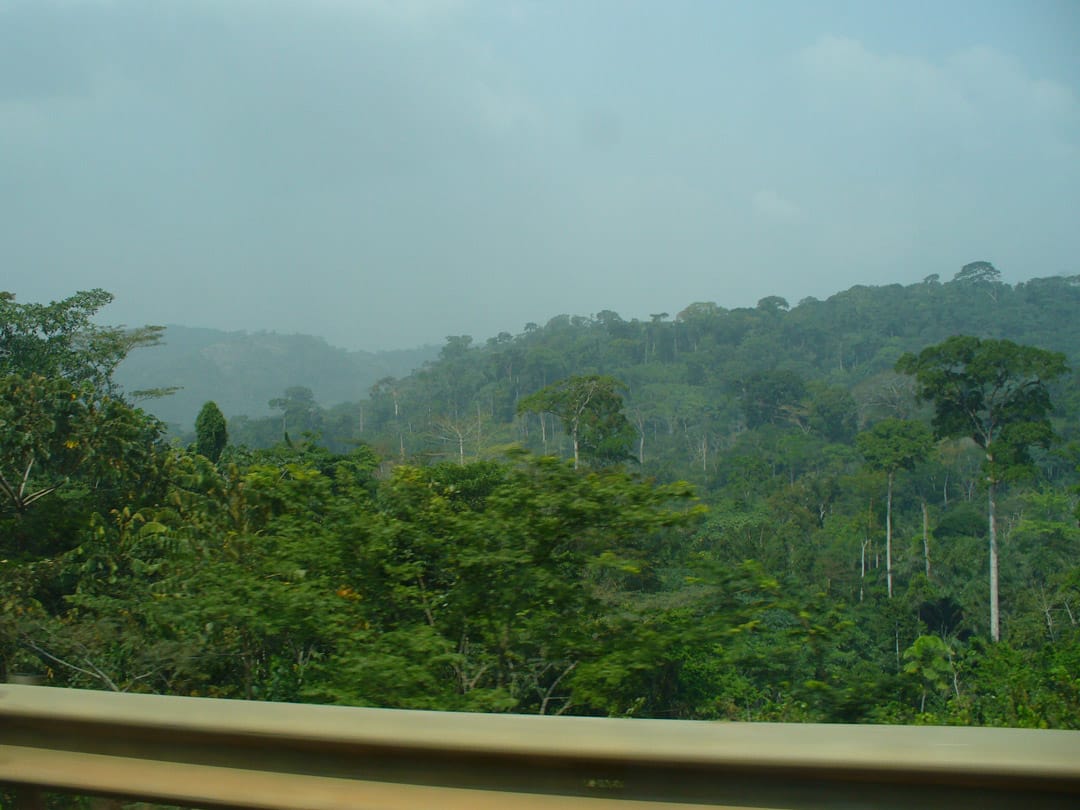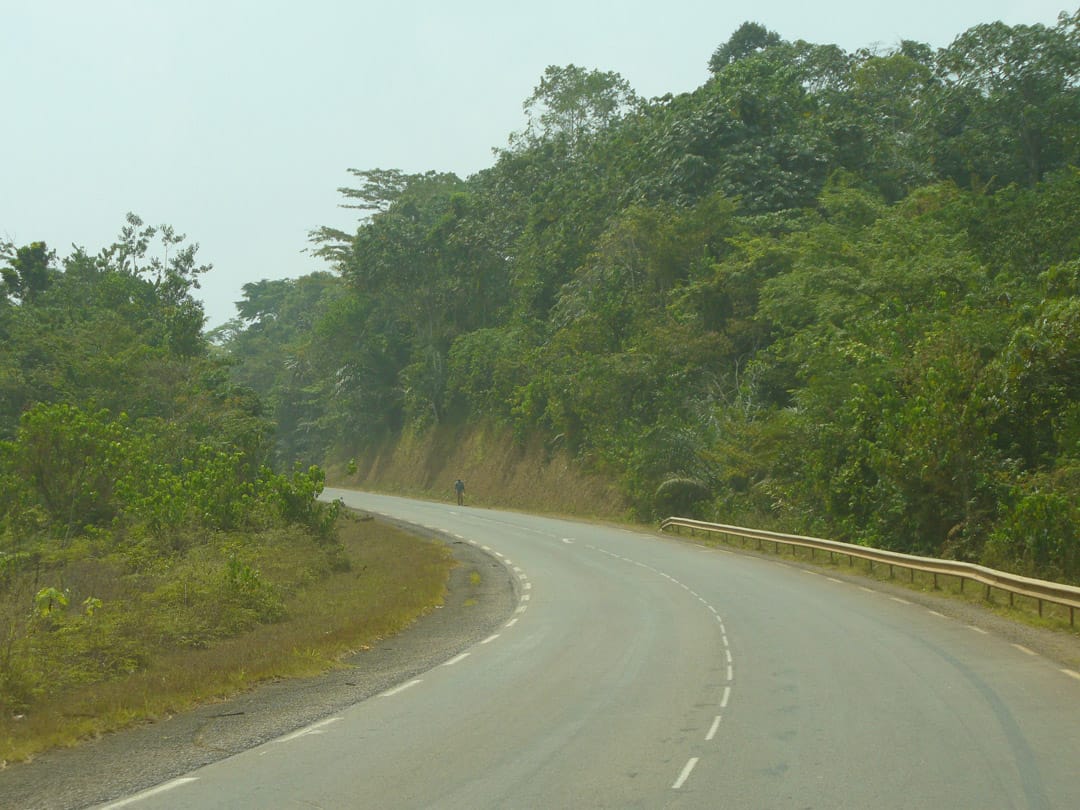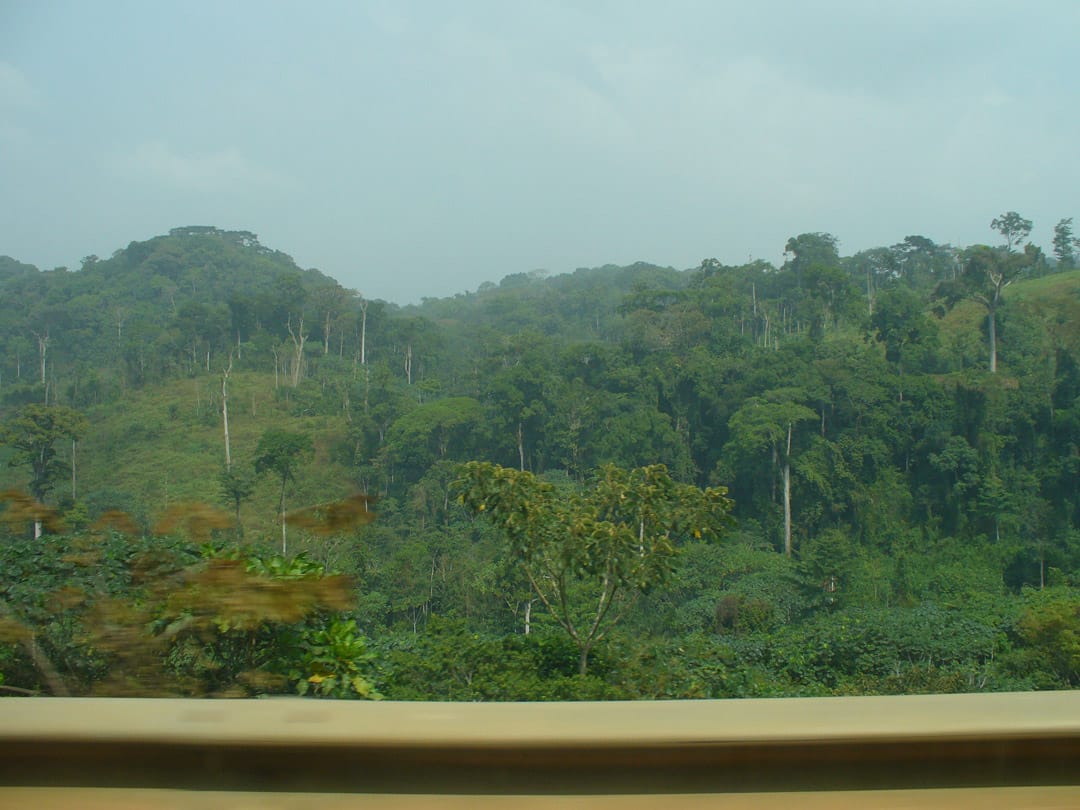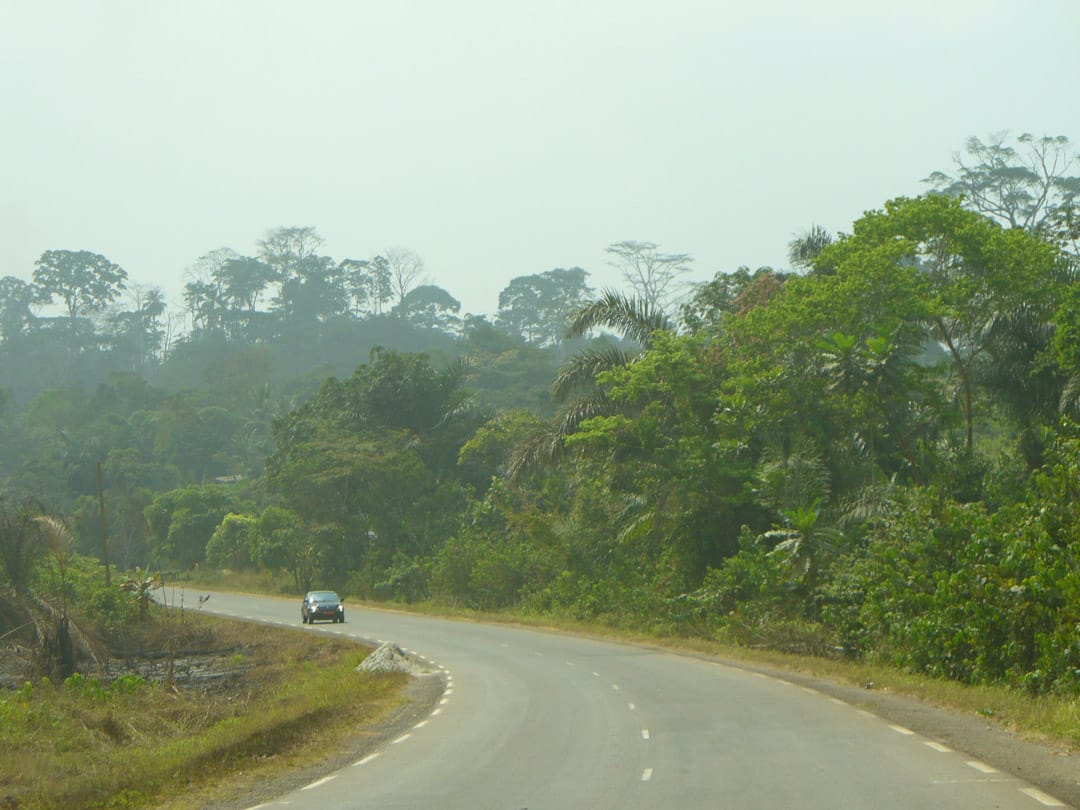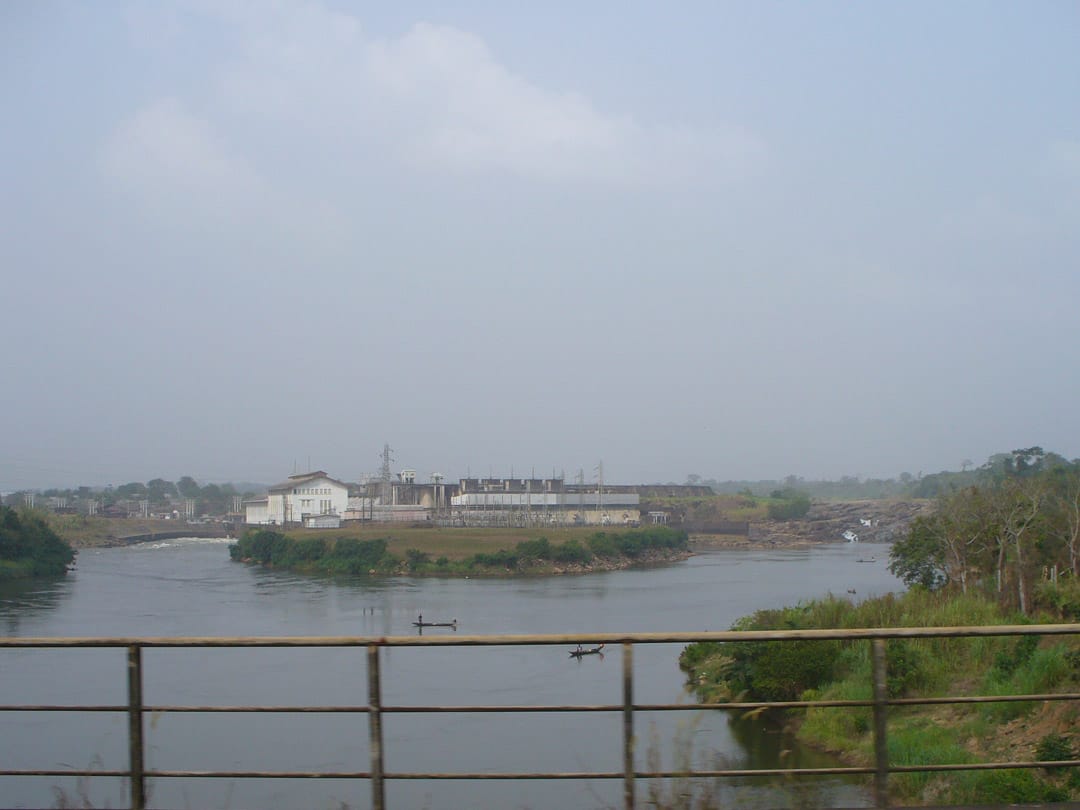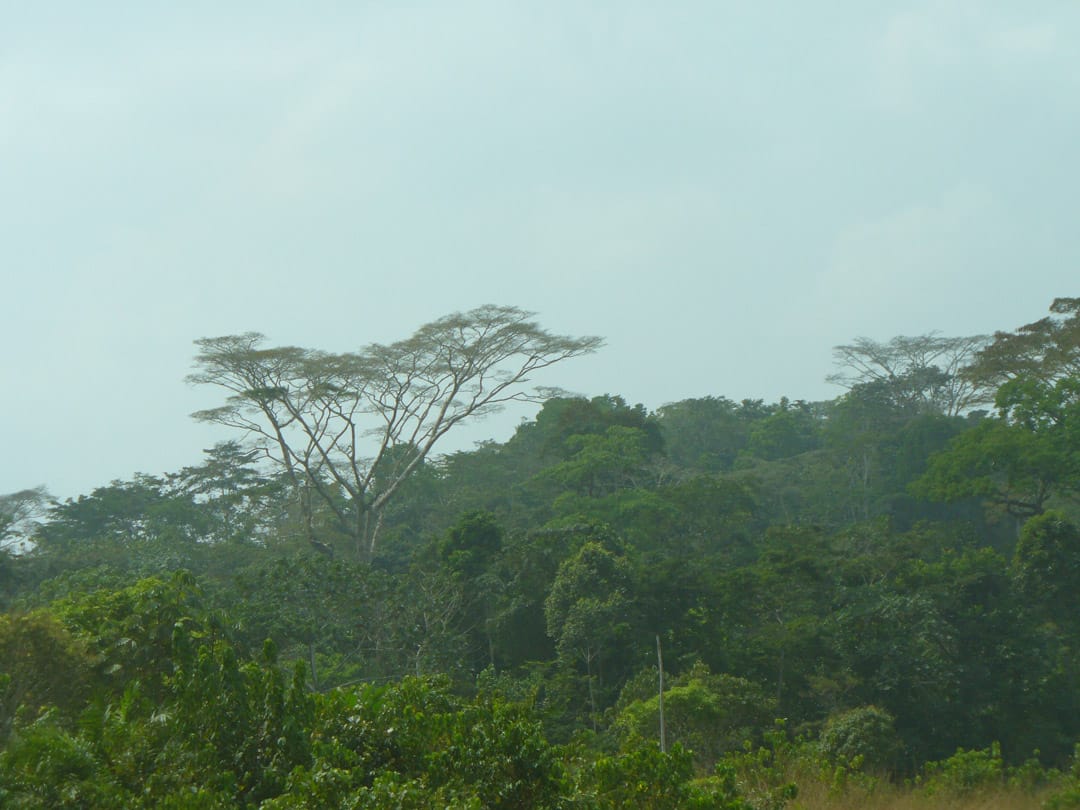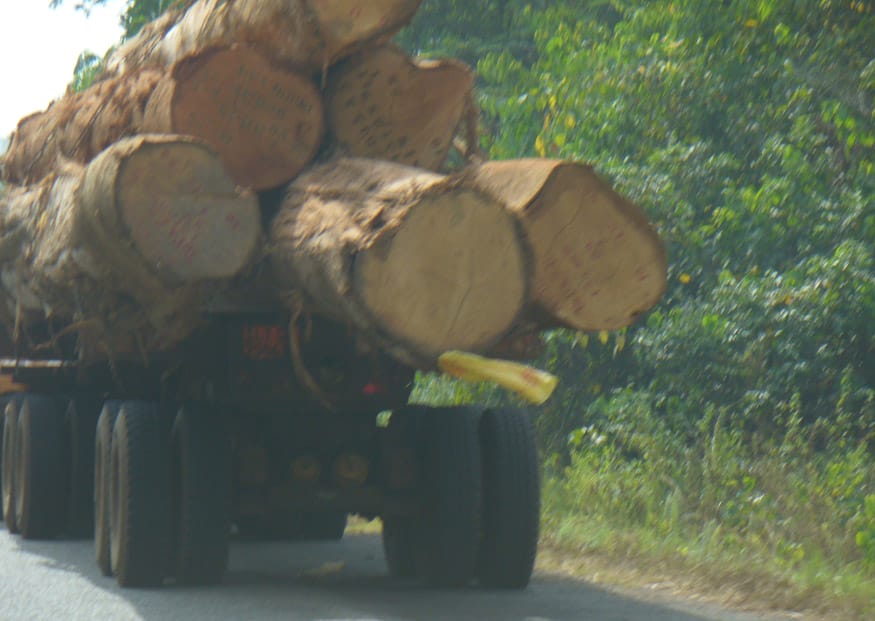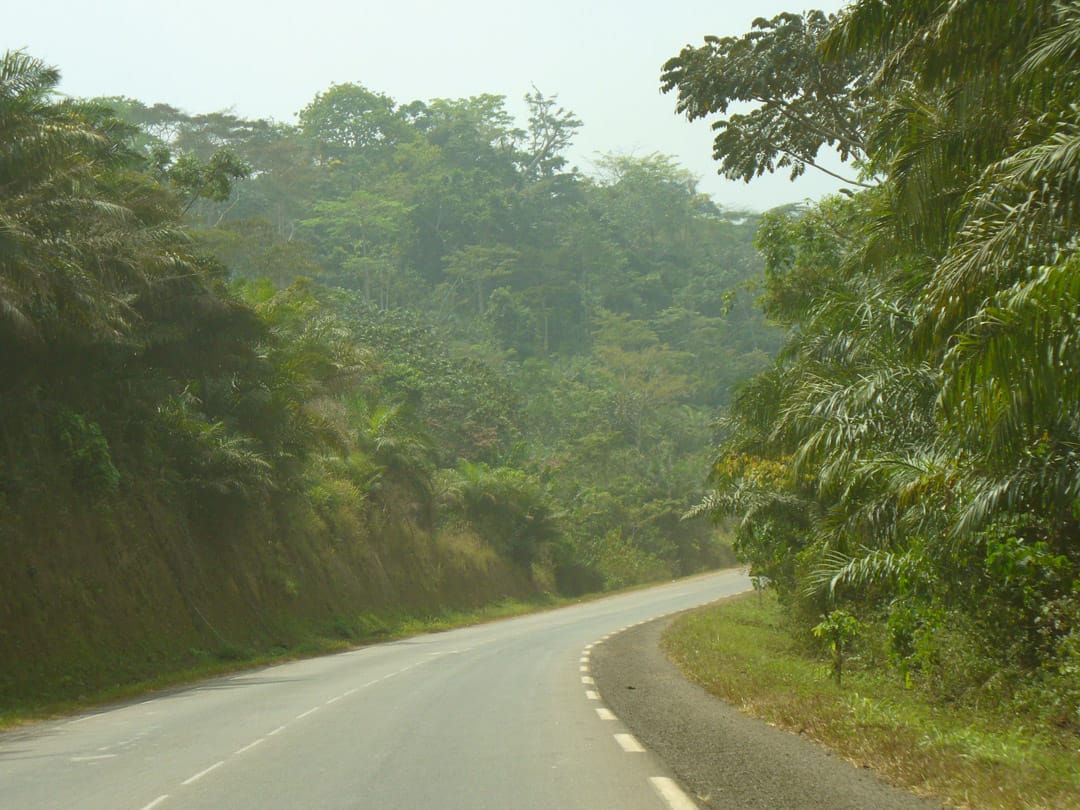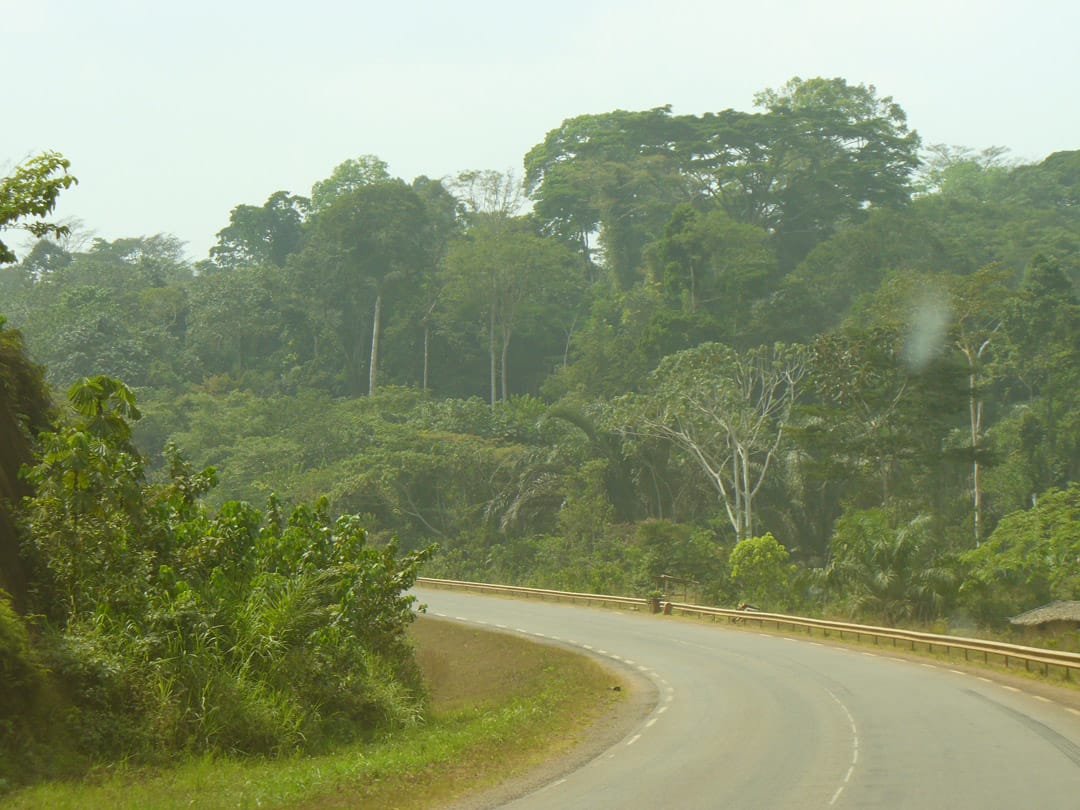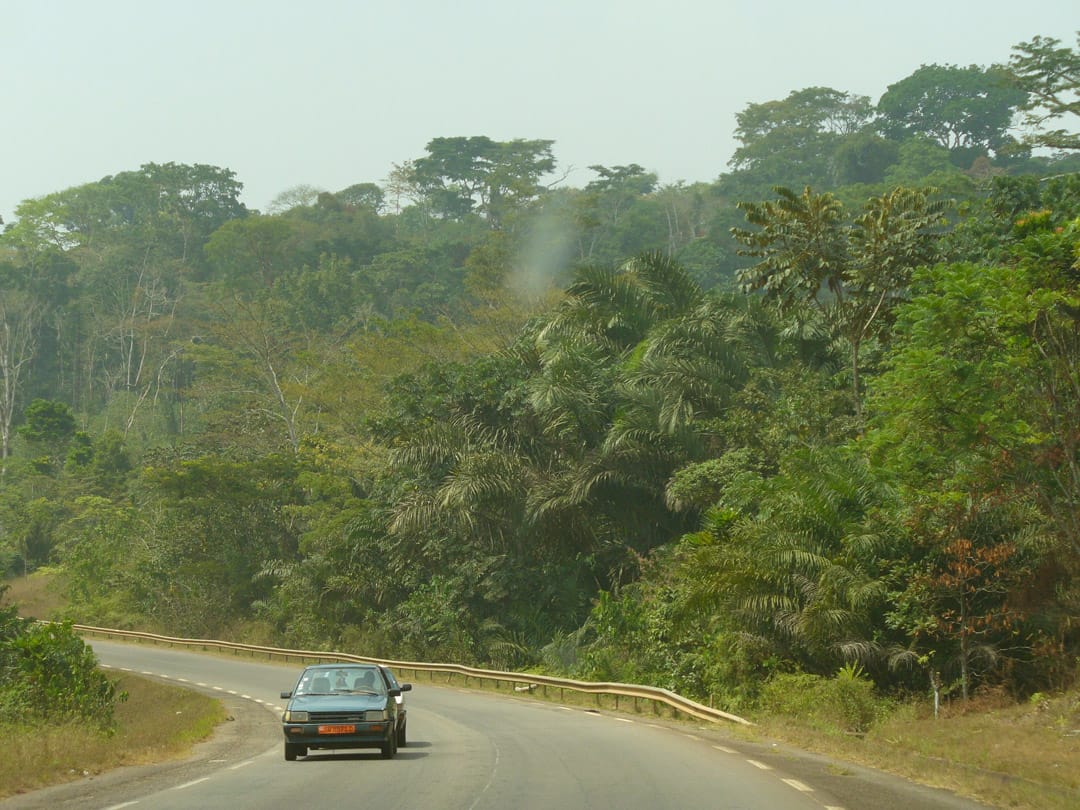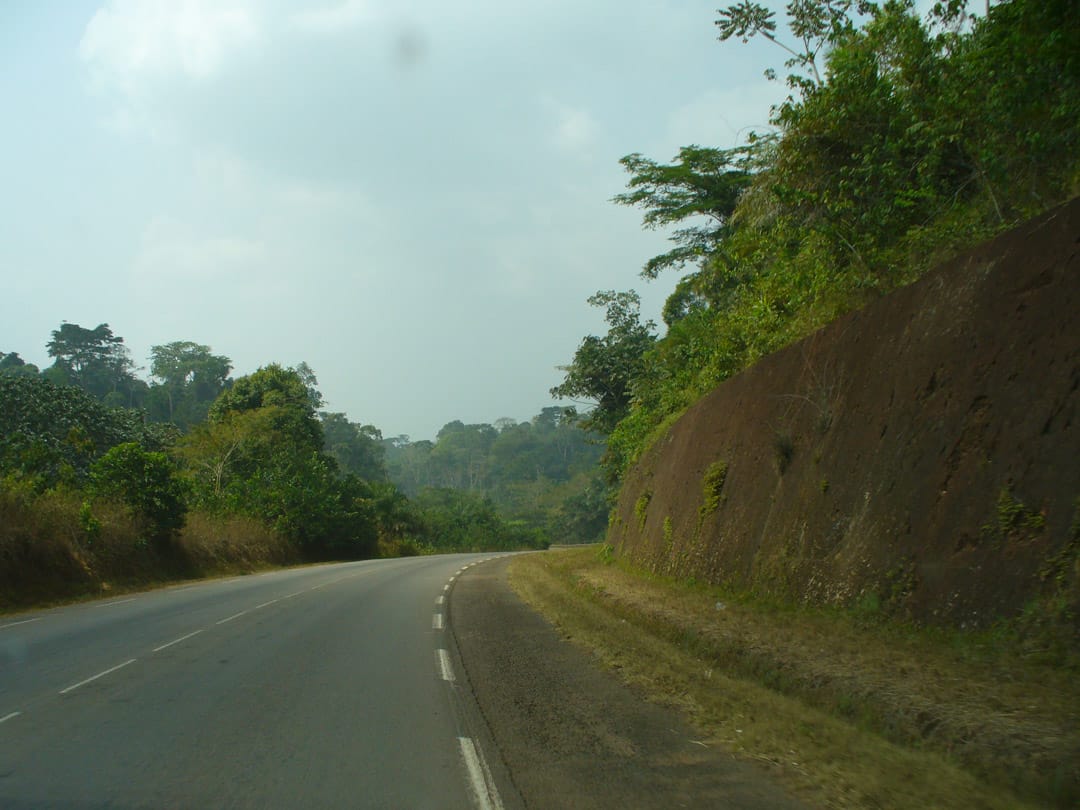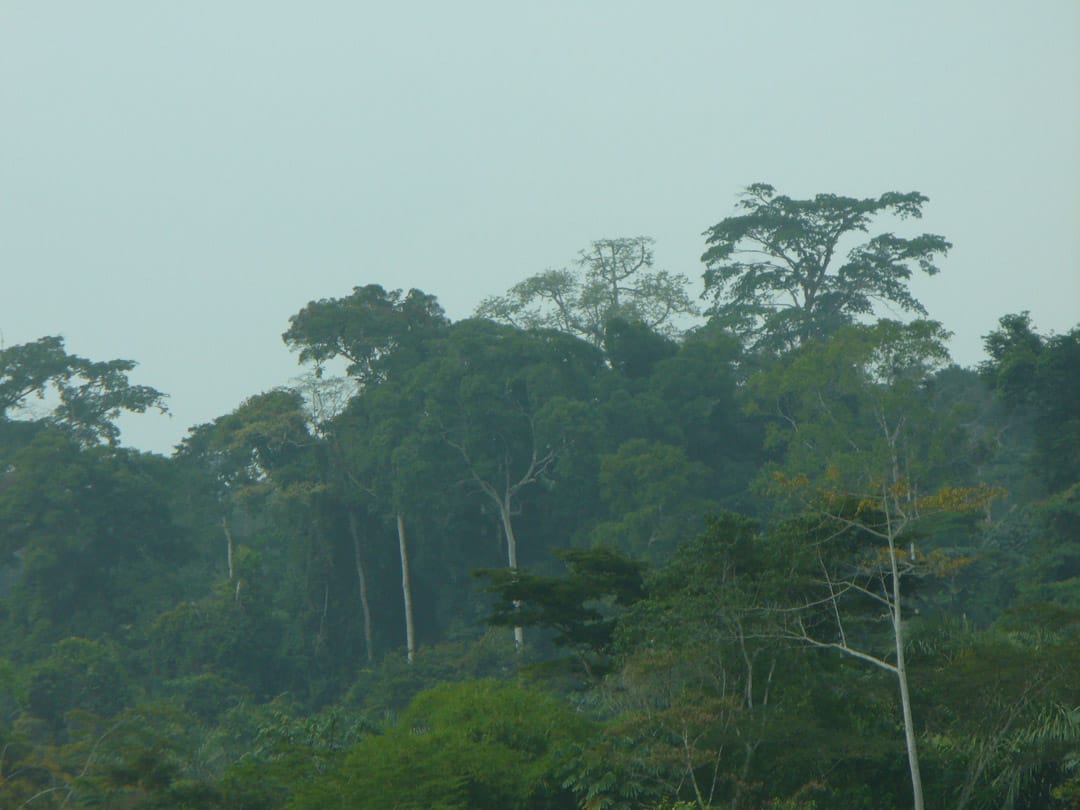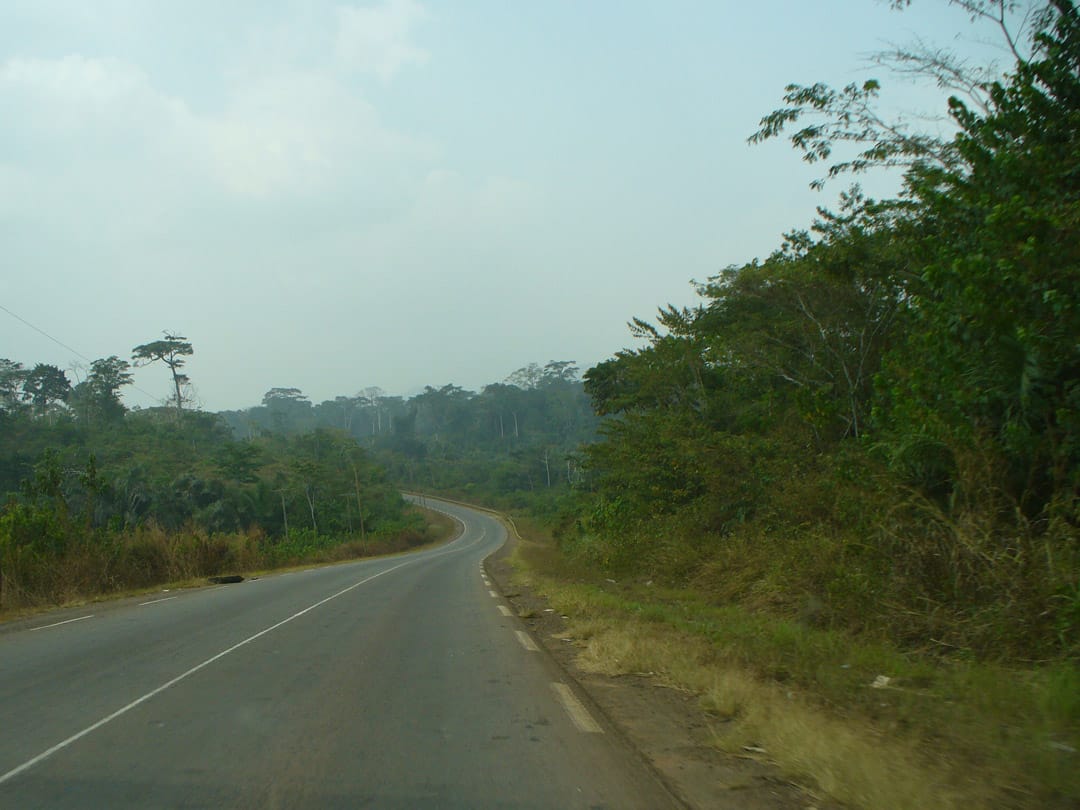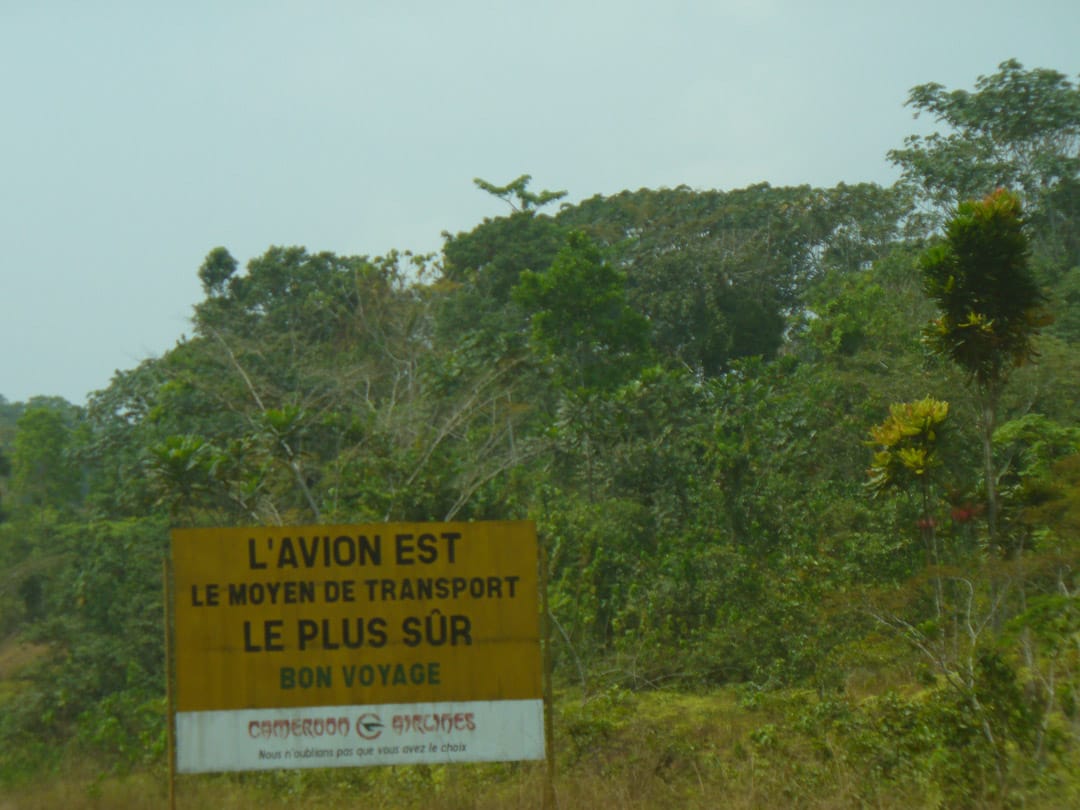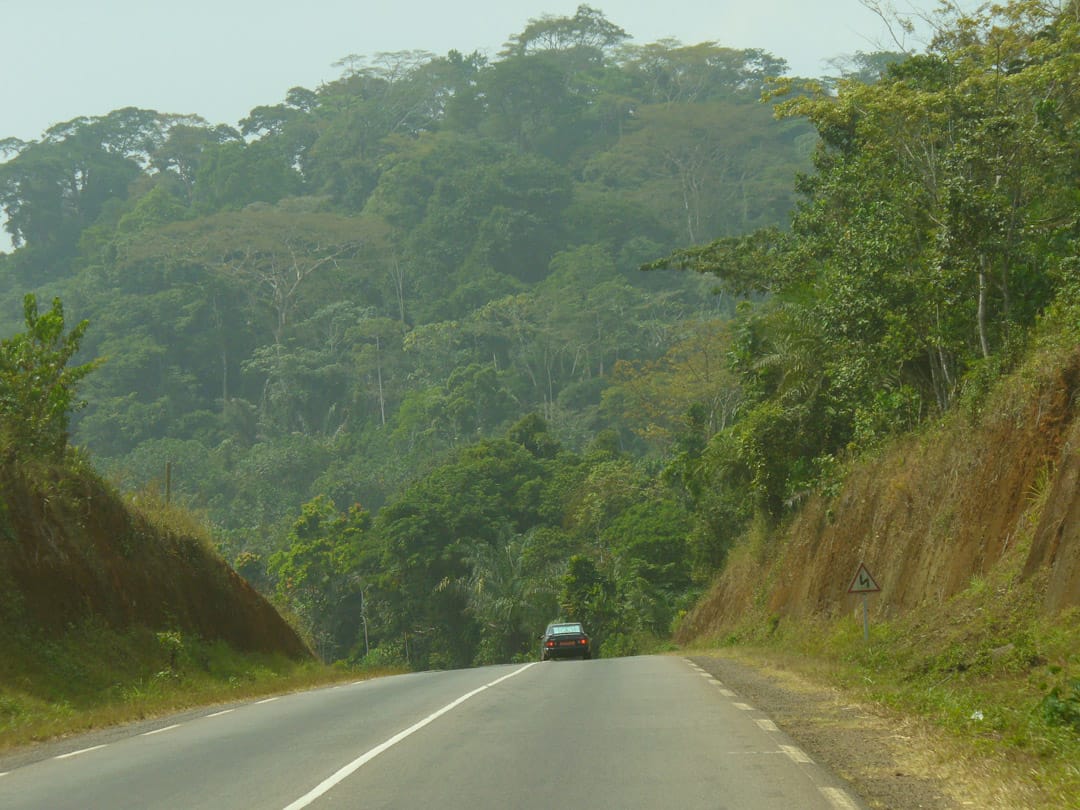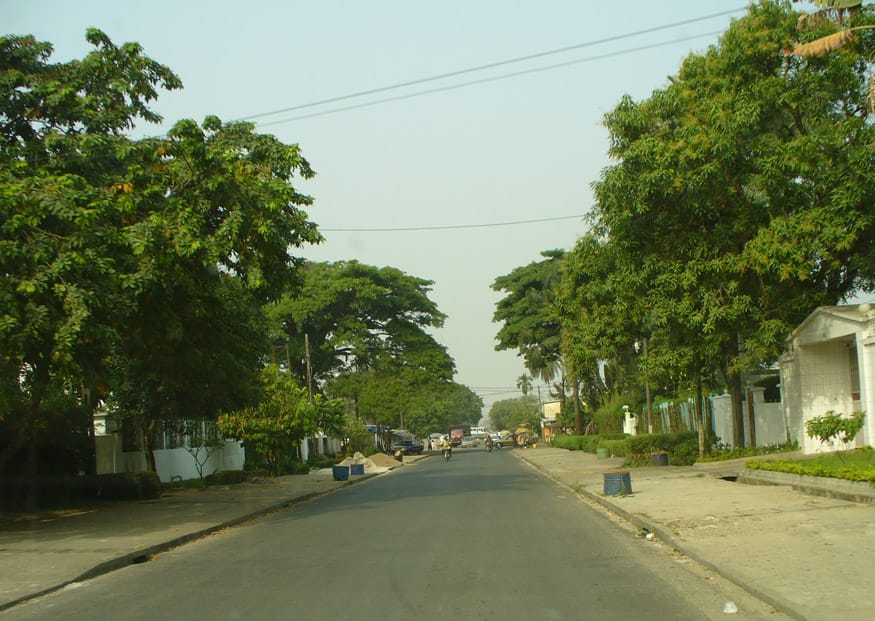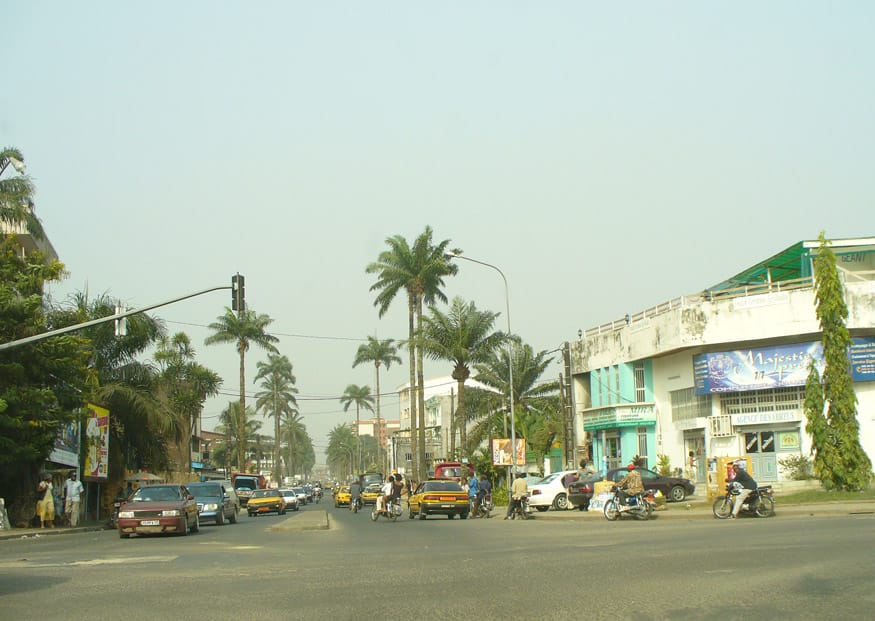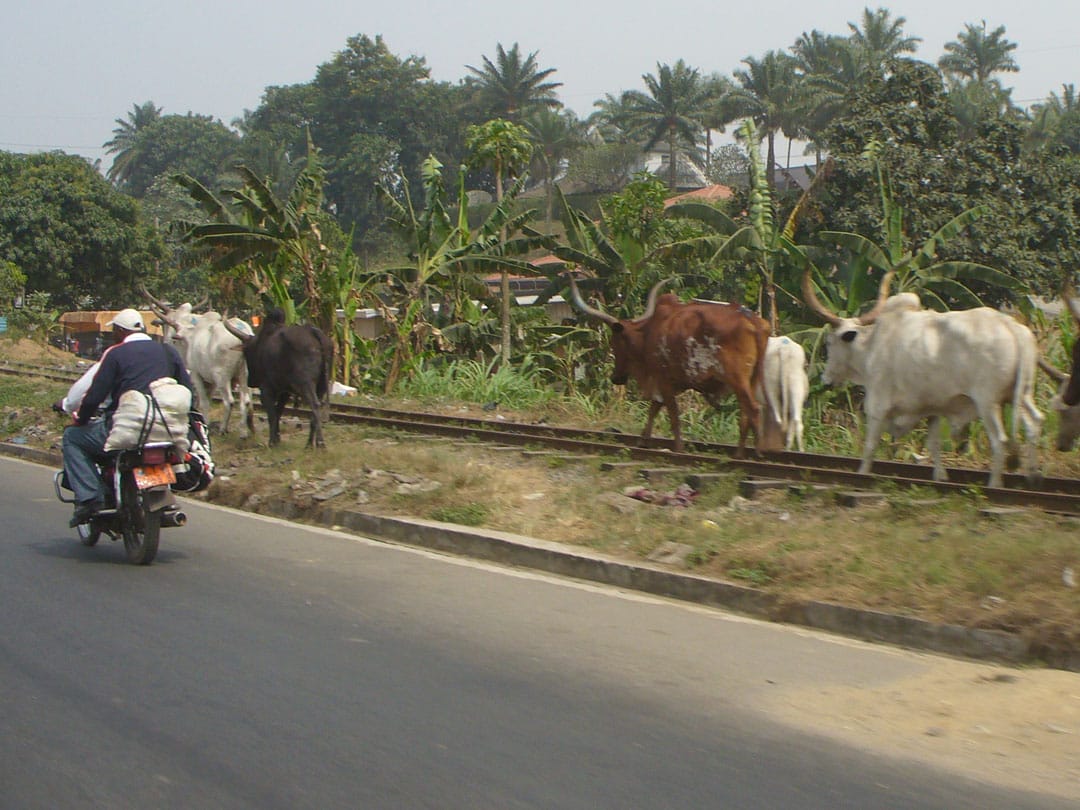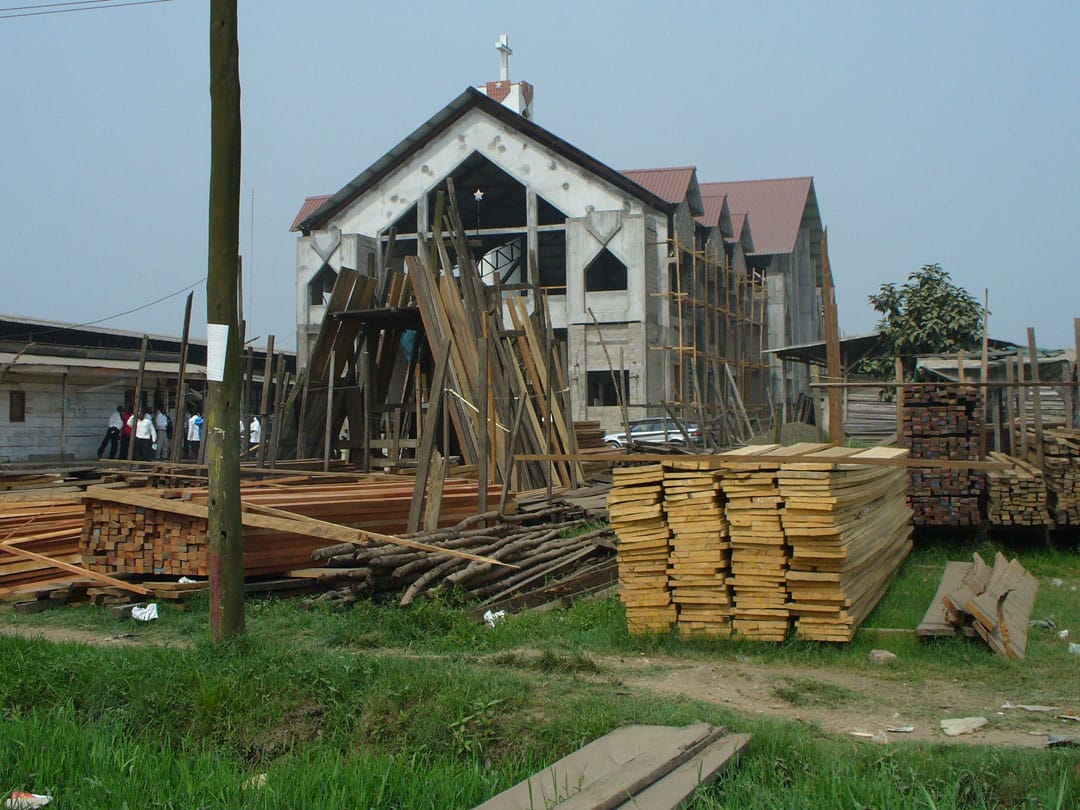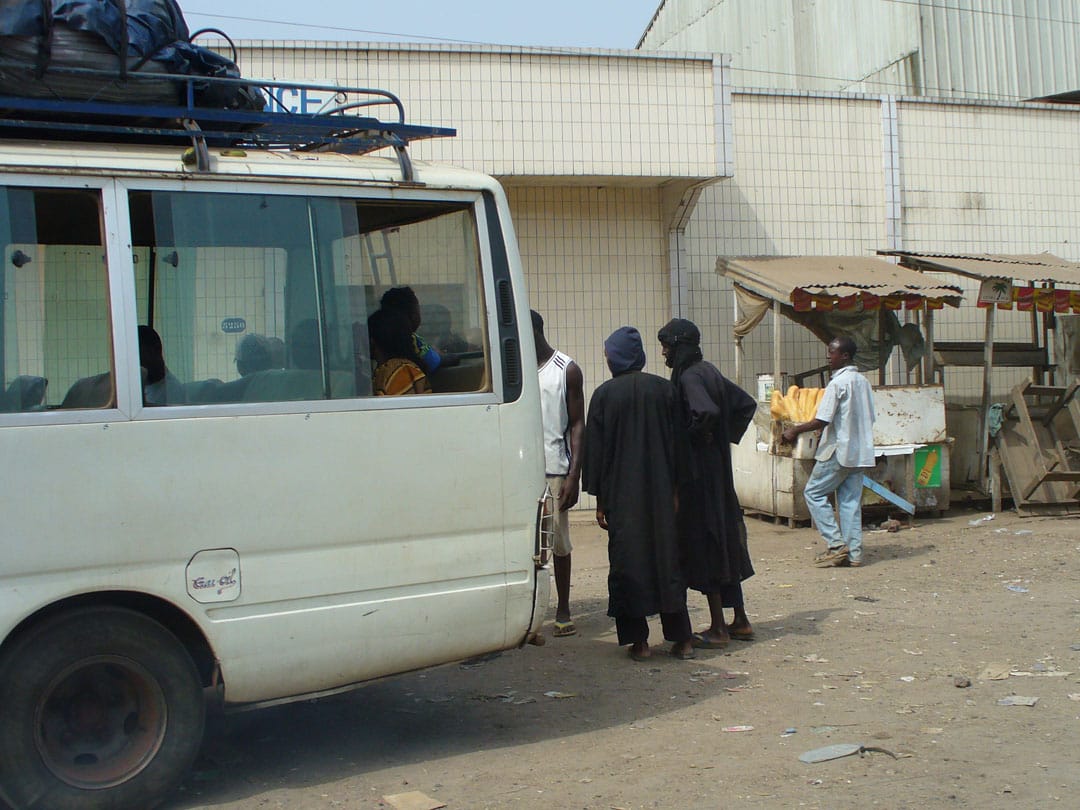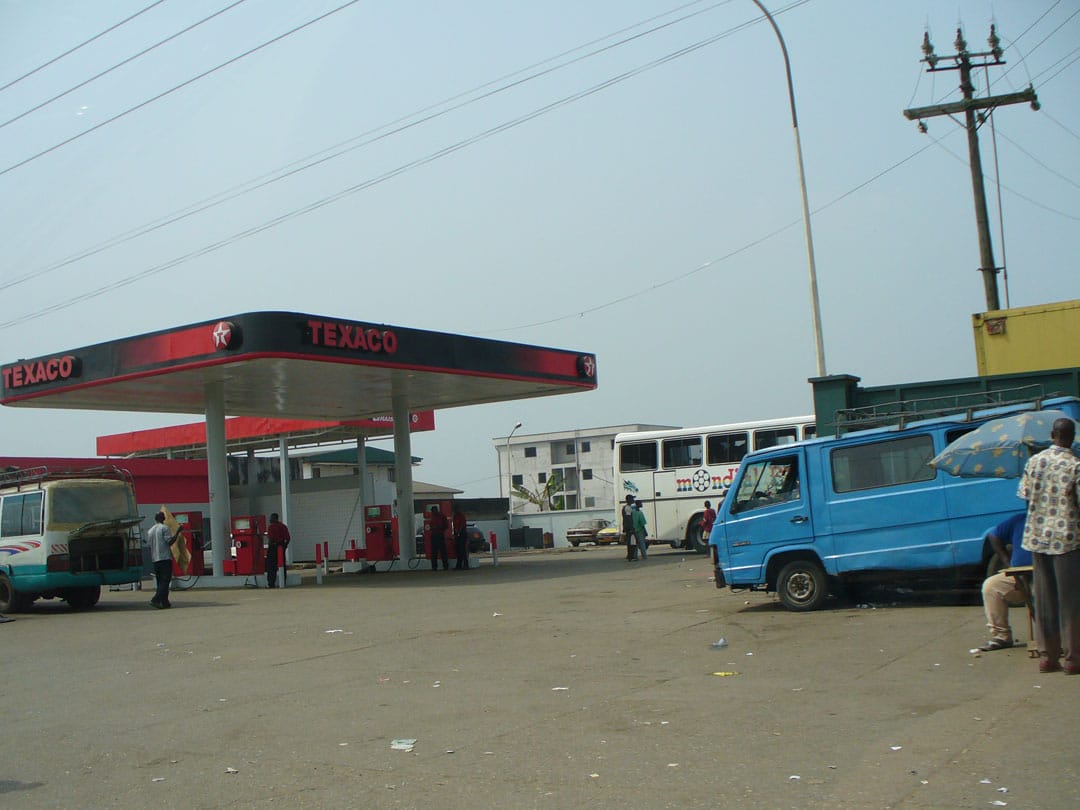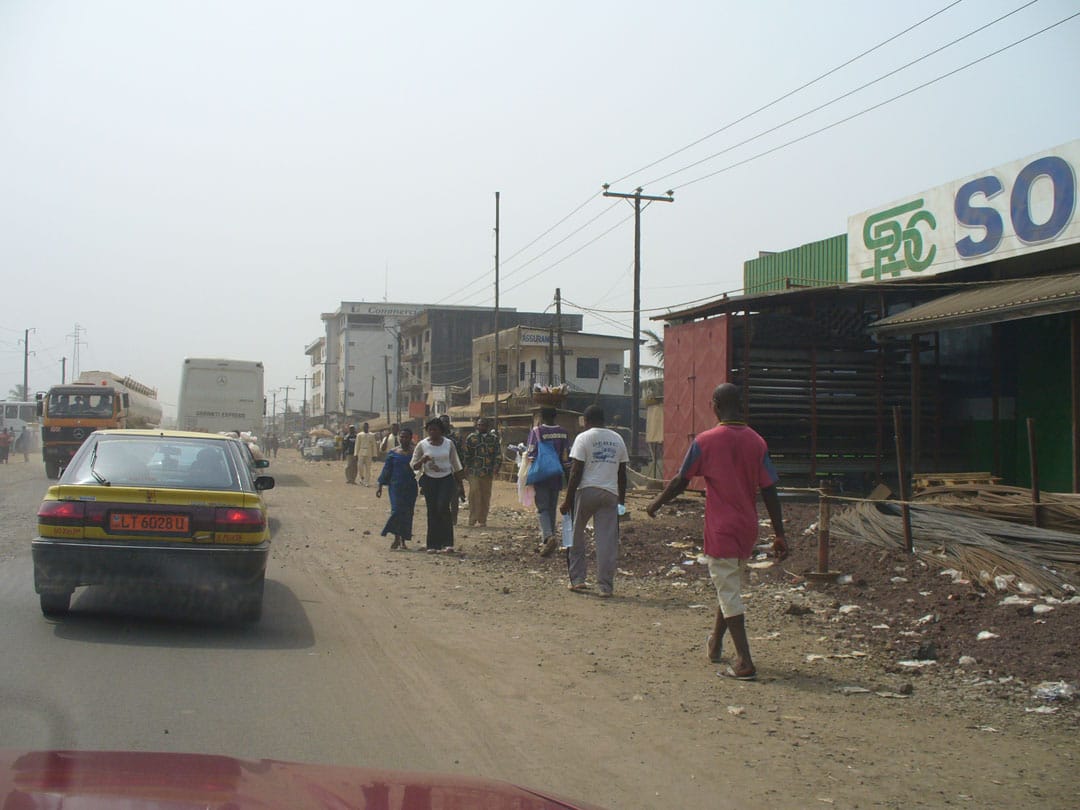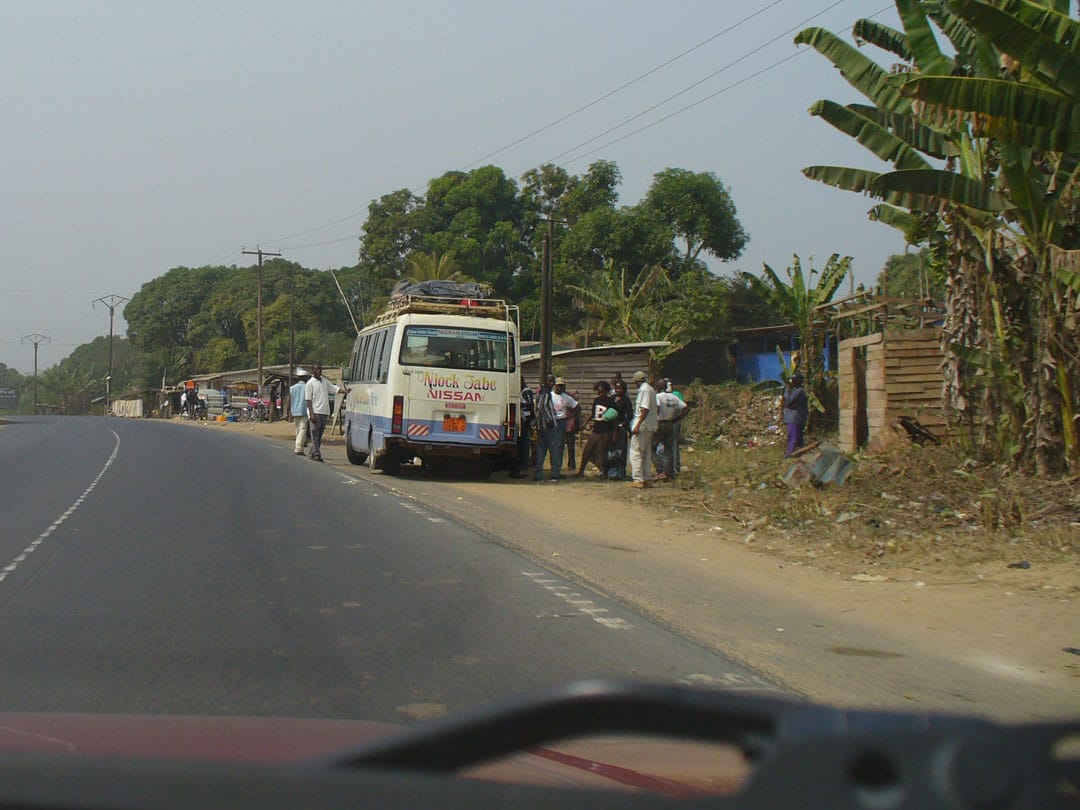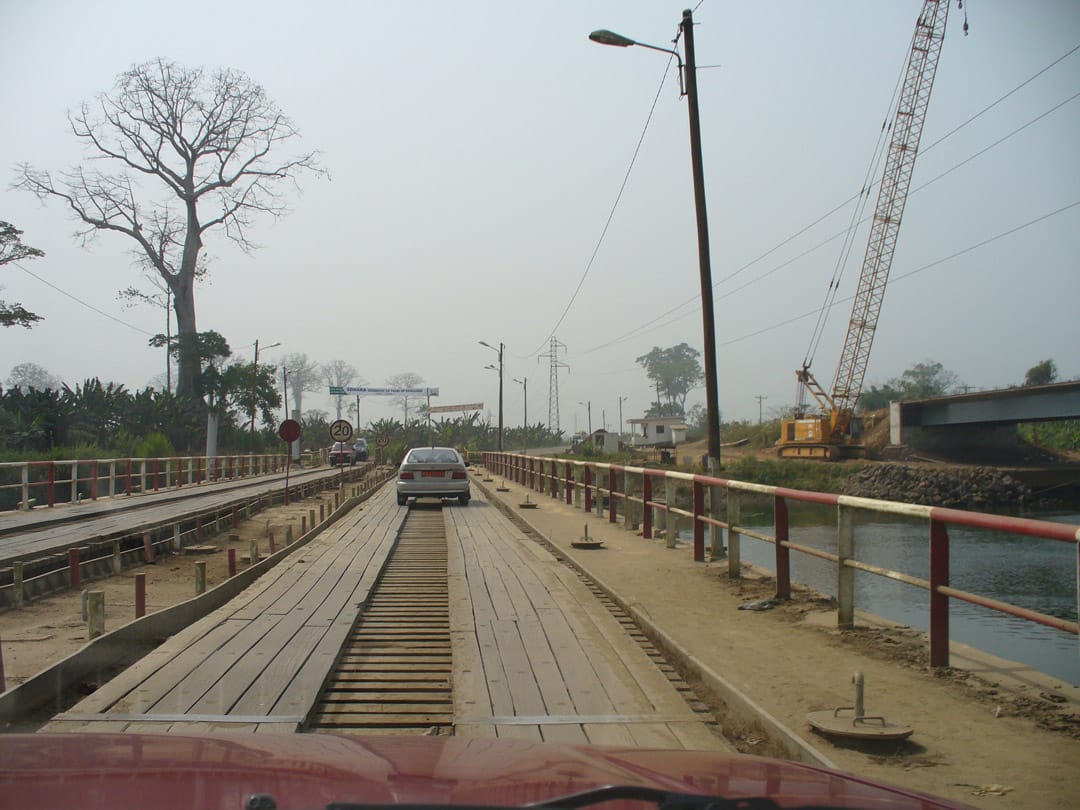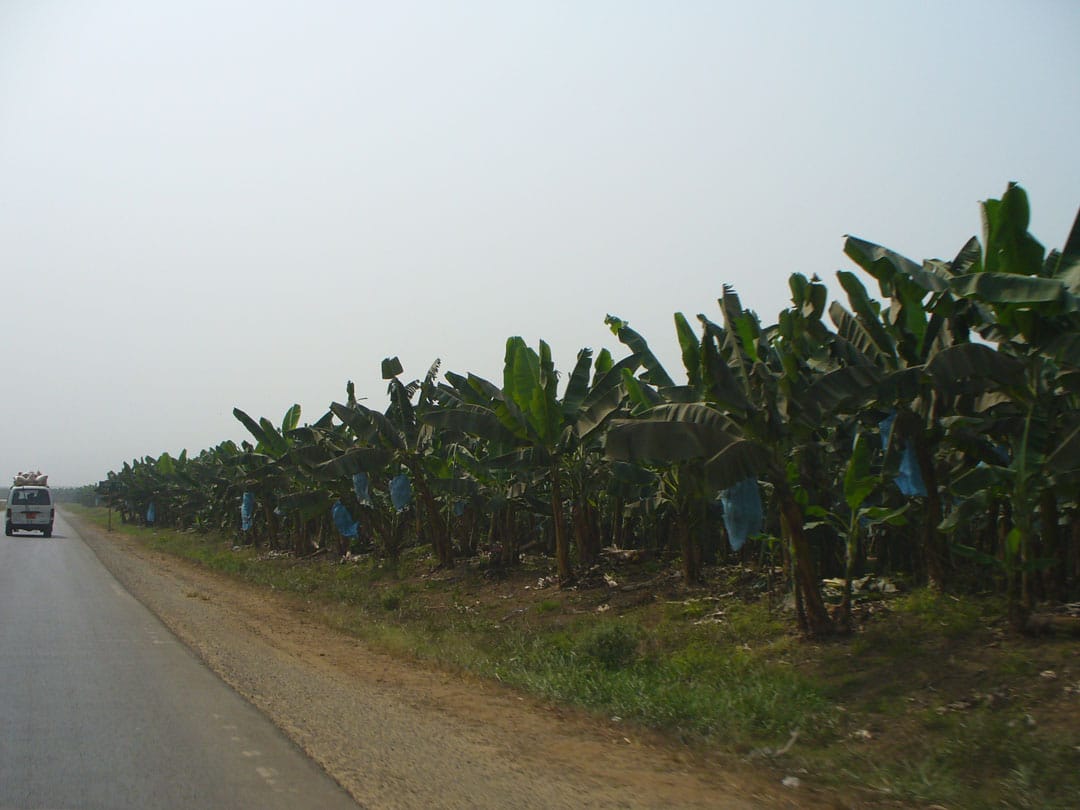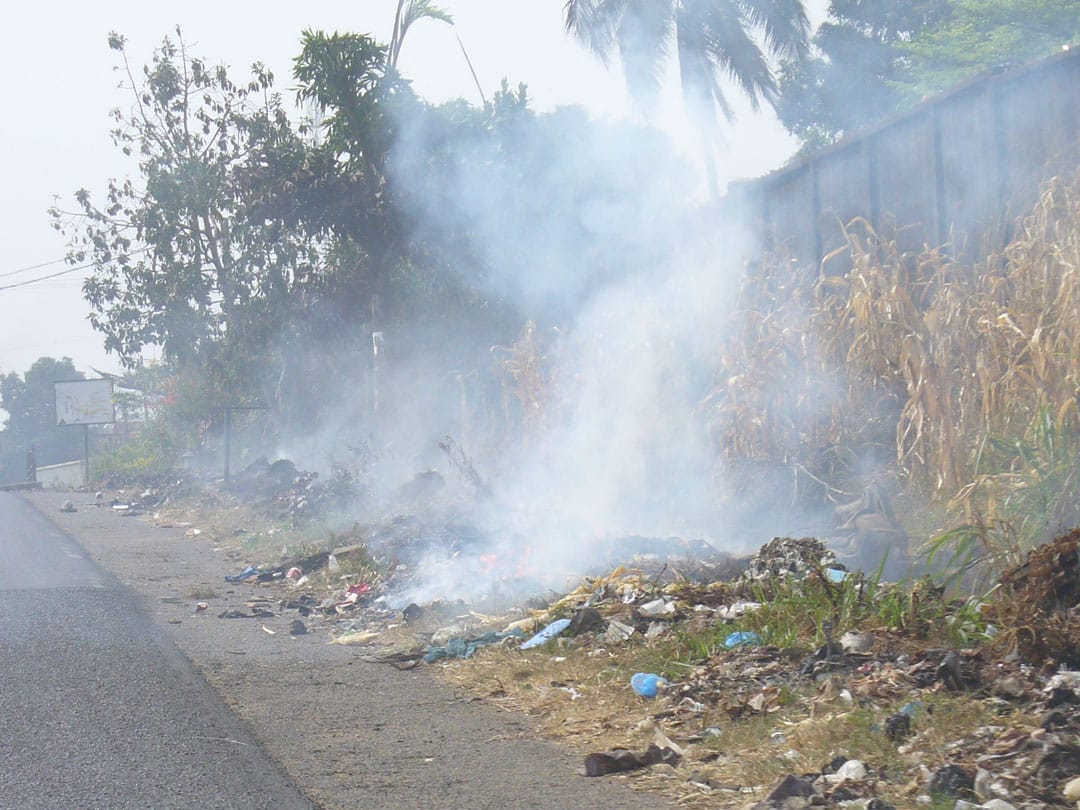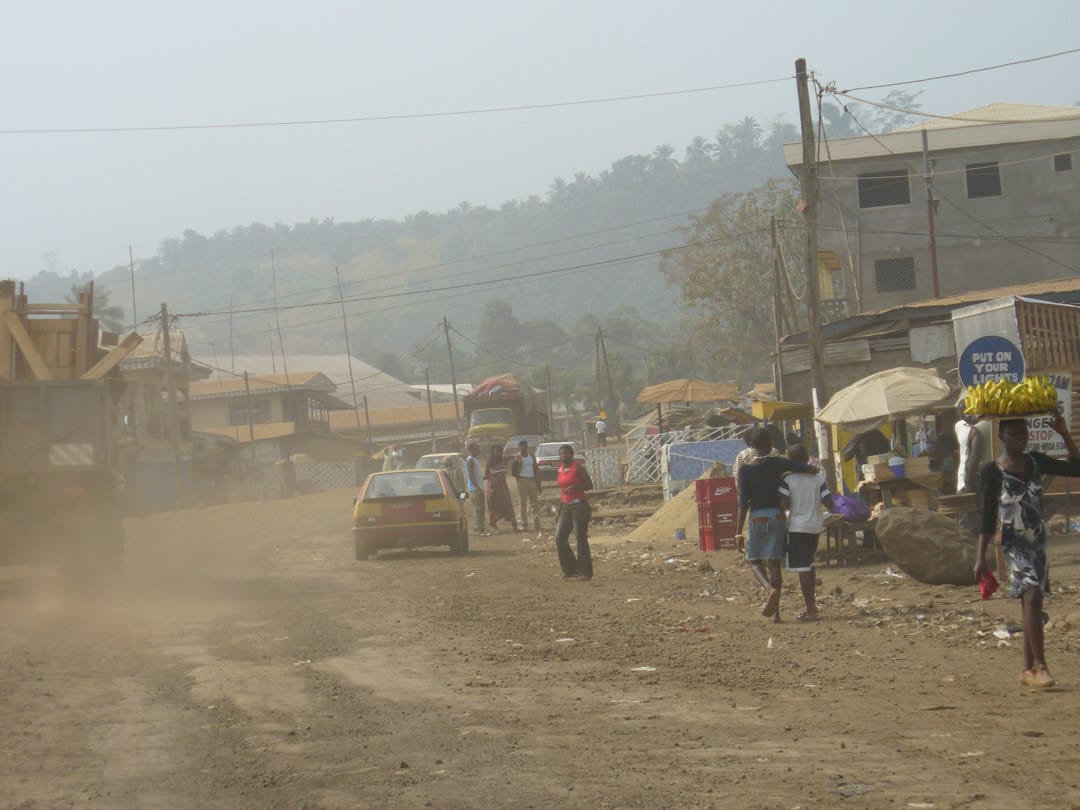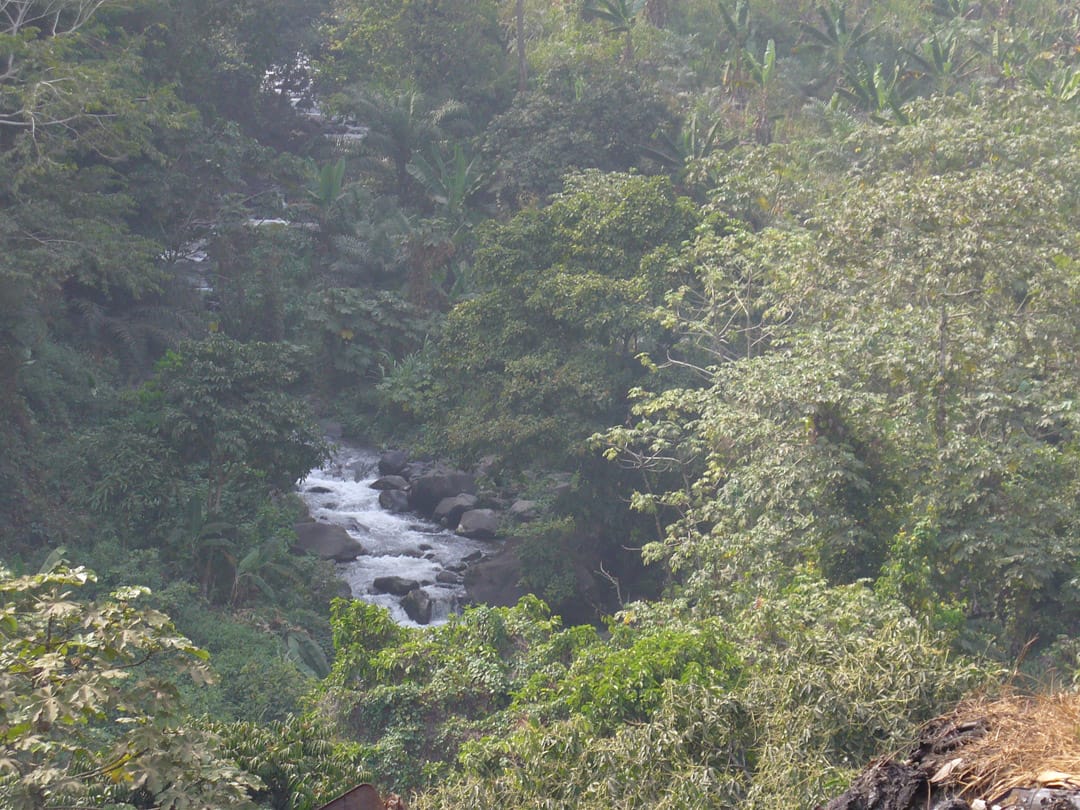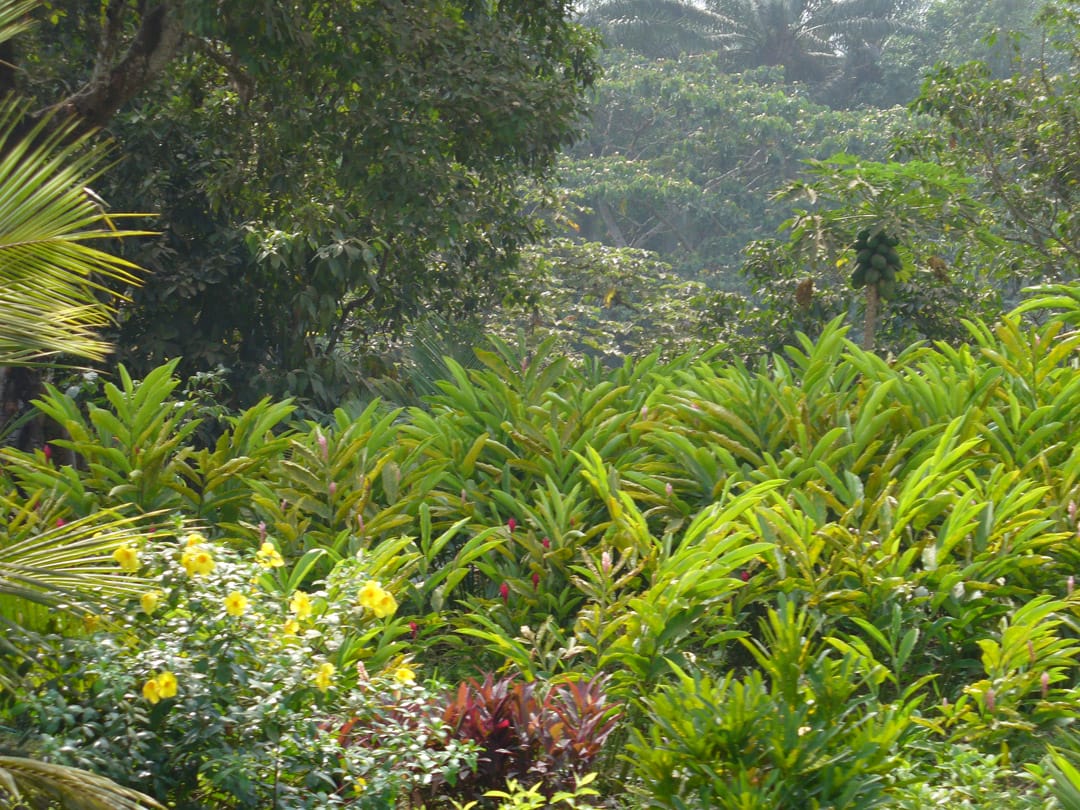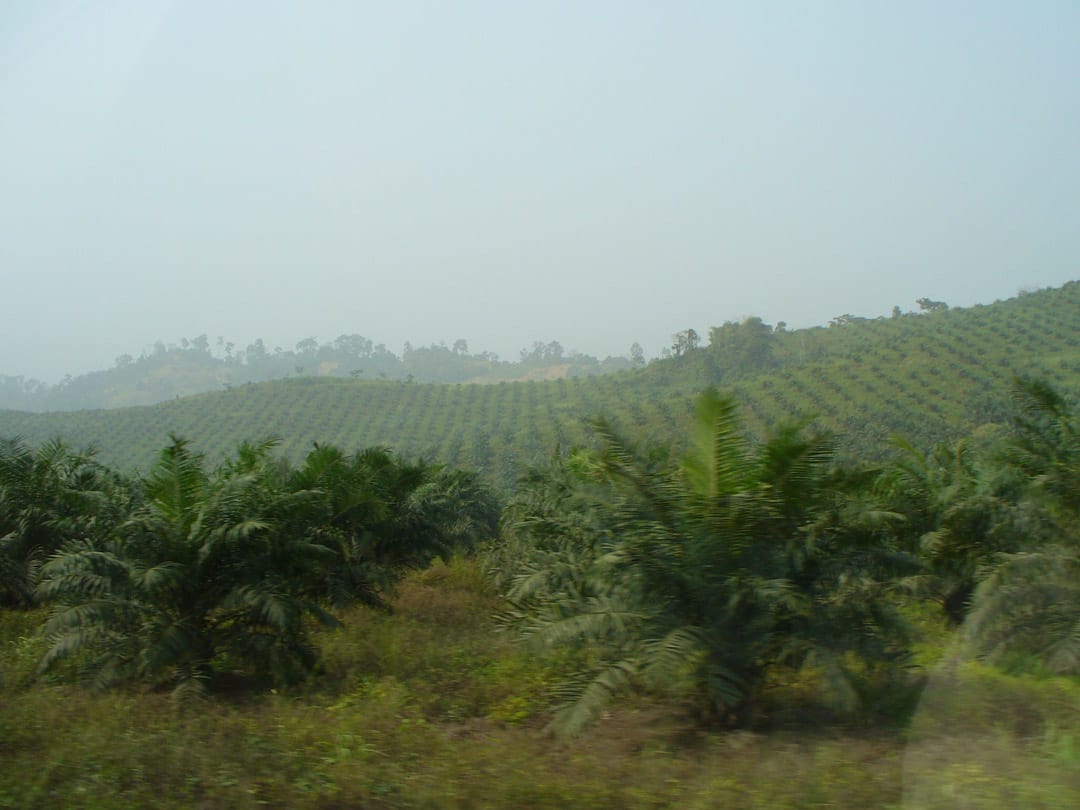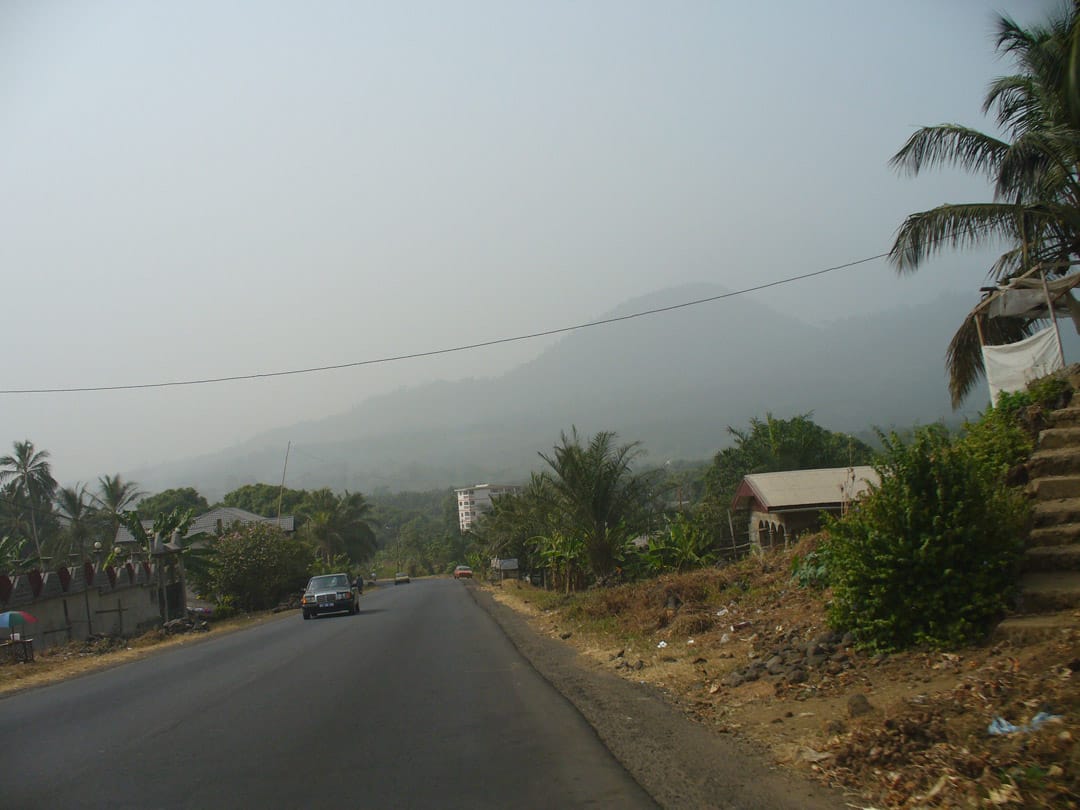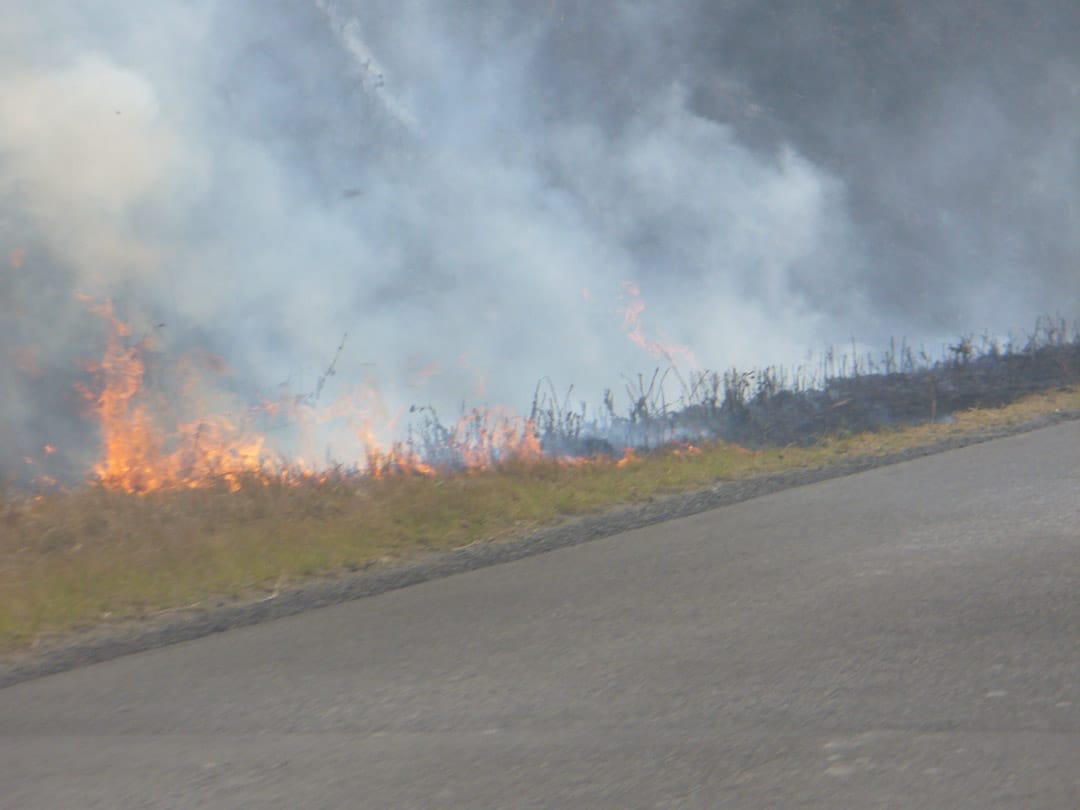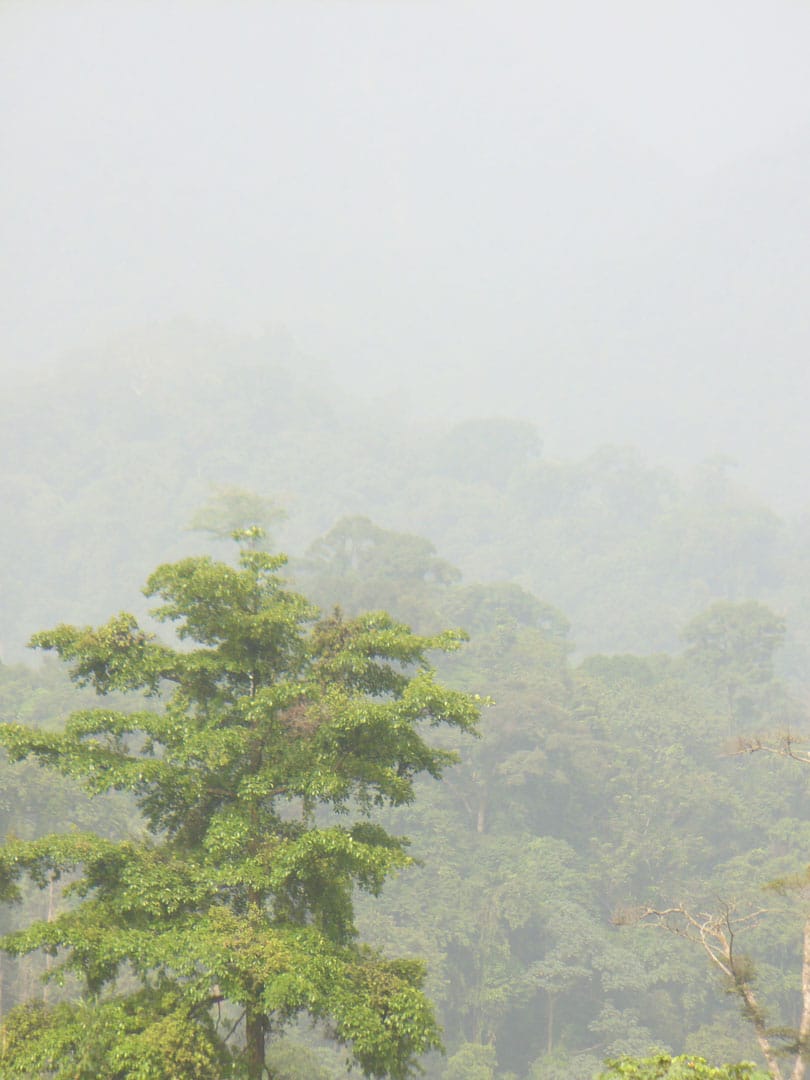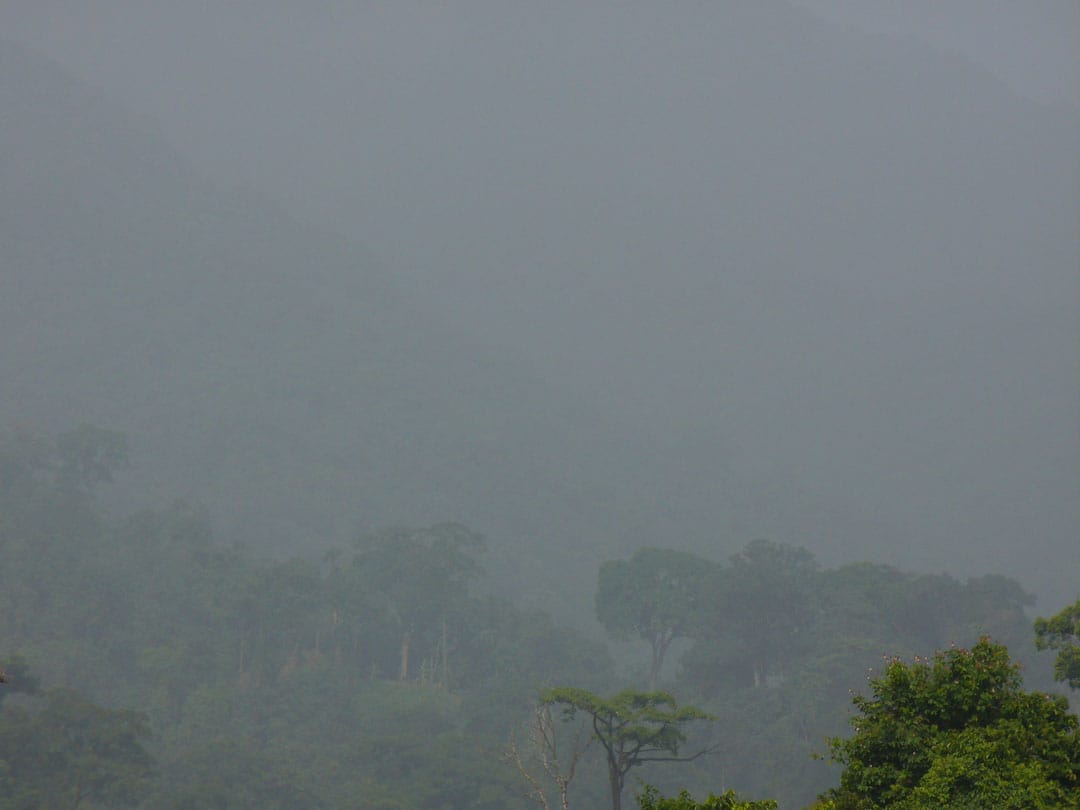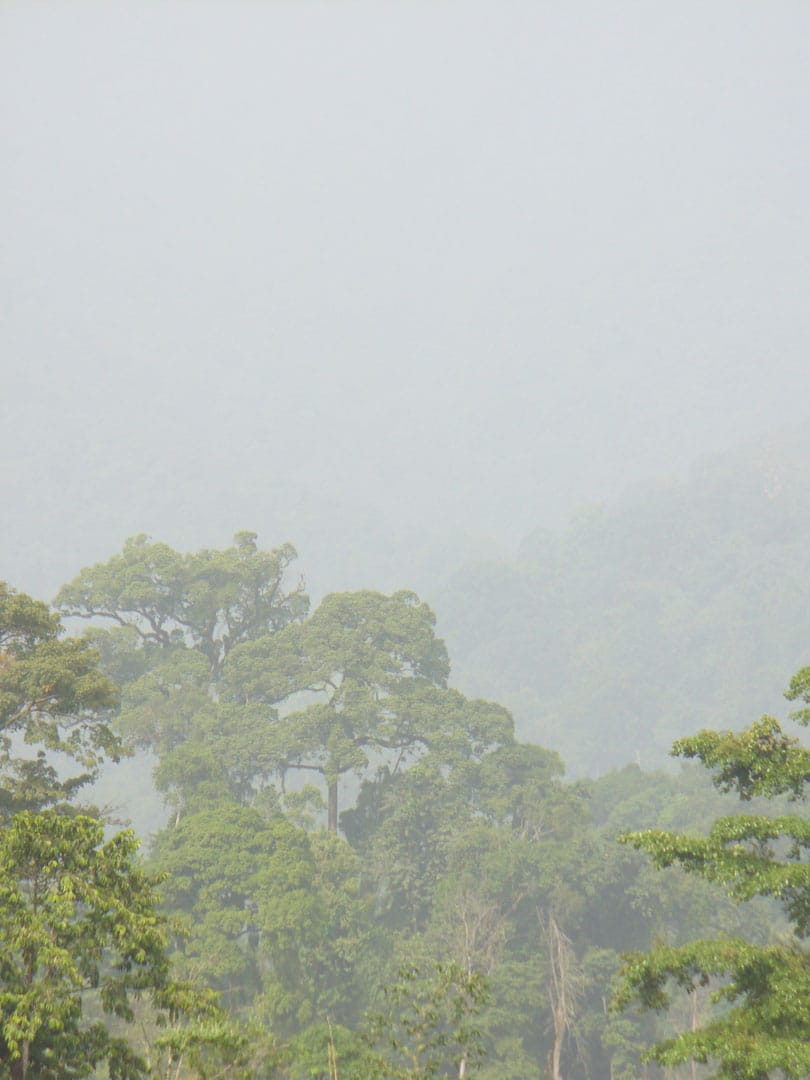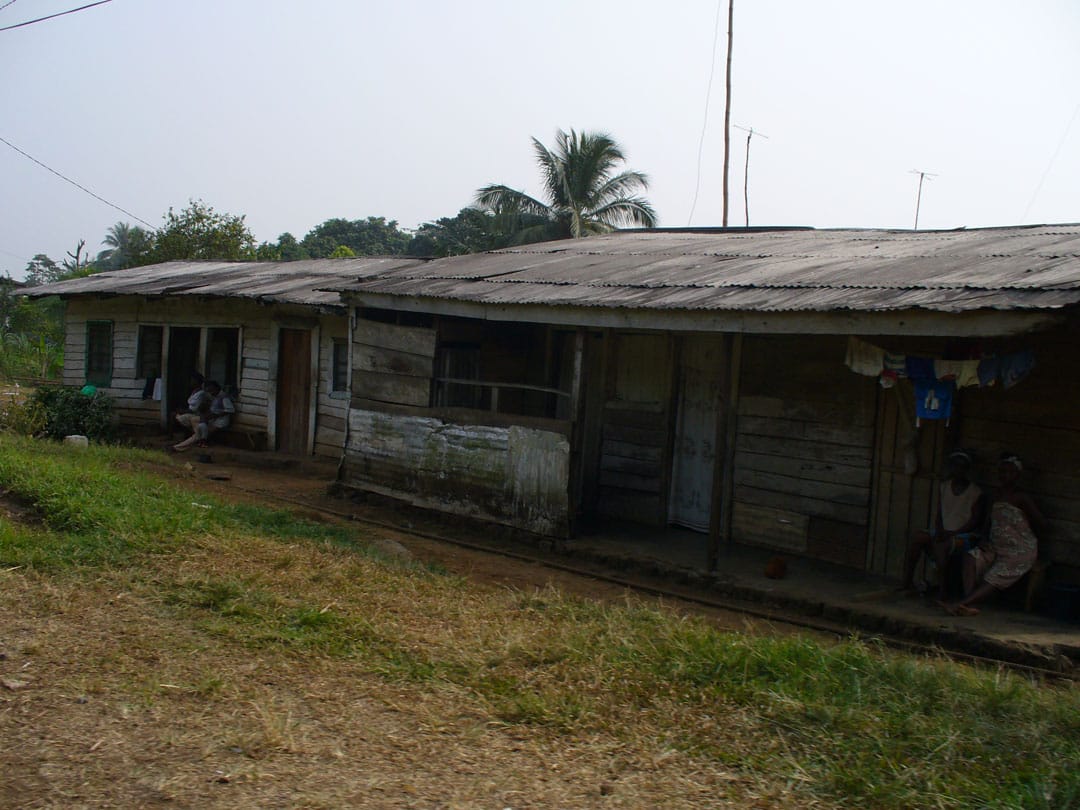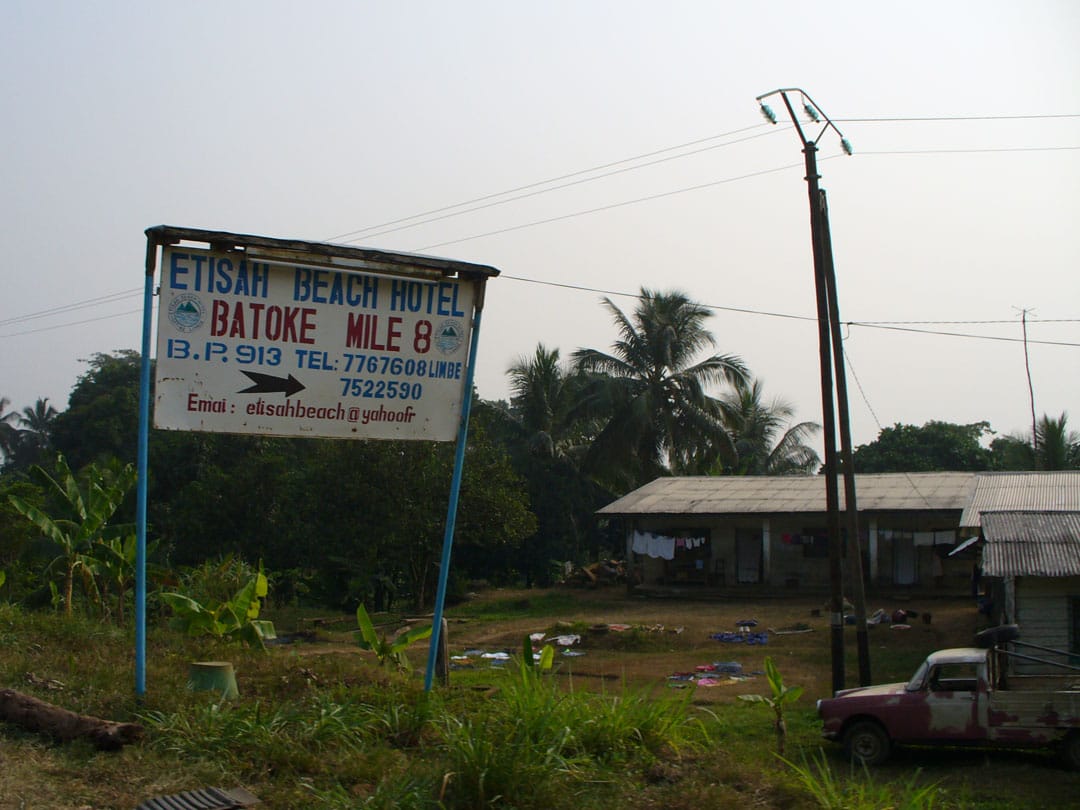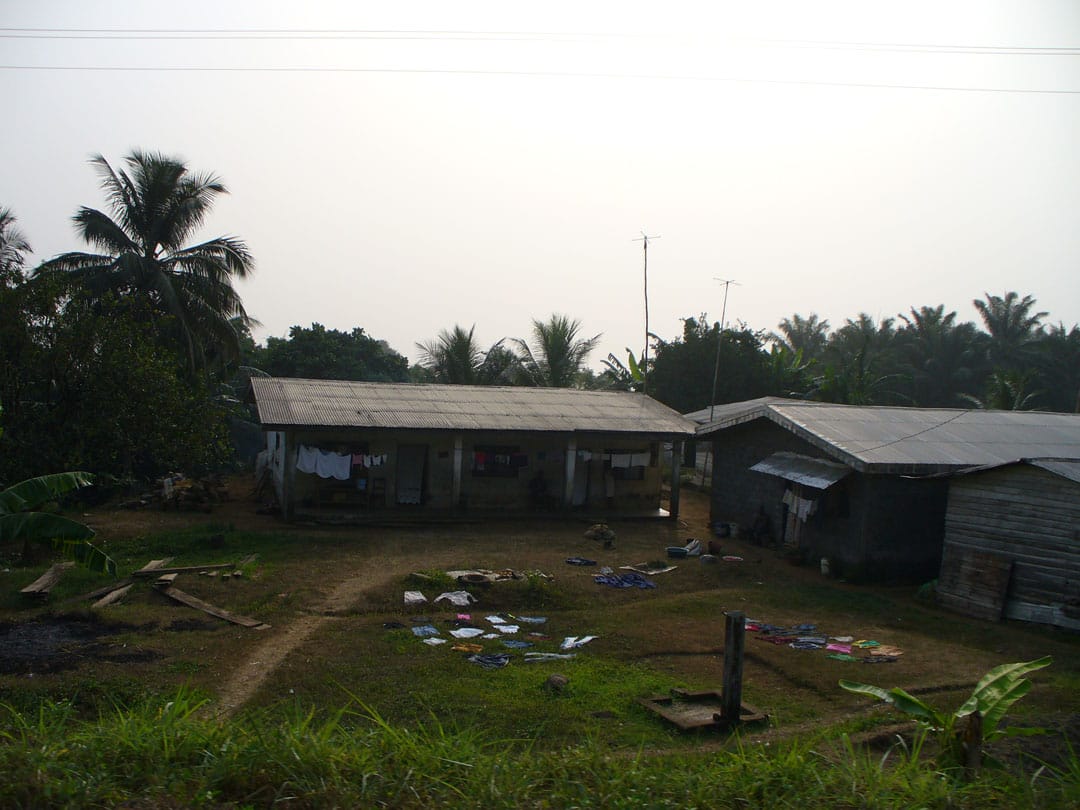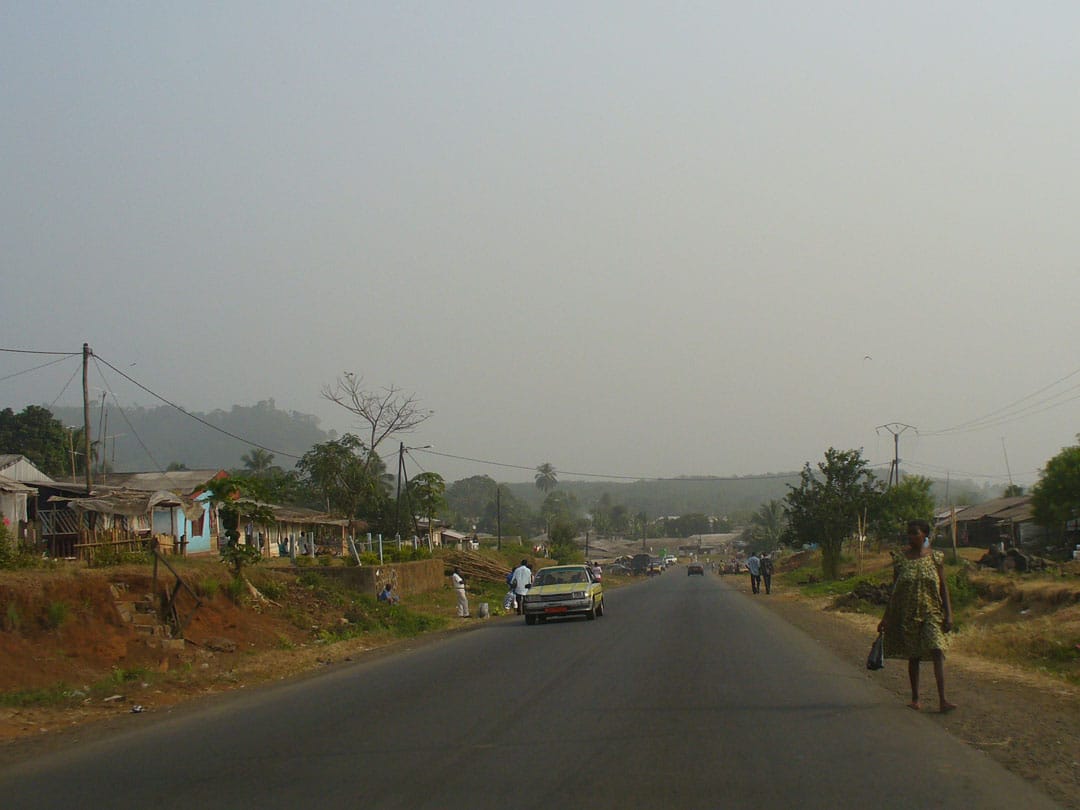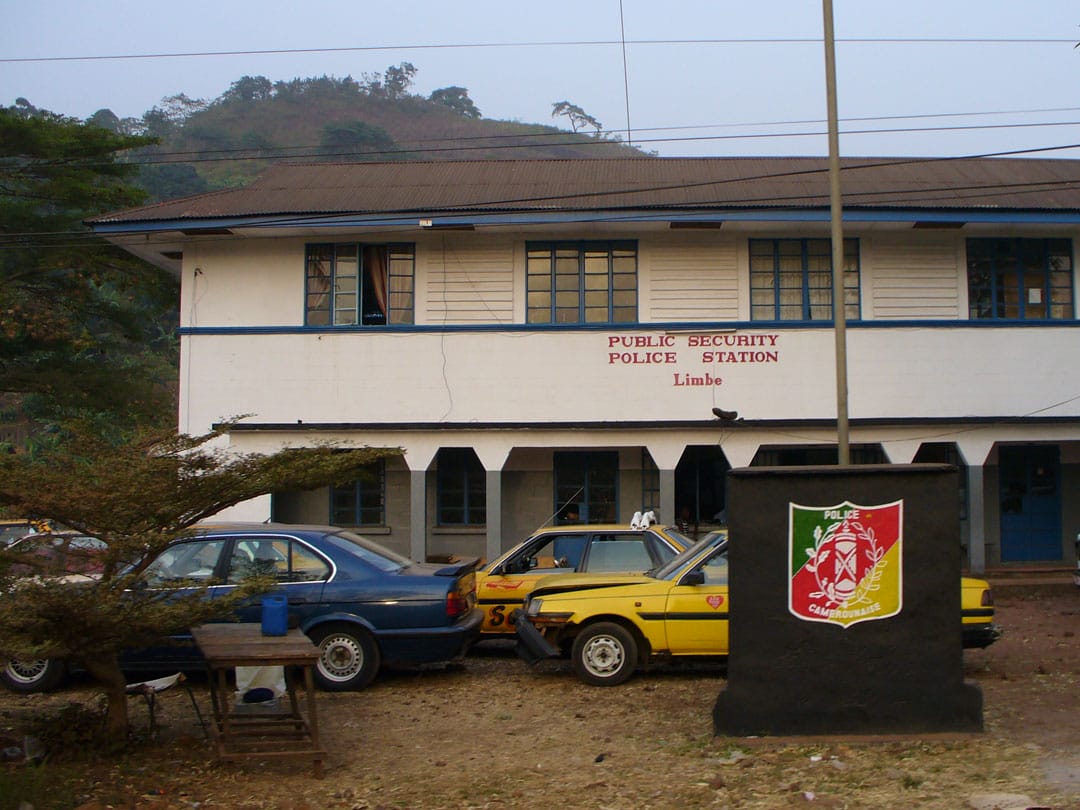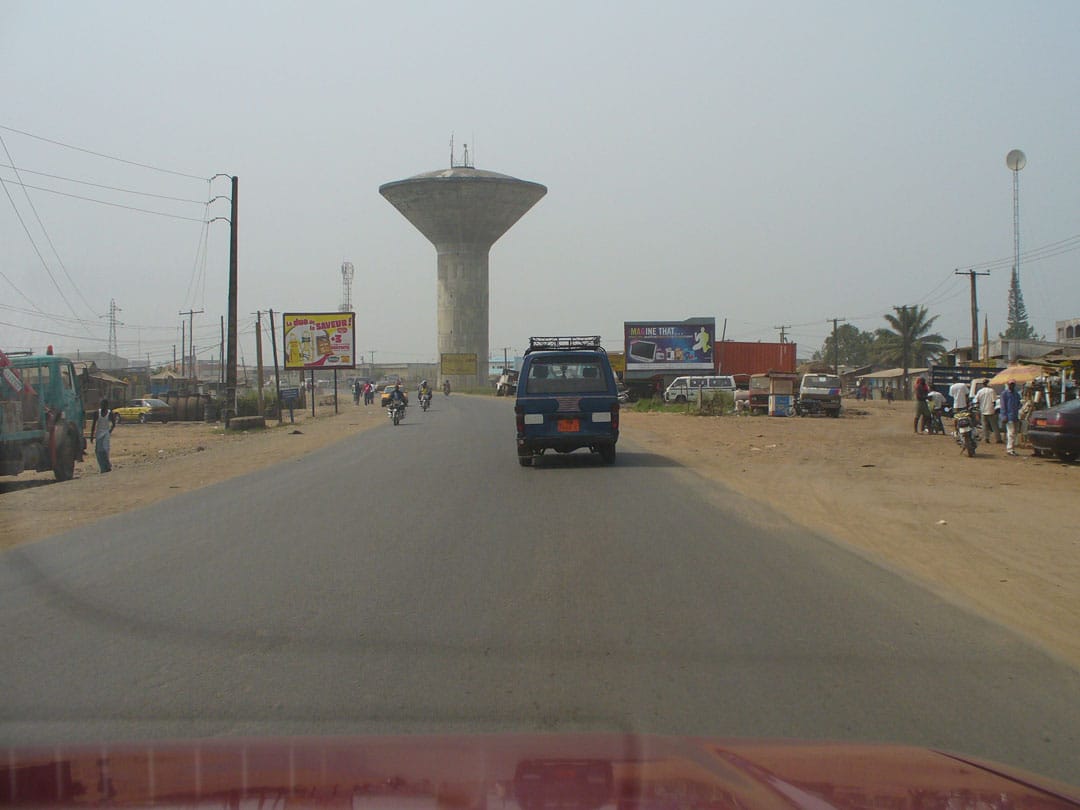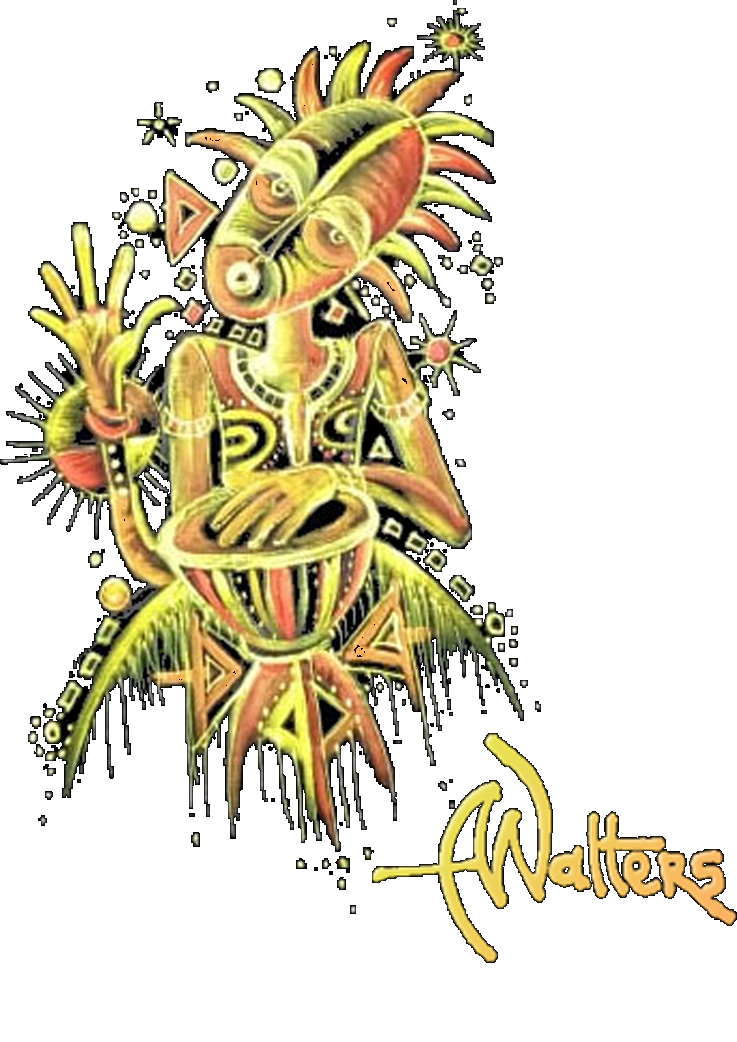Chapter 1 : Arrival in Africa
First, here is a brief overview and then the adventures begin.
I am in constant communication with Angu Walters – most often Facebook Messenger – but we have only ever met the one time, way back in 2007. It was a chance encounter and then one thing led to another. Now, I am retired and I help to sustain Angu and his family through worldwide art sales. I wire all the money from sales to the artist. I don’t keep anything but my walls are fabulous!
This is the travel journal of my visit to Cameroon and Kenya.
*In a nutshell.. I went to visit my American diplomat friend, Rob Heater, in Cameroon and we went on a road trip into the interior of the country. Leaving the hotel in the NW city of Bamenda we noticed some remarkable paintings displayed in the lobby. We looked on the back and found the artist’s phone number. He was just across town!
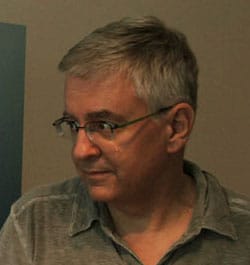
We both liked Angu very much. Big smile, easy laugh. Nice guy. We bought paintings.
Rob and Angu stayed in touch and pretty soon Angu dropped off a bunch of paintings to be offered for sale to the various numerous travelers whom Rob met in the course of his duties. That went really well, so when Rob got transferred to Korea Angu handed him a big roll of paintings to go on selling. Rob passed them to me, and I made this website, and here we all are.
As paintings sell, Angu refreshes my supply so I have dozens of African paintings mailed from the USA.
Chapter 1 : Arrival in Africa
Chicago, USA : January 16, 2007
“Take me to Africa!”
That’s what I said at the airport check in. I like saying that. Maybe I should say it more often.
I’m in Chicago, in transit from Las Vegas to Cameroon, by way of London and Nairobi. The total travel distance is well over 10,000 miles. My British Air flight doesn’t connect very well with the only flight from Nairobi to Douala, Cameroon so I’m going to spend a little less than one day on the ground in Nairobi before my Kenya Airways flight across Africa’s middle. After three weeks in Cameroon I’ll return to Nairobi and stay at Mount Kenya for another three weeks before going back home to Las Vegas.
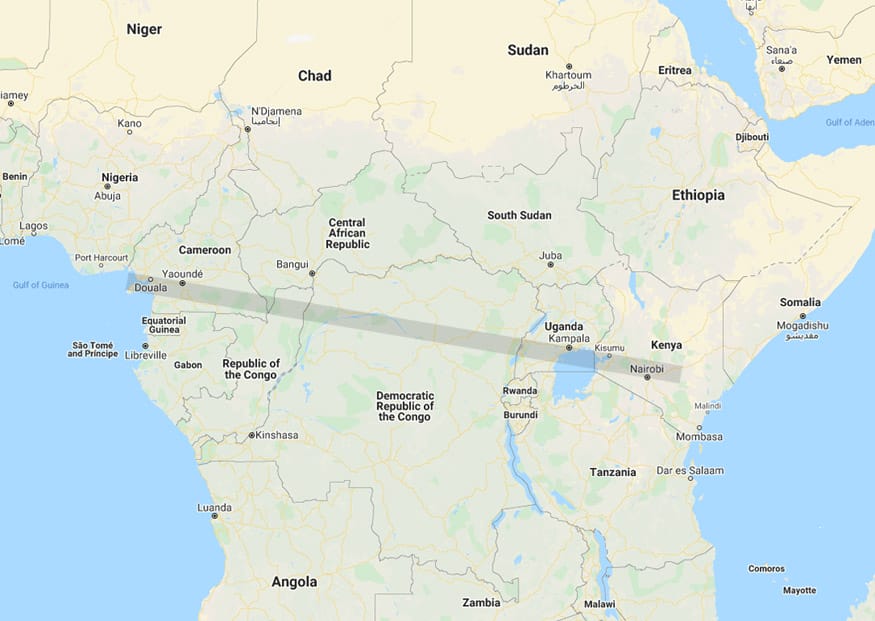
I’m visiting friends in each country. Why else would I be going to “the most disease-ridden place on the planet?” The doctor at the county public health office was speaking of Cameroon when he asked me about that. He has immunized me against Yellow Fever, Hepatitis A and B, Tetanus, and Typhoid. I’ll start taking daily Malaria pills when I reach Cameroon. But he told me they’ve got lots of diseases that don’t even have names yet.
Speculation about how I am most likely to die on this trip has been rampant for weeks. Besides the diseases, there’s also that situation over on Kenya’s border with Somalia. The Somali government is being propped up by Ethiopia and together they’re driving out the radical Muslims. It’s a little disturbing that they’re driving them in the direction of Kenya. So now Kenya’s military has mobilized to defend the border and keep the Muslims radicals out. Maybe they’re doing a magnificent job. Maybe they’re not. All I know is the Somali border is only a little over 200 miles away from Mt. Kenya. So I might get beheaded on CNN – if I’m still healthy enough.
There’s a [now expired] urgent travel advisory on the U.S. State Dept. web site regarding Kenya. Seems that crime is totally out of control in Nairobi. So maybe I won’t even live long enough to worry about getting sick or taken hostage!
But there’s good news too. When I get to Cameroon, I’ll be the guest of my friend Rob at the U.S. Embassy. Rob looks after America’s business in the city of Douala. I’m sort of a guest of the Embassy. That is probably good, right?
And when I get back to Kenya then I’ll be the guest of my friend Iris at the Mount Kenya Wildlife Conservancy. She’s been there for about 35 years. Iris doesn’t have status as a diplomat but she sure has lots of experience with Africa’s ways.
I am in good hands in Africa! And as an added bonus, Iris has arranged a driver and a hotel for me during my overnight in Nairobi. Somebody is at the Nairobi airport holding a sign with my name.
It’s an overnight flight to London so there won’t be anything to see. But London-Nairobi is an all-day flight. I’ll get to see the Alps and the Sahara Desert from the air from my window seat! So I must try to sleep on the way to Heathrow.
London, UK : January 17
I won the British (Airways) Lottery!
The flight was only about 1/3 filled overnight to London so I got three seats all to myself. I arrived all rested and refreshed. It was glorious. It’s early morning in London and I feel like I might stay up all day easily.
The flight to Nairobi leaves in a couple of hours, and then I arrive at 9:20pm after gaining another three hours. 11 hours time difference from Las Vegas. The far side of the planet.
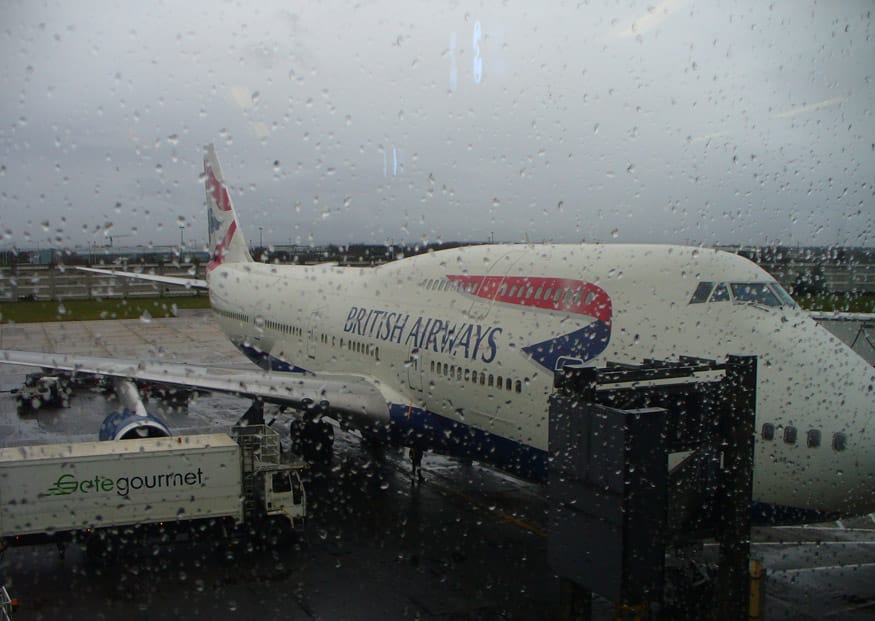
Swiss Alps : January 17, 2007
Lightening doesn’t strike twice
My 747 is filled to the rafters with a very diverse set of passengers.
We flew over top of some unremarkable English and French clouds earlier but now we’re in the Alps. Oh! This view of the mountains is fantastic! And it comes complete with scattered picturesque mountain villages. At some point, these become the Italian Alps, which are just as good. Only I can’t help thinking that probably there ought to be more snow here in January. Global warming?
On out over the Mediterranean. There’s still too much cloud cover to fully appreciate the famous shoreline. Rome is a little ways off to our left. I’m looking right and we pass Malta. I sure do appreciate these GPS locater displays. How else would I know with confidence that I’m looking down at Libya? Sudan is next. Creepy country. By now the sun is setting and there isn’t really anything at all to see. But now I can say that I’ve sort of been to Sudan. Yikes!
The sunset is a fiery red in the direction of what my GPS display informs me are the Darfur Mountains. Hell on Earth is just a little ways over in that direction.
[NOTE: Little did I know.. my diplomat friend gets posted next to Korea but then next after that he gets assigned to creepy Sudan! American civilians are not allowed to visit war-torn Sudan so this is as close as I’ll ever get.]
Nairobi, Kenya : January 17, 2007
I didn’t stay awake all day after all
Never seriously thought that I might. I’ve been napping on and off all through the 4000 mile flight. There are some big fires burning in ‘the bush.’ From up high and in darkness, they look like lines or circles of orange light. Not much else going on in the way of a nighttime view. I’m asleep again when we slam into Kenya and I let out an involuntary YELP. The Americans next to me laugh and I’m embarrassed. It really was a hard landing though.
I think the airport is better than I expected. In Johannesburg we had to walk down the stairs onto the tarmac, which is fine for a presidential photo-op but is a little retro for the rest of us. Here, we got the usual sort of entry directly into the airport. First stop, buying my visa.
Most peculiar system. I pay $20 for a transit visa this time. I’ll pay $50 when I come back. There doesn’t seem to be any point to these exercises other than to generate revenue. And the money is just scattered all over the guy’s desk. I might have thought that all this money could have bought at least a cash drawer. Visas can only be paid in U.S. dollars. With Bush working so hard at crashing it, I can’t help thinking they might have to switch over to Euros before long.
It takes a while for a filled-up 747 to disgorge all its luggage so it’s not very soon before my bag appears. Interestingly, there are large glass windows between us and the workers who are taking apart the big containers and transferring the bags onto the belts. I consider that there is probably a direct correlation between this glass and the fact that my bag shows up with everything intact. (In Johannesburg, the unions have successfully had the cameras and other security devices shut down, with the result that much baggage is now stolen.)
First stop, the little banking station. The teller is behind glass, and eating his dinner. I pass him $60 and he passes me me five notes with the number 1000 on them, plus a couple of coins.
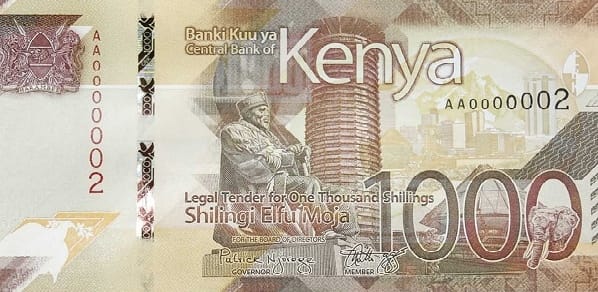
My driver is a woman with an easy laugh and passable English. She takes me outside and tells me to wait while she goes for the car. I notice a sign that urges arriving passengers to take an official taxi (“for your convenience and safety”). Who knows what the unofficial taxi drivers are up to. Several times I’m invited to get into one of the cabs but I decline. Thieves or not, they’re all very pleasant.
Nothing very much to see on the way in. My driver’s name is Pauline and she tells me she owns this car with a partner and, between them, they drive it 24 hours a day – all day, every day. I’m impressed! I ask if she would like to bring me back to the airport tomorrow, and she says yes.
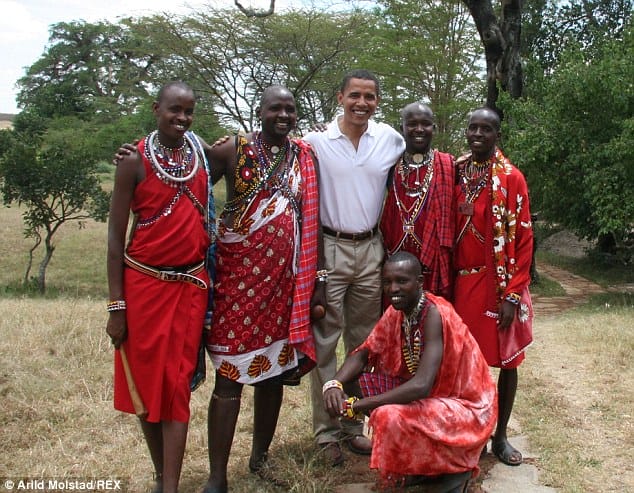
My hotel looks all right. It’s got a restaurant. The place is not at all scary, and not lavish either. It’s just exactly right. Before she takes my bags from the trunk, the driver hands me a large envelope with my name. Iris has left me something.
I notice that Pauline’s car has a cell phone number printed on the side, and I ask her if she’s got a card. No card. She’ll write it on my envelope. That works. And there is a room for me, which Iris has paid in advance. The driver takes note of my room number and we agree that she will be back for me at 5pm. All set.
While I’m filling in the registration card a very pretty girl in a frilly party dress strikes up a conversation with me. I can be so slow at times but I do catch on, even if a bit late, and then my registration card begins to demand my undivided attention. Finally, she leaves, but in doing so she sort of twirls so that her dress brushes my hand. I am much too involved with my hotel registration to look up.
Inside my room (alone) I dig out my converter plug – British to U.S. – and turn on my laptop. No Internet. I’m sure the hotel’s web site mentioned Internet. I call the desk and they tell me that it’s off for the night. “It will be turned on again at 8am.” There has been very little strangeness up to now so this wins the prize as the strangest Kenyan thing so far. Why in the world would they want the Internet to be shut off at night???
My package from Iris contains a personal welcome letter, a Globetrotter series guide to Kenya, a small book How to be a Kenyan, a magazine called TN – Travel News from East Africa, and a road map of Kenya, Uganda and Tanzania.
I open my patio door, which faces the back. It’s about midnight here and I listen to peculiar jungle-ish noises. I’ll see about that in the morning. I make sure my patio door is shut tightly and locked.
I shower and get into bed. It’s been a long time since I was able to do either of these.
Nairobi, Kenya : January 18, 2007
Breakfast in Nairobi
I wake up at 5am local time (It’s 6pm the night before in Las Vegas). Too early for Internet. Too early for sunlight. African birds are going nuts in the trees outside. I feel all rested and refreshed – again. We’ll see if the energy and wakefulness lasts a bit longer this time.
The restaurant is very cozy. I like it a lot. I’m the first in for the buffet. It’s got a veranda on three sides and has some kind of openings in the roof so that I can hear the sound of the birds with full force. I comment and the maître d’ seems to apologize for them. LOL. It wasn’t a complaint!
I think of my last African buffet, at Sun City in South Africa, and I wonder if we’re in any danger here of being overrun by hungry monkeys.
Seems that breakfast is included free with my room. So I leave a 100-whatsit note, as a tip. I have no idea if that’s too much or too little. (Surely it must be one or the other.)
In back of the hotel / restaurant is dense foliage. That’s where the birds are. It’s very nice. And right inside the city, too! There’s a bar here that looks out onto it all. This hotel is a very comfortable place.
On the way back to my room there is a lizard walking along the wall. Fine, just as long as there are no snakes!
I think I should probably just stay in the hotel all day and catch up on little bits of work, in between naps. I wish they would hurry up and turn on the Internet!!! And I’m expecting calls from both Iris and Rob. I feel like another nap now.
She is down in Mombasa on the Indian Ocean today. She’s much closer to Somalia than me and all is quiet. I’m to be comforted knowing that the Somali Muslims are not causing very much trouble anyplace in Kenya and I am unlikely to be murdered on CNN. I’m not actually worried about that, just amused that my friends are fighting over how to divide my travel insurance payout when I’m dead.
Iris says she only wants to inherit this journal, which is fine. Iris also reports that there being an international conference going on this weekend in Nairobi, the police will have deployed extra undercover police. This causes the criminals to back off for a few days and so I will probably make it out of the country safely.
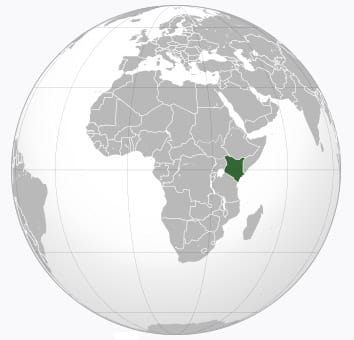
So, first I call Pauline. The operator must place this call for me so I do it from the lobby. I ask her to come at 4:30 instead of 5:00 and she agrees …I’m pretty sure. It’s difficult to understand her clearly. Then I call the airline and they tell me I need to be there not two hours early but three hours early. So now I need to call Pauline again. I ask the nice lady at the hotel lobby to please talk to her, figuring they’ll speak in Swahili or something and it will go more easily. But they speak English.
Only now they’re abruptly disconnected. The clerk says, “Pauline hung up on me! I wonder why she did that.” I laugh and say, “Well, it’s a cell phone. I think she was just cut off. This happens to me all the time in Las Vegas and I’m not surprised there, so I’m sure not surprised here.” Pauline calls back, and gets cut off again. The clerk insists, “She hung up again.” Whatever.
Maybe I’ll just take the hotel’s own taxi – but somebody needs to tell Pauline not to come in that case. She waited for me 45 minutes at the airport last night. I’d rather go with Pauline. Three hours early for a flight is just ridiculous.
At lunch I’m seated near a couple that’s in a room across the hall from me. He looks Dutch. She looks Kenyan. I imagine him to be a retired mercenary or hit-man on the run from Interpol, and she is his sex slave. Something rough about them both, and not quite right. And some exceptionally well-dressed Kenyan men – either businessmen or government officials; and probably corrupt in either case. Maybe this is an underworld hangout …or maybe I’m just influenced by the Jeffrey Archer novel I’m reading at lunch.
I end up taking a hotel cab to the airport, after my hotel clerk finally is successfully able to speak to Pauline. I notice there are no stoplights, and barely any discernable order to the movement of vehicles and pedestrians. Seems to me that stoplights would help matters but my driver seems to think this is fine the way it is. He points out the national capitol building on our left and the very nice Uhuru Park on our right. He tells me that ‘uhuru’ means ‘freedom’ in Swahili.
At the airport, Kenya Airways annoys me further by requiring me to check both my suitcase and my duffle bag. Up to now, I at least had a few things in the duffle bag in case of any mishap (lost or stolen luggage). Now I’ve got nothing but my laptop.
Nairobi, Kenya : January 18, 2007
Nairobi Airport Blues
[NOTE: This is the first of several times I’ll spend hours wandering and waiting in this airport. After passing through here ten times, I do not love this airport.
However, I felt just so sad and sick when a lot of the Nairobi Airport burned in 2013.]
The international arrival and departure units were completely destroyed in the fire. This airport is the major hub for all of East Africa.
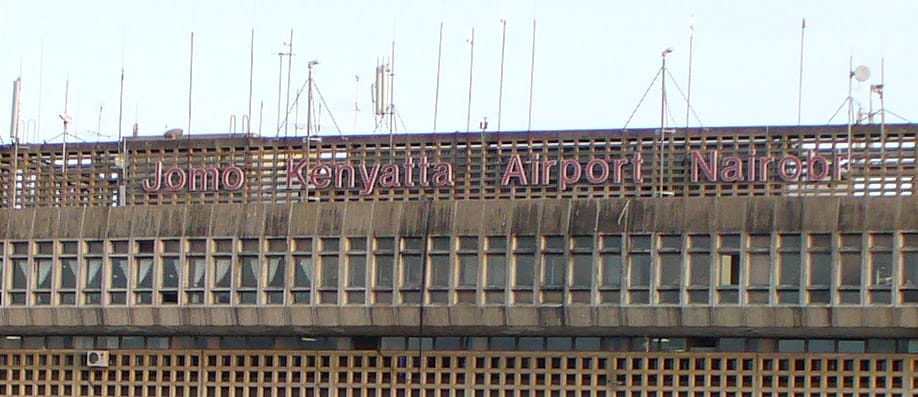
I look up from my book as a flight arrives and there is Archbishop Desmond Tutu with a small entourage. We nod at each other and smile. I never actually liked this guy but it’s still a pretty cool thing to look up and, surprise, here is a Nobel Peace Prize winner. I could boil down my issues with him to just a few questions, but it doesn’t seem quite the right time to ask them of him.
Tutu has got some explaining to do, concerning his simplistic view of Apartheid as pure evil and the ANC as pure good – ignoring the fact that all during Apartheid black people were fleeing black governments to get into South Africa while those same black governments fancied themselves the ‘front line states’ standing up to the pure evil that Apartheid is purported to be.

• My South Africa Travel Journal
…I digress.
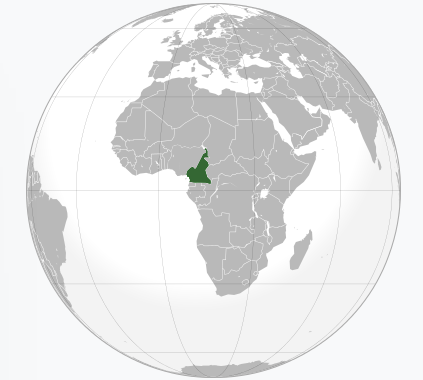
I can’t find a sign displaying gate assignments so about an hour before the flight I ask at the Kenya Airways counter for my departure gate. Gate 4. At Gate 4 they’re actually leaving to Zanzibar and Dar Es Salaam and I’m told that I belong at Gate 9. At Gate 9 I need to do the whole metal detector thing in order to enter the waiting area. I guess they’re not very confident about being able to secure the airport as a whole so they do each set of passengers as they board.
Only as soon as I’m inside secure waiting area, they announce that the flight will now depart Gate 4 after all. Sigh. When I go back to Las Vegas, maybe I should wear metal-free slippers, and do without my belt, and give away all my coins to beggars. I’m getting tired of dealing with metal detectors.
Douala, Cameroon : January 19, 2007
First in Line VIP
I normally don’t stand up until the movement of traffic in the aisle has allowed me to actually begin to move but I realize this is an exceptional situation because I’m in the very front of the economy class and the business class in front is near empty and most of these people are not getting off here. So I can be first!
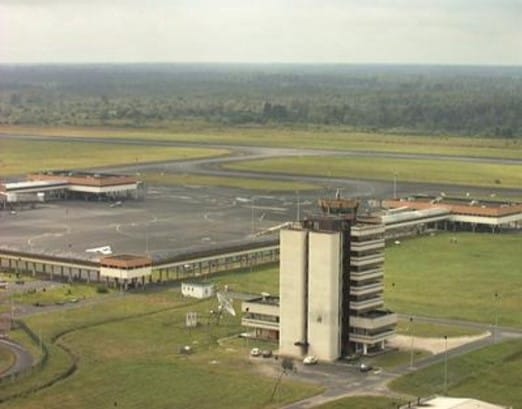
Unexpectedly, Rob has sent his regular driver for me. I’ve heard about him. Rob relies on him a lot. I forget his name but he’s holding a sign with my name printed on it. (And here, just by the way, I am the one and only passenger greeted by such a sign!) He takes my passport and goes to speak to the officers at the head of the passport control, and poof I’m special again and we are passed through to the (horrible looking) luggage area …where both my bags soon appear!!
Customs opens the larger of the two bags and looks inside for not quite one entire second and then we’re let outside into Cameroon. Bags are locked in the car and we go back. By this point I’m a little confused but it turns out Rob has arrived someplace else in the airport and we’re all going to meet up with the visa officer. Normally, you’re supposed to get your $100 Cameroonian visa before arrival into the country but it’s possible to get one issued at the airport under certain circumstances. Besides, the visa-issuing officer here turns out to be a friend of Rob. And Rob’s driver frequently greets officials here like they’re his best friends. Members of the U.S. Foreign Service are strictly forbidden to engage in bribery but there is no law against them being very, very friendly with the people who are in a position to make your job either easy or difficult. Everything goes easily and I get my visa stamped into my passport.
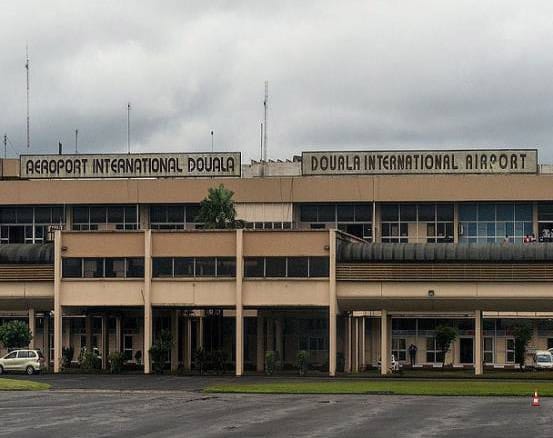
As when I visited Rob in Haiti, there is a gate and a guard. He honks and the guard looks out and lets us in. The house is very big. and the backyard and pool are enormous. Rob has official parties here for a couple of hundred people at a time so it’s a good thing it’s big. My room is at the back. There are metal grates on all the windows and my bedroom door is of steel which I am advised to bolt shut at night. There is a mosquito net over my bed. Rob suggests that there is not really any reason to begin taking anti-malaria pills until after I get my first mosquito bite.
Yaoundé, Cameroon : January 19, 2007
Be ye gone Jet Lag
Despite my countless many naps yesterday, I have slept soundly until it’s time to wake up early and drive to Yaoundé. Maybe by now I’m adjusted to the 9 hour time difference!
The meetings in Yaoundé mostly concern the two American schools in Cameroon. Rob is working at getting greater cooperation between the two and so we collect some passengers who represent the Douala school and we set out. It’s about 150 miles and we travel in a 9-seater SUV.
First thing everybody remarks on, in the early morning, is how bad the dust and sand in the air has become. It looks like fog but it’s actually what’s blown in from the Sahara Desert. Nasty. (How exactly a rain forest finds itself located so near a desert is something of a mystery to me but I let that go.)
Shopping is available right from your car window in Cameroon. Anyplace the traffic slows, there are apt to be lots of people – mostly children – selling things.
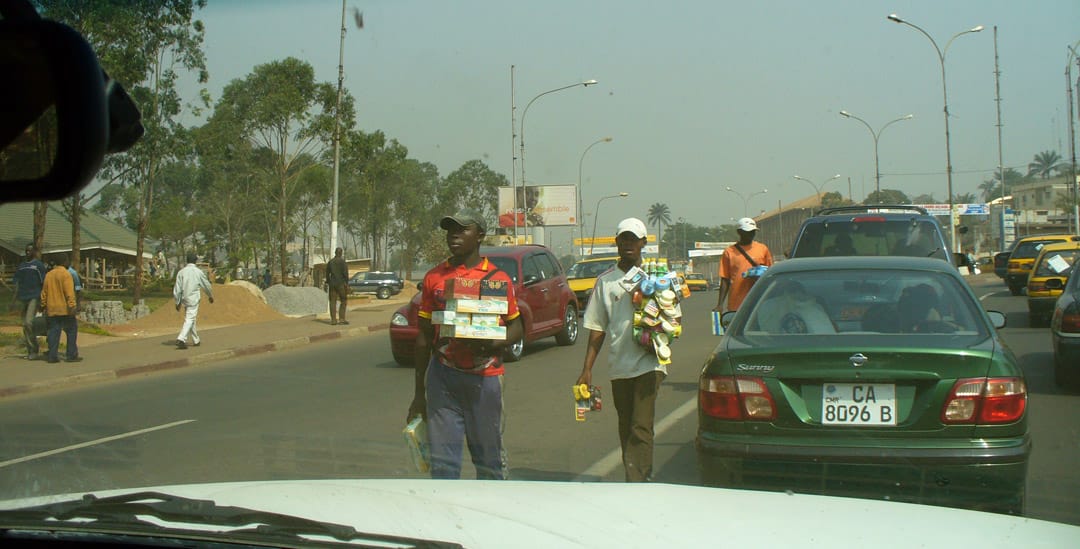
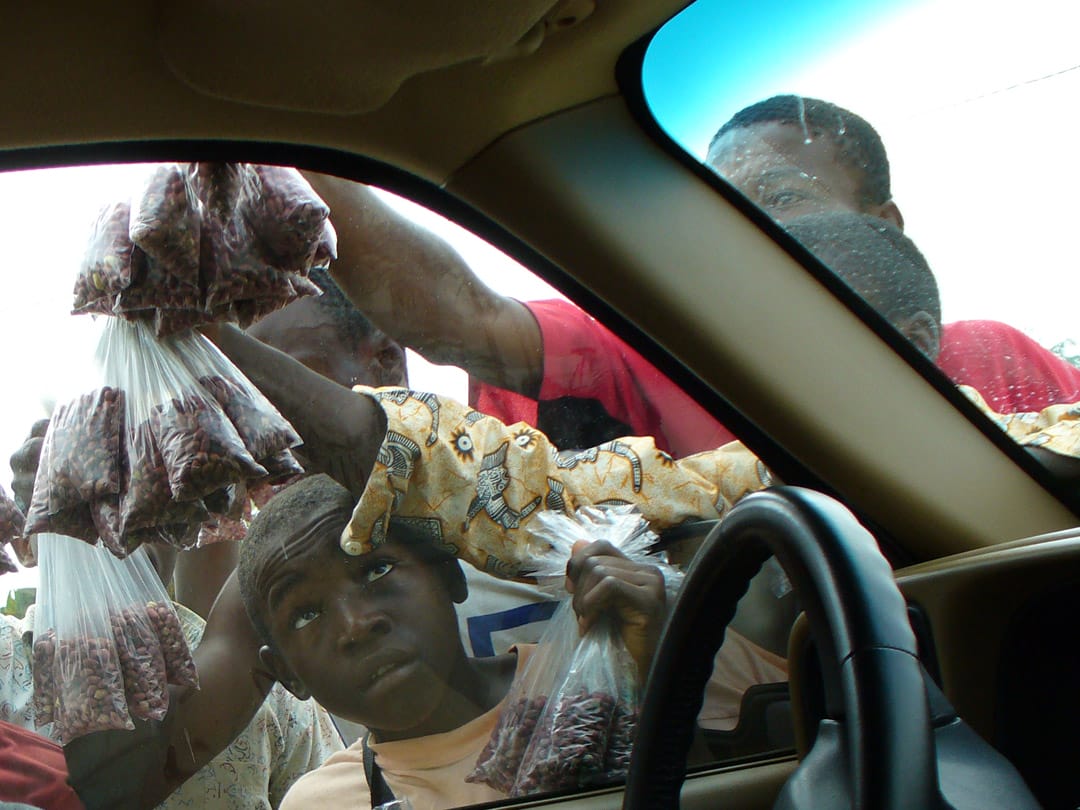
Traffic is better than usual, they tell me, and it hardly ever comes to a complete stop. There is a lot of commerce going on beside the road, and when traffic slows a lot of it spills out into the road, with young people waving all sorts of things available for sale. We buy some bags of nuts and some bananas. Both are excellent – tree ripened bananas are a lot better than those you get in an American grocery store (which are always picked green).
I’m horrified by the slabs of beef – or perhaps more likely Bush Meat – hanging in the open near the side of the road. Cameroonians seem to have very little appreciation for the problems caused by germs. Rob mentions that we’re passing an area that was recently hit by a bad outbreak of Cholera, with hundreds dead. And right away, there is a river. You mean there is cholera in that river right there? Yes. If not now, then recently.
[NOTE: Below, this will turn out to be my favorite photo from Cameroon – and on the very first day! Of course, that’s not counting anything to do with Angu Walters which turns out to be life-changing for us all. This dreamy photo captures something about Cameroon, that proverbial “1000 words”]
The people insist on believing that if only water is clear then it can’t cause them any problems. And they ridicule anybody who says differently as being “too white.”
Sounds like the root of their problem may be education. We pass lots of children in their school uniforms. I comment that these kids would not make it in Haiti, where the school children dress astoundingly well. No Haitian parent would allow these children out of the house dressed like this. (Every other thing in their lives is horrible but Haitians always dress well for school.) And we pass a school which looks to me like a poorly-maintained barnyard. I must try to get a picture of one of these schools.
Leaving the city, we enter a sparsely populated jungle. There are some beautiful views here. I notice a lot of logging trucks. They each carry just three or four thick trunks. I’m sure they’re extremely valuable rainforest hardwood. Probably coming from the Central African Republic, Rob says. In Cameroon, logging is very restricted and that explains why the rainforest is looking good here, at least from this highway. No problem of deforestation – which has pretty well destroyed Haiti among other places. The logs are being taken to the big port at Douala.
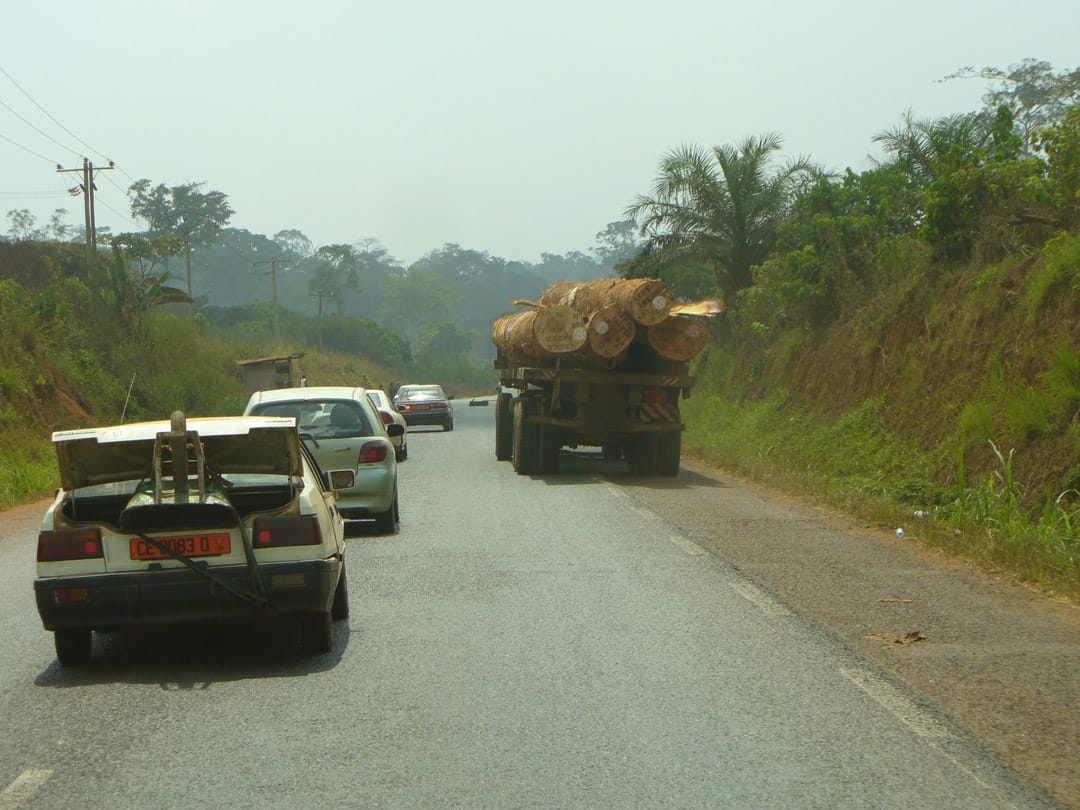
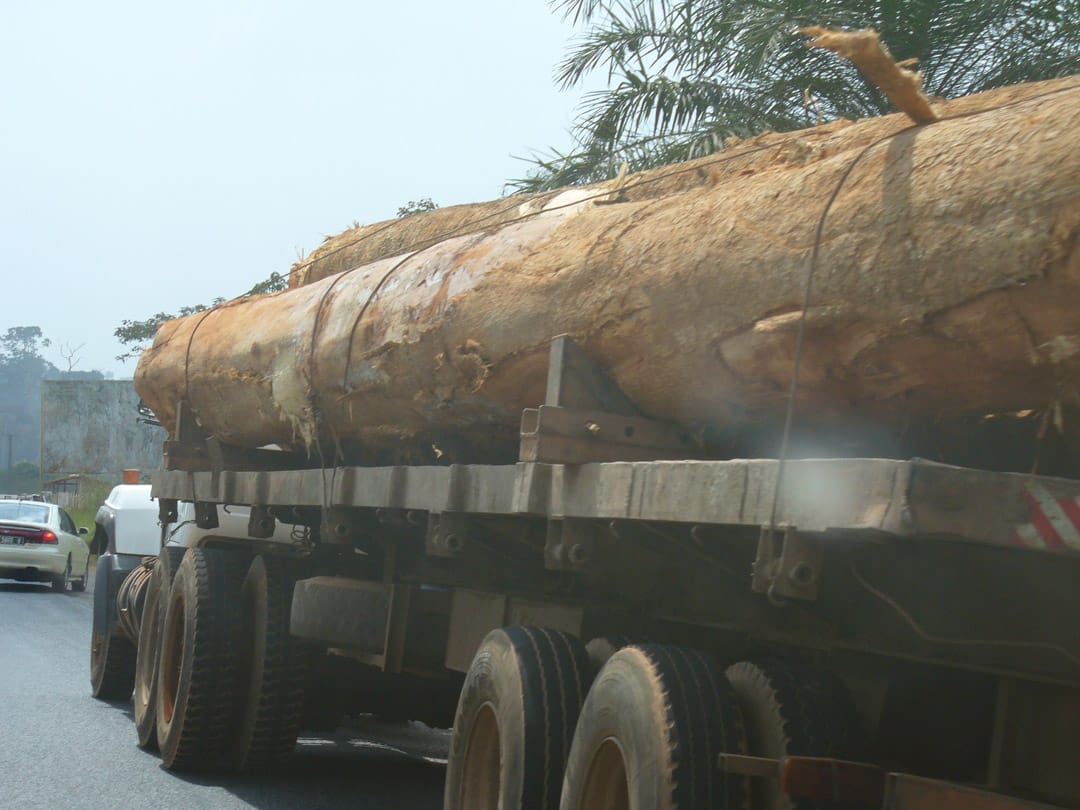
It’s a dangerous road and we frequently see signs indicating “3 morts ici” or even “27 morts ici.” It’s only the one winding lane in each direction most places. Rob says it was supposed to be built as a much safer divided highway, with two lanes in each direction but when it was opened then everybody was surprised to find that half of it was missing. Government ministers stole the other half of this most important highway in the country, and so crippled the economy for years to come.
Yaoundé, Cameroon : January 19, 2007
Arriving in the Capital City

(Haiti has no busses, not even any cabs. Public transportation is handled solely by a bizarre system of privately owned pickup trucks with passenger seating in the back, and this poor system is among a large number of reasons why that economy never develops.) This new bus system is of world-class quality and Rob is excited for me to see the bus station in Yaoundé. It’s on the edge of the city, as busses are not allowed in the city center, which seems to us like a mistake.
We make our way to the U.S. Embassy passing the French Embassy, which is very plain, though big. The Canadian Embassy is so little that I barely notice it even when it’s pointed out to me.
The French Embassy in Yaoundé, Cameroon. Below. It doesn’t look anything like a typical embassy:
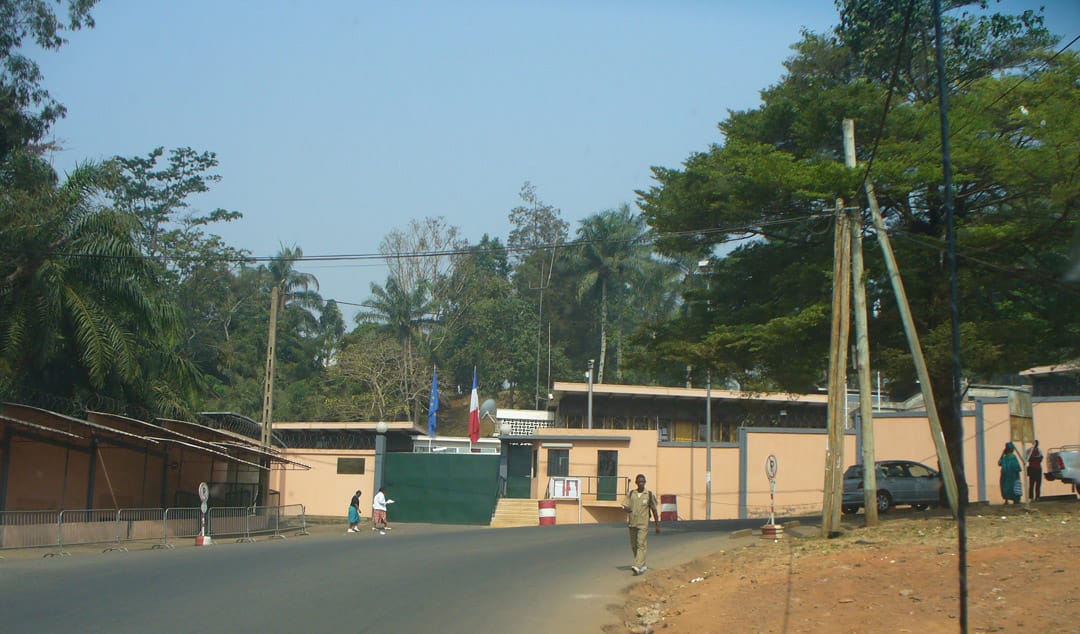
A little later we see in the distance where they’re building a new mansion for the president, up on a hill. And after turning onto the street where the American Embassy is located, they’re building another mansion for the president’s wife. Separate bedrooms, okay, but why does she need a separate mansion? Rob says a lot of people wonder that but since, officially, the mansion is being built “with her own money,” officially, it’s not really anybody else’s concern.
Paul Biya has been president of Cameroon for about 25 years.
[NOTE: Obviously, the group photo below is from later but I like it better than what I had in its place originally.]
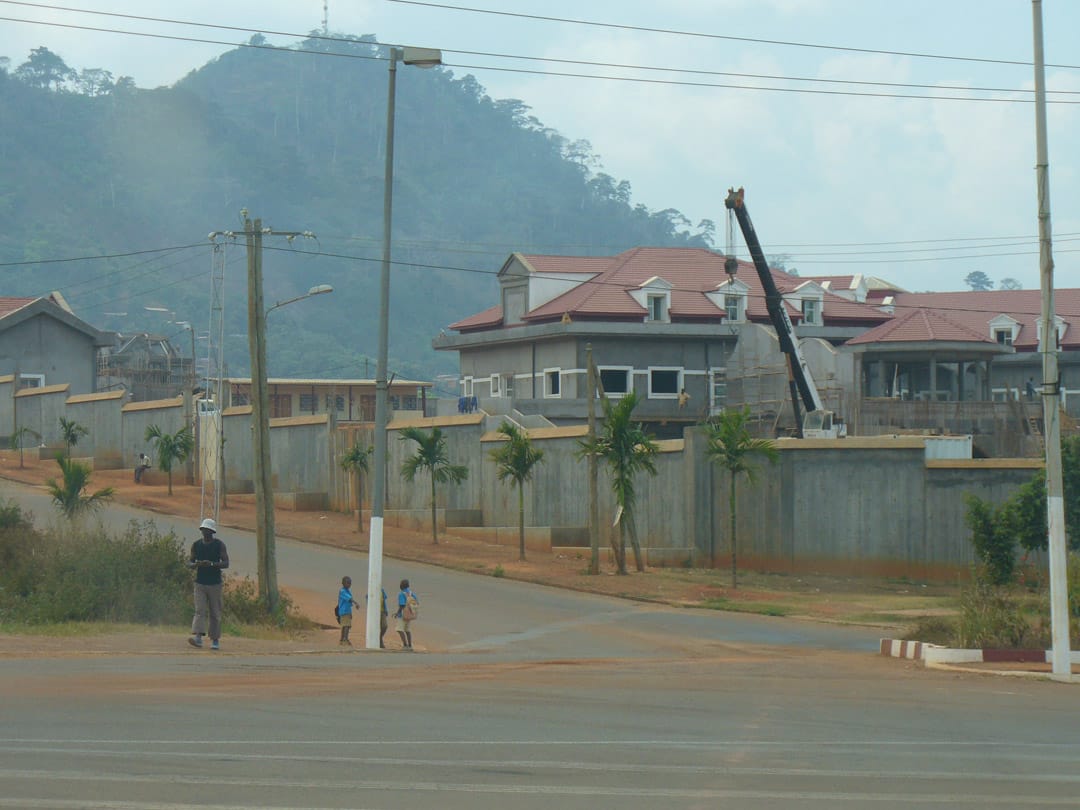
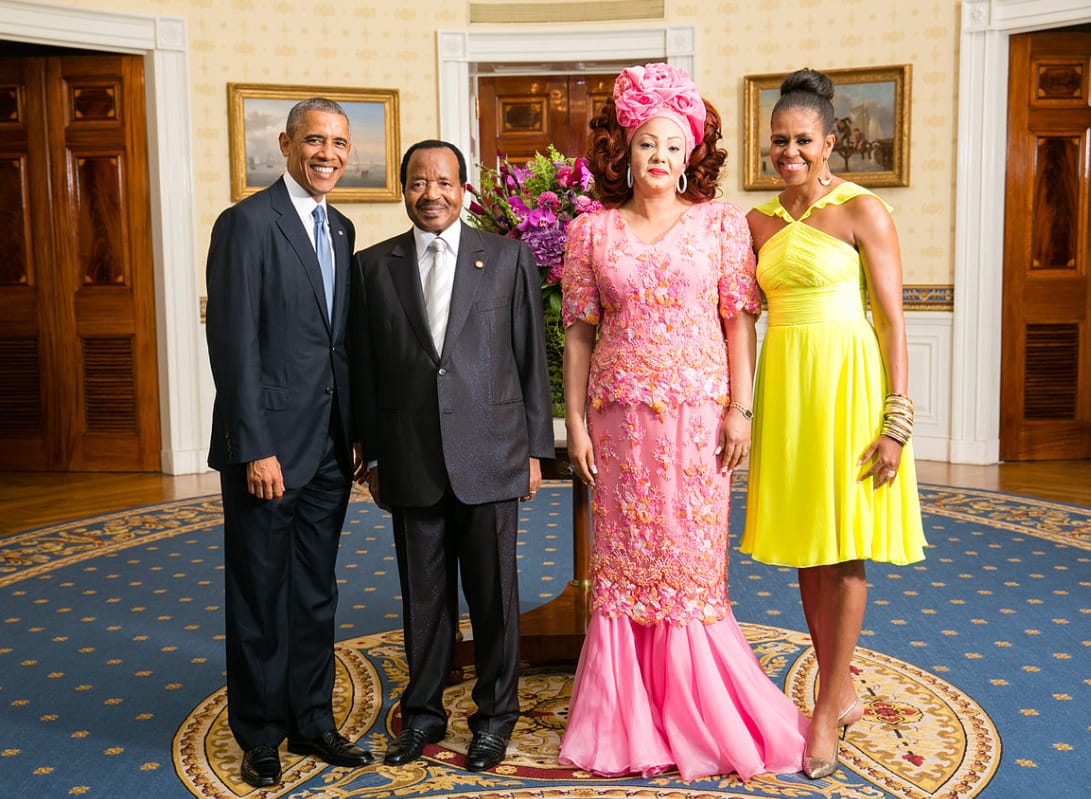
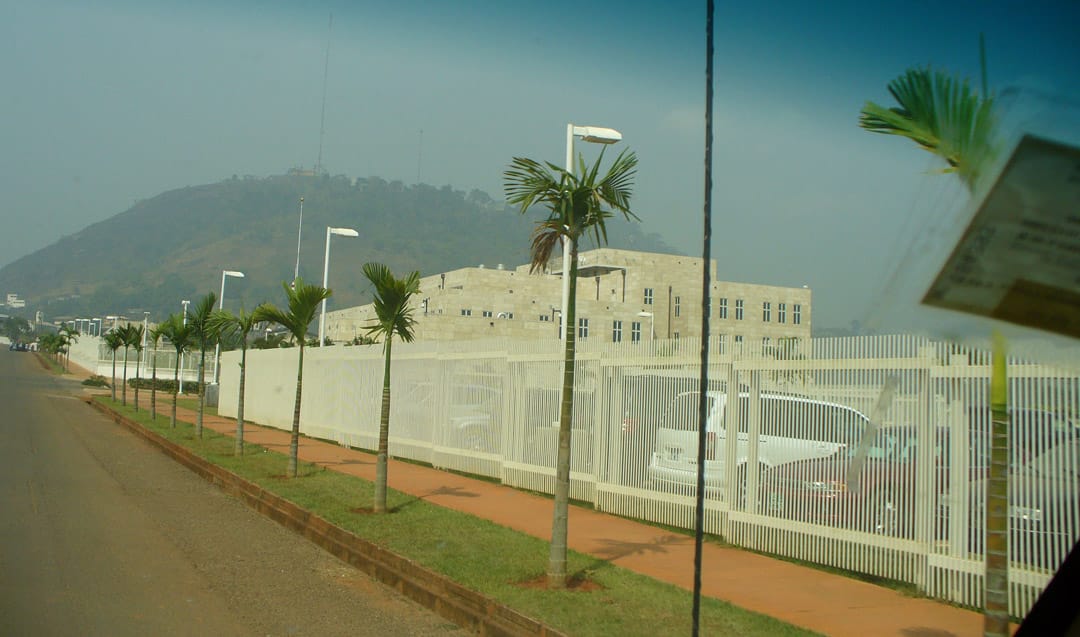
The American Embassy is marvelous. Definitely the most beautiful building that I’ve seen here. It was built to the highest security standards following the East Africa Embassy bombings. Some of us have got security badges and some of us do not, including me of course. But I trade my passport for a visitor badge and the Marines let me inside. Actually, it’s a private security company, Wackenhut, that handles the outer perimeter and the Marines only handle the inner sanctum, behind the blast doors.
Rob needs to visit the little store inside the embassy where staff can buy familiar American things tax free (including Captain Crunch cereal, I notice). He oversees it, although he lives far away and seldom visits here. A little odd, but I guess it doesn’t need much supervision. The manager seems to be doing a fine job.
Then Rob is off to meeting #1 of the day and the rest of us travel across town to one of the embassy’s guest houses where I take a nap. But first, we pick out our rooms in this big house. I get a déja vue. Our small group wandering in an unfamiliar big house… it feels like the beginning of any number of horror slasher Hollywood movies.
For some reason, this U.S. government house lacks internet. The Japanese ambassador lives right next door and I can see his wi-fi but he has thoughtlessly got it password-protected.
Rob wakes me for lunch, which is meeting number 2. It’s at a Russian / French / Italian restaurant called Salsa. Strangely named, but it’s fantastic. It’s in a garden with a good view of the national parliament on a hill. I remark to the Cameroonian woman seated next to me that I hadn’t expected such luxury here, that my friends figure I’m probably eating monkey brains or something. She says there are world-class restaurants in Cameroon, especially back in Douala.
During and after lunch there’s a lot of talk among the 13 people at the table about how the two American schools need to more closely coordinate what they do. There are over 300 students in the two schools. Tuition is very expensive.
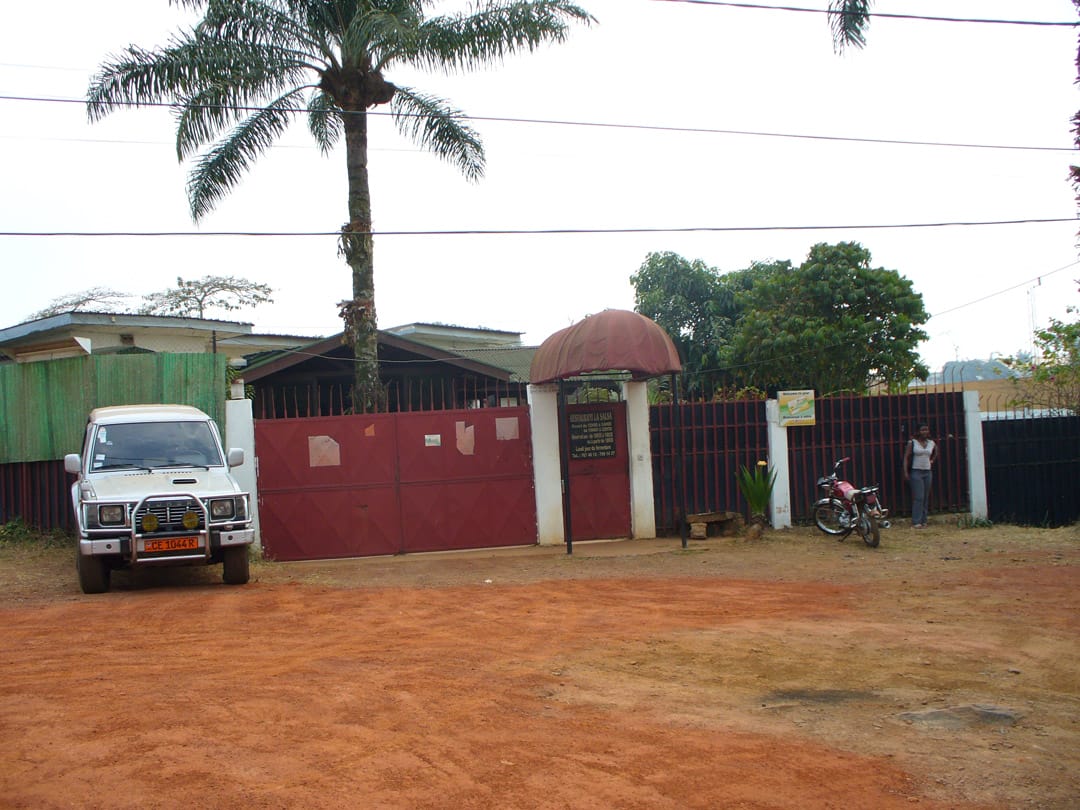
About 1/3 of the students are Cameroonians, including the president’s own son. Americans send their children here so that they’ll be easily able to adjust to an American school when they’re posted back home. Others like the American schools (which are located in most countries) because it puts kids on a good track to acceptance at an American university, and these typically include both children of diplomats from anyplace and children of local elites. (Diplomats have their tuition paid by their home governments.)
Leaving the restaurant, I genuinely admire the avenues and the hills. There clearly has been some considerable degree of city planning here. With not very much more effort, Yaounde could be well on the way to being spectacular. The only really strange thing is the great troughs along side of the road. They’re about 3 feet deep, and appear dangerous. They’re needed during the rainy season, when it rains so much it makes you just about go mad (according to all reports I’ve heard). Happily, this is the dry season. I kick myself repeatedly for forgetting to bring my camera along on this outing.
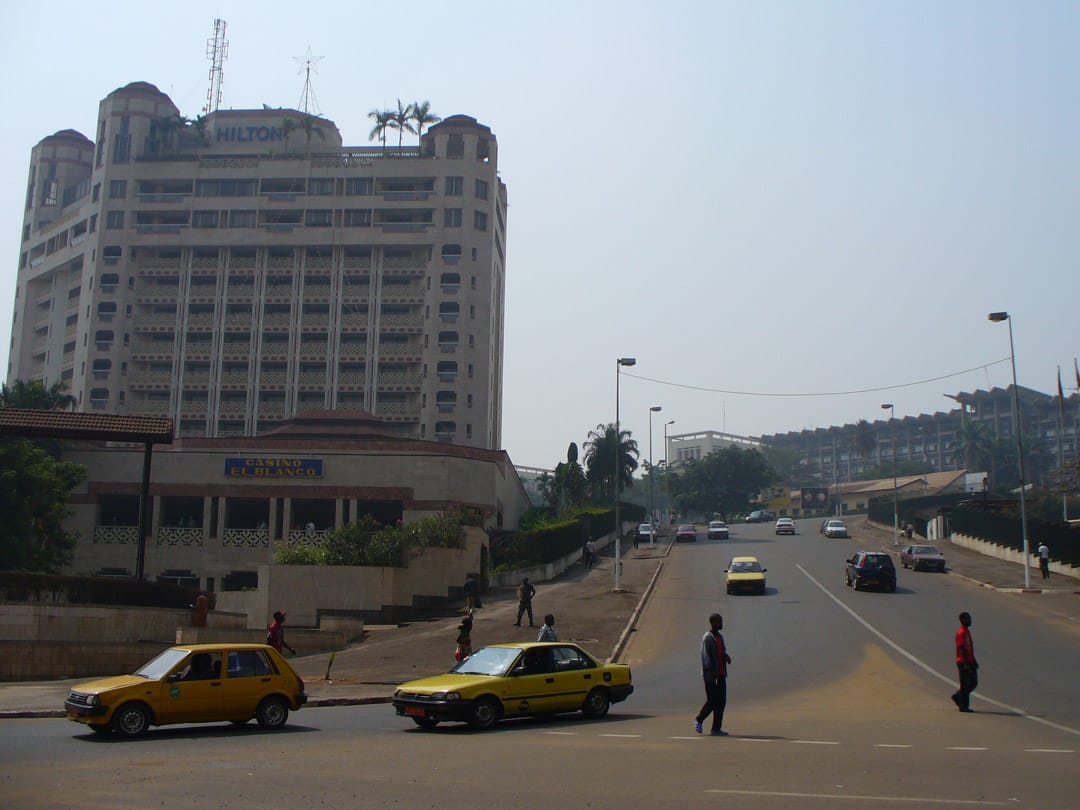
One of Cameroon’s problems is that in order to buy off assorted regional and tribal interest groups there are currently 55 ministers in the government. We pass a lot of government ministries. My favorite is the Department of Scientific Research and Innovation. I can’t imagine what they’re doing in there.
Similarly baffling is the government ministry concerned with the well-being of albinos. Rob says there are lots of them here.
We’re going to drop some people at the American school. I’m surprised by the soldiers with guns waiting outside the gates. Yikes! But they say it’s nothing. It only means the president’s son is inside. At the gate the guards (both local and presidential) inspect our SUV for explosives.
We need a few things for the house, including drinking water, so we stop at a big grocery store. In Haiti, a store like this would have two or three guards outside with shotguns but there are no guns in evidence. What is exactly the same as Haiti is the Arab owners in an office area that looks down on the checkout area and the exit. Arabs have been expert merchants for thousands of years, and they’ve taken their skills to a lot of remote places in the world.
The prices are outrageous – and recall this is not even the expensive city. Rob waves a little cheapo coffee maker. How much in the USA? I venture, “$12 at Walmart.” Here, it’s $40. Most of the country’s tax revenue comes from its import duty and that shows up here.
Back at the house, I intend to take another quick nap but, unfortunately, I sleep about 6 hours and wake up at 11pm. This jet lag thing is going to take some more time.
Yaoundé, Cameroon : January 20, 2007
I love the sound of the jungle birds but that dove right outside my window is really bothering me. Despite that, I’m sleeping a lot. I wish I could get firmly onto the West Central African time zone. At least I don’t seem to have any mosquito bites yet. This house didn’t come to us equipped with nets. But we’re at much higher elevation here so possibly malaria is rare.
A sore throat is bothering me too. Everybody says it’s normal, on account of the Sahara Desert. And I cough up dusty flegm every so often. The dust is less here than back in Douala, where we’re going today. I hope they have more seasons in Cameroon than just the relentlessly pounding rainy season and the Sahara dust in the air season.
On the Road : January 20, 2007
African Near Death Experience #1
I’m happily taking lots of pictures of jungle on my right, and people and other things up ahead of us. On the road between the two cities there are three toll stops. Each of them costs 500 of these Central African currency thingies, which comes to about $1.00.
You pay and you get back a receipt from the person dressed in bright orange standing in the road. Because traffic slows here, there are also lots of people selling things (nuts, bananas).
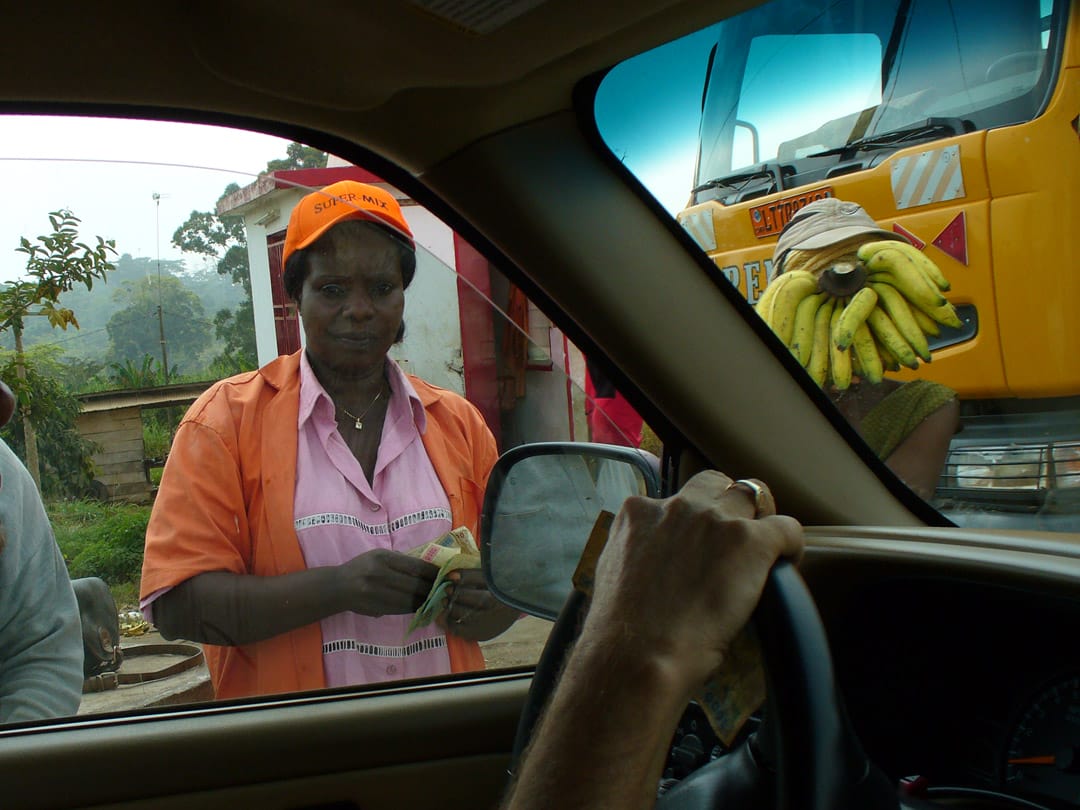
At the second of these stops, I’m holding the camera on the dashboard in front of me and taking some pictures of the scene when this young man begins shrieking and waving and pointing and chasing us.
He catches up to us when we stop to pay the toll and he is unbelievably furious about the camera. He is perfectly hysterical. The toll-taker joins in, saying something about the camera, and there is somebody else on the other side of her who’s got his face in the window and he seems to agree the camera is an abomination. I was just totally stunned, speechless, confused – and alarmed (even inside our solidly built V8 powered SUV).
Rob quickly gives up on his insistence that the toll taker give him his receipt and his 500 in change, and drives away. He figures she was just taking advantage of the opportunity to resell the receipt and also keep his change. The equivalent of $2.00 goes pretty far around here.
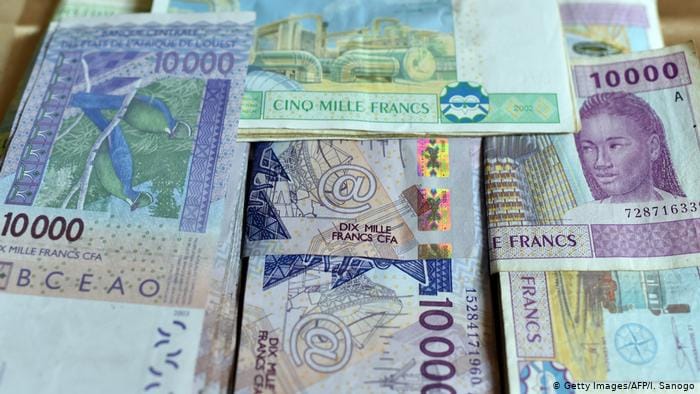
This pattern of behavior is familiar to everybody in our vehicle, but I get the feeling that this particular incident is above average in its intensity. Nobody has a clear idea what is the cause of it. Maybe they only want to be paid for the use of pictures of themselves, but that doesn’t seem to account for this kind of wild-eyed intensity. More likely, it’s religious / superstitious. I remember an old Tarzan movie – could have been the original – where the natives are fretting that photographs steal people’s souls, or somehow reduce lions to paper replicas (removing them from the world). I forget the details of how that worked. Whatever the fear exactly, I had no idea it still existed – and with so very much force!
Have I mentioned previously that there are no tourists here? One can easily see why. A single headline like “Tourists Torn to Bloody Bits by Angry Mob for Crime of Taking Pictures” would put a complete stop to any little bit of tourism in a real big hurry.
I sure appreciated our government issue SUV tank today!
There are dangers everywhere in Cameroon and I think this proves that, try as one might, one cannot reliably anticipate and avoid all of them.
Douala, Cameroon : January 20, 2007
A Night in Havana
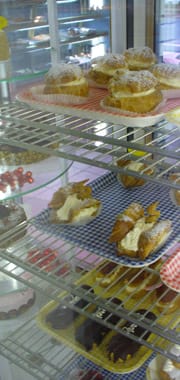
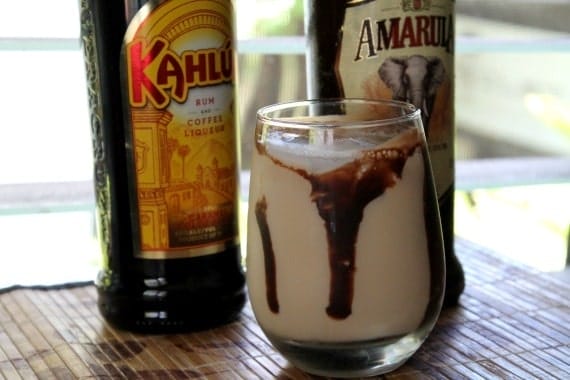
Add to that, they don’t like white people. Any white people. Rob says if he wants a good price for something he always sends his maid. Her price is a lot better. (Her name is Marie Claire. Every time I hear her name I think of a pastry named Mare.) Rob tells one story of buying something. The maid was with him and she objected that she knew the real price to be much lower. That’s when owner made clear that he would prefer not to sell the item to a white person at all, felt he was compromising his principles, that selling to whites is degrading. So it’s all much more deeply weird than just trying to charge as much as it’s believed that the customer can afford to pay.
I get to bed at about midnight – and without one single nap today. I’m completely in the right time zone!
Southwest Province, Cameroon : January 21, 2007
A Day at the Beach
The beach is close by, in the direction of Nigeria. And they speak English over there, unlike here in the Littoral province.
Cameroon is officially bilingual. The president doesn’t speak a word of English and there are large regions of this small country where he has never bothered to visit. In polite terms, he is considered to be ‘aloof’ by certain ‘restive’ elements of the population. Particularly the English-speaking elements. The Southwest Province had the opportunity at one time to be joined with Nigeria. They would have preferred independence. Instead, they got piled in over here with the French.
[This whole English vs. French thing became far worse in later years and is referred to as the Anglophone Crisis.]
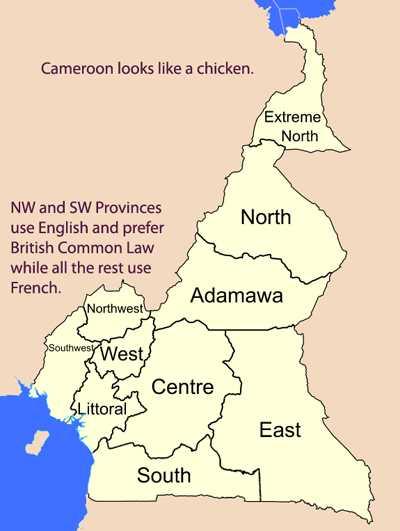
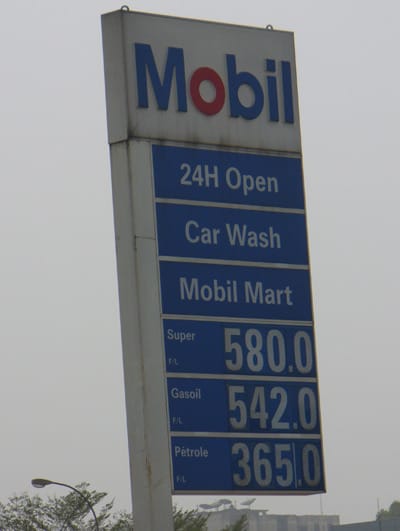
On the map, the English provinces are the chicken tail. The port city of Douala is in the adjacent Littoral Province there where you see some blue harbor poking in from the Atlantic.
We stop for gas and Rob leaves me all by myself to deal with four perfectly beautiful children who come up to my window begging. They don’t seem to speak either French or English but they’re holding out empty blue bowls which makes their purpose quite clear.
I have no local currency at all or I’m sure I would happily trade some money for some pictures, but neither of us gets what we would like. Rob says it’s a bad practice to give money to children here. Their parents send them out begging in place of sending them to school. He says they might be refugees from Chad. I told him I need to get some ‘adorable children’ pictures at some point.
The currency here is the CFA Franc which is worth about 500 to one U.S. Dollar. Pronounced SEE-fahs. The price of gasoline, measured in liters, comes out to something in the neighborhood of $4.50 / gallon.
On the way out of town, Rob tells me that the president appoints all provincial governors and mayors. There is no independent local authority.
Here is a roadside shop selling beef..
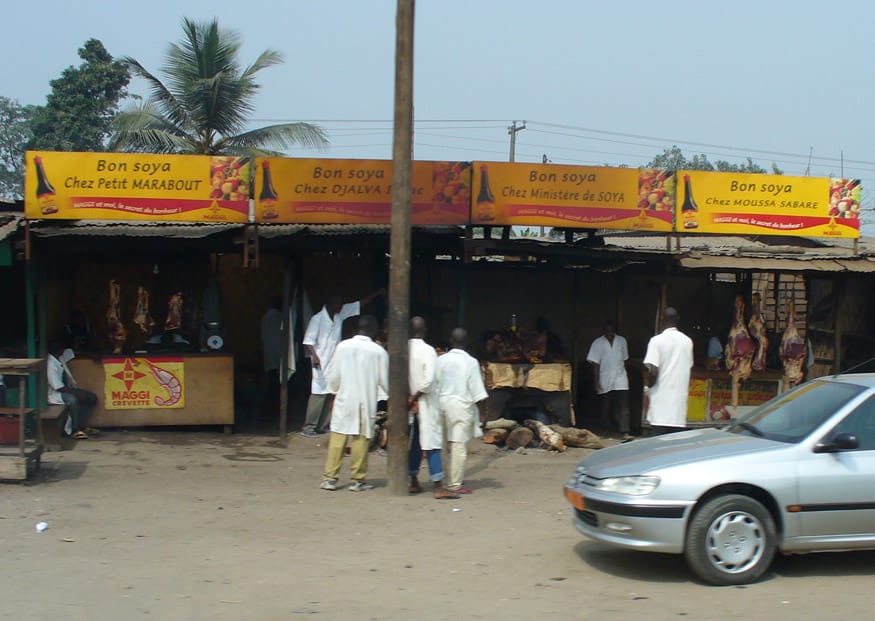
Rob tells me some stories about how hard it is to operate a private business here. The sister of an acquaintance of Rob’s opened a tiny restaurant in Yaoundé. The total investment was about $700. During the first week, she was visited three times by government officials demanding payment of about $2500 in taxes. So she closed her new business.
From the perspective of the rest of the world, it looks like we have tried long and hard and at great expense to try to help Africa to get onto its socio-economic feet. But from here, it looks to me as if the widespread poverty here may be entirely deliberate. The elites may actually prefer to have 99% of the people living in absolute poverty.
That said, the poverty here doesn’t seem as bad as in Haiti. But Haiti also has a ruined environment – including deforestation and a shortage of fresh water. Here, it’s at least possible for people to live off the land. I saw starving children in Haiti. I have not seen anything like that here. At least, not yet.
We pass a rubber plantation, a banana plantation, and a palm oil plantation.
I had no idea what a rubber plantation would look like. Turns out, the trees are quite narrow. Each tree has a small cup attached, and that’s what collects the sap – much like maple syrup.
Each of the banana bunches has a blue bag with lots of holes tied around. Somehow, this improves the quality of the banana but I don’t know how exactly. Its run by the Del Monte company. Their quality standards are very high and very specific.
Children get to come and collect the sub-standard bananas. Rob said there was a minor scandal hereabouts, allegations of child labor, but there was nothing to it. Busy-body do-gooders. Del Monte pays their workers well and if children come onto their property and take away the left-over bananas to benefit their families then it’s no fault of the company’s.
The dust in the air is real bad for picture-taking today (not so good for my throat, either). So Mount Cameroon is hard to see. It’s a surprise when the road makes an abrupt detour at the point where the last lava flow ended in 1999. The 4th photo before is from Wikipedia just so you (and me!) can see what it really looks like. Recall, pretty soon I’ll be at Mt Kenya, Africa’s second highest mountain.
It’s getting late and we absolutely must return to Douala before dark. It’s not safe to drive at night… err, well, it’s never actually safe to drive here. But it’s markedly less safe to drive in the dark. And it’s against the embassy’s policy to drive outside of the city after dark.
However, we do have time for a quick stop at a café in another absolutely beautiful place. Really unbelievable.
We cross a stream over a bridge and ahead we can see affordable beachside vacation cabins. At the end of the short road is a little café teetering at the edge of a vertical cliff. The view is spectacular.
Besides the amazing view, it’s also amazing that a place with such a fantastic view should be so under-developed. I’m not complaining! Just it’s amazing. Out in the rest of the world, a place like this would hold a world class resort. Here, we are practically alone.
These ocean views are right from our table which is right atop a cliff. I couldn’t quite have flicked a penny off the table and hit water, but I’d have come close.
There were a lot of little islands all around. After a while a couple of boats appeared. Then this beautifully-colored lizard wandered past. What a perfect place!
You’ll never guess what the bill was for two small salads, a bunch of bread, one beer, and one soft drink… US$5.
We got back to Douala city limits before dark but it was dark before we got home. I was perfectly amazed by the number of motorcycles driving around without headlights. And practically no Cameroonian ever wears a helmet (it would be too “white”). A lot of cars don’t use headlights either! No wonder it’s considered unsafe to drive here at night!
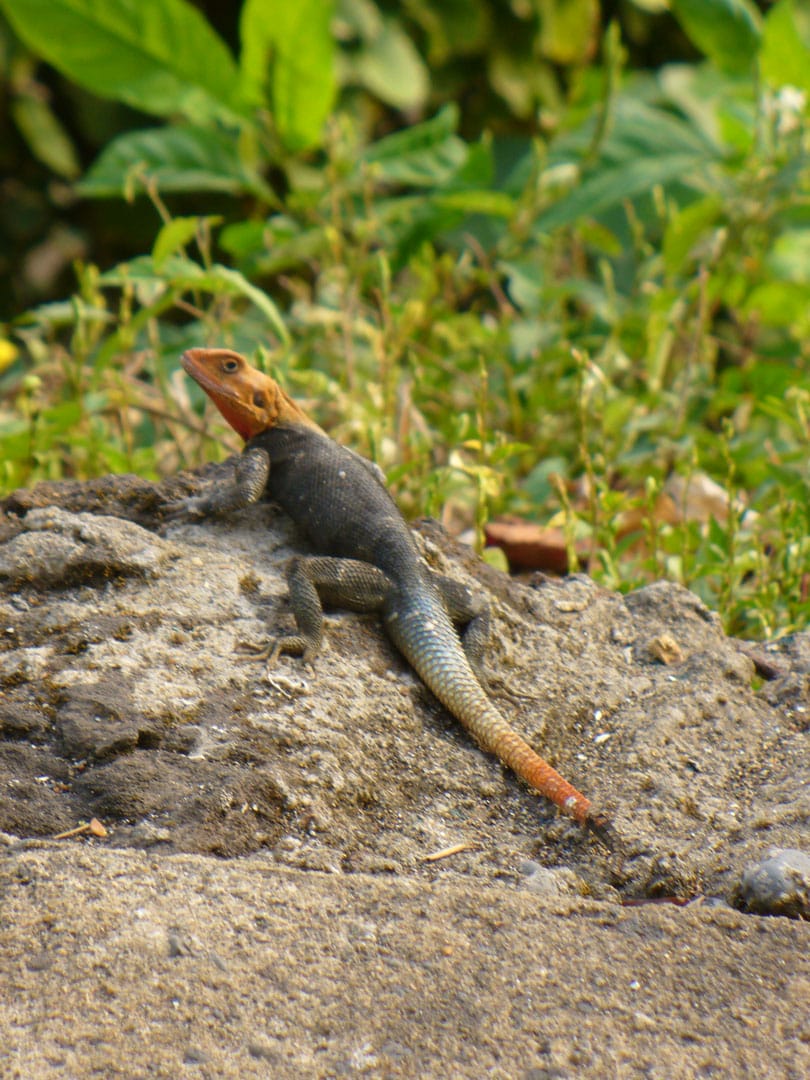
Douala, Cameroon : January 22, 2007
Chillin’
Rob went to work and I spent my day catching up on my own work, and catching up this journal. Only two things happened. A lot of kids came over from the American School to practice swimming. They came in two or three shifts. It was so noisy here!
Then Rob took me to lunch at a swanky Chinese restaurant. The Chinese owner is a good friend of Rob’s. She ran up and kissed him – not those fancy French cheek kisses – but smack on the lips. He’s sure she’s not just after a visa, she’s been to the USA before. She told me she was not very impressed by Texas.
Here are somephotos of this big house, and the neighborhood. Best neighborhood in Douala. Foreign service officers are provided free housing. The more difficult the country is to live in (and difficult to draw officials) the better the housing.
Here are many more photos that I took up to this point. You can click on the first photo to enlage it and then jump from one large photo to the next.
